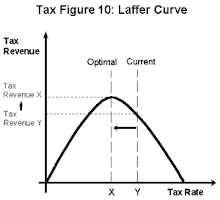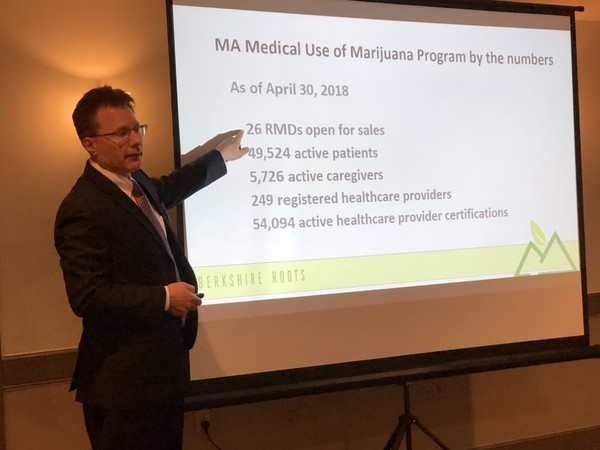By Robert Schroeder, Fiscal Policy Reporter, Market Watch, June 1, 2016
President Barack Obama called Wednesday for expanding Social Security benefits, a turnaround for a commander-in-chief who once offered to reduce increases for the entitlement program.
“It’s time we finally made Social Security more generous and increased its benefits so today’s retirees and future generations get the dignified retirement that they have earned,” Obama said in Elkhart, Ind.
He said the wealthiest Americans could pay “a little bit more” to start paying for increased benefits.
Obama’s speech was a lengthy repudiation of presumptive Republican nominee Donald Trump’s economic ideas. Though Obama did not mention Trump by name, he criticized the real-estate mogul’s tax plans, stance on free trade and immigration policy.
In endorsing expanded Social Security benefits, Obama took a position supported by both Hillary Clinton and Bernie Sanders, who are challenging each other for the Democratic presidential nomination. Clinton appears almost certain to wrap the nomination up next week, when voters in California and other states go to the polls.
Obama has in the past promoted the so-called chained consumer price index, a way of reducing benefit increases. The proposal was controversial and meant to bring Republicans to the negotiating table. But his proposed 2015 budget dropped chained CPI.
Progressives who disliked the chained CPI idea were cheering Wednesday.
-----

The White House announced on February 20, 2014 that President Barack Obama will not be including the Chained CPI in his annual budget for fiscal year 2015.
"Obama Drops Social Security Cuts From His Budget"
By George Zornick, The Nation, February 20, 2014
The White House budget for fiscal year 2015 will not include cuts to Social Security in the form of a Chained-CPI formula to calculate inflation, the Associated Press reported on Thursday. The proposal was included in last year’s White House budget, and Obama has repeatedly offered it in negotiations with the GOP dating back to the 2010 debt ceiling standoff.
The administration was under increasing pressure from liberals inside and outside Congress not to include Chained-CPI in the budget. On February 14, sixteen senators (fifteen Democrats and independent Bernie Sanders) sent Obama a letter asking him not to propose Social Security cuts. On Wednesday, 117 Democrats in the House—more than half the caucus—sent the White House a similar letter. Several progressive groups were also lobbying the White House and rallying members.
The progressive complaints were threefold. One was a simple policy beef. Obama’s proposal from last year would take $9,521 in cumulative benefits from an average 85-year-old on Social Security, even with protections including a small benefit bump at age 75 and protections for the very poor retirees.
After seeing food stamps slashed by $8.5 billion in the recent farm bill and the expiration of long-term unemployment benefits, progressives couldn’t accept that. “These are tough times for our country. With the middle class struggling and more people living in poverty than ever before, we urge you not to propose cuts in your budget to Social Security, Medicare and Medicaid benefits—cuts which would make life even more difficult for some of the most vulnerable people in America,” the letter from Senate Democrats said.
Secondly, many Democrats worried about the political fallout from a Democratic president proposing Chained-CPI in an election year. Even though most GOP members support the change, the head of the National Republican Campaign Committee attacked Democrats last year for wanting to cut Social Security after Obama’s budget was released. This year there was a “significant outcry” from Democrats locked in tight races over the potential proposal.
Finally, liberals also worried that repeated inclusion of Chained-CPI in Obama’s budgets would mainstream the idea and make eventual Social Security cuts inevitable.
On that count, liberals may not have as much reason to celebrate. The White House official who leaked the news to the AP also noted that Chained-CPI would remain on the table if the GOP wanted to engage in new budget talks or another “grand bargain.”
In other words, this wasn’t a substantive move away from austerity by the White House, but rather an assessment of the bargaining atmosphere on Capitol Hill.
Liberals plan to keep pushing forward on that larger battle—and want Obama to actually expand Social Security. “The Social Security COLA already doesn’t reflect the real costs seniors face, and cutting it makes no sense,” said Senator Jeff Merkley in a statement. “Middle-class Americans need retirement security they can depend on, and that starts with keeping Social Security’s promises.”
“This is a huge progressive victory—and greatly increases Democratic chances of taking back the House and keeping the Senate,” said Stephanie Taylor of the Progressive Campaign Change Committee. “Now, the White House should join Elizabeth Warren and others in pushing to expand Social Security benefits to keep up with the rising cost of living.”
----------
"Medicare cost shifting: The next big worry for seniors"
By Mark Miller, Opinion column, Reuters, February 25, 2014
CHICAGO - Seniors can breathe a little easier now that Social Security benefit cuts are no longer part of this year's federal budget debate. But the other shoe hasn't dropped in Washington. That would be Medicare cost shifting.
Last week, President Barack Obama's administration ditched one of its worst retirement policy ideas, the "chained CPI" for Social Security cost-of-living adjustments (COLAs). But we still don't know if the president or lawmakers will renew efforts to shift a higher share of Medicare costs to seniors as part of budget talks this year.
Healthcare costs already eat up a sizable part of Social Security benefits for many seniors, so if Medicare out-of-pocket costs jump while COLA formulas hold steady, seniors will be taking one step forward and two steps back.
The chained CPI is a way of determining annual Social Security COLAs. It's different from the current yardstick, the Consumer Price Index for Urban Wage Earners and Clerical Workers (CPI-W), which measures the cost of a general market basket of goods and services. The "chained" index takes into account changes in consumer buying behavior when prices rise - namely, that they buy cheaper goods.
The president proposed adopting the chained CPI in last year's budget plan as a bargaining chip for deficit reduction negotiations with Republicans. Last week word leaked out that he's dropping the idea, probably because there's no chance for a big deficit deal.
It's the right decision for the wrong reason. Although proponents call it a "trim" to Social Security benefits, the chained CPI would have been far more consequential over time for many seniors.
A chained CPI would reduce COLAs by three-tenths of a percentage point annually, according to the Social Security Administration. That sounds small, but the chained CPI snowballs over time because of compounding, and has its biggest impact on the very old: After 10 years, it's a cut of 3 percent, 6 percent after 20 years, and 9 percent after 30 years.
One-third of today's seniors rely on Social Security for 90 percent or more of their income, according to the National Academy of Social Insurance. Two-thirds count on it for more than half of their income. For these folks, a chained CPI would mean substituting cheaper food or skipping meals, turning down the heat or cutting pills in half.
MEDICARE PROPOSALS
Meanwhile, advocates for seniors are waiting to learn if the Administration - or Republicans in Congress - will again serve up proposals from last year's budget that would shift a greater share of Medicare costs to beneficiaries, including:
- Higher deductibles: The Part B annual deductible, currently $147, would be boosted for new enrollees in three $25 increments, for a total of $75 by 2021.
- Higher home health charges: New beneficiaries would pay $100 for five or more home health visits that weren't preceded by a hospital stay or nursing home.
- Medigap surcharge. New beneficiaries who buy supplemental Medigap policies with first-dollar coverage would face a surcharge equal to 15 percent of the average Medigap premium.
- More high-income surcharges. Wealthier seniors already pay substantially more for Part B and Part D premiums. Last year, President Obama proposed expanding these surcharges, and the idea likely will turn up again in this year's budget, according to advocates with sources close to the White House.
Currently, individuals with income of $85,000 and above ($170,000 for joint filers) pay a higher share of the total premiums. The president's plan would boost some of those fees, and gradually pull in seniors with lower incomes. Research by the Kaiser Family Foundation indicates individuals with incomes of $47,000 and higher ($94,000 for joint filers) would be affected.
The idea behind these cost-shifting measures is "more skin in the game" - the notion that asking patients to pay more will make them savvier consumers more likely to cut out wasteful use of healthcare services. Joe Baker, president of the Medicare Rights Center, a non-profit consumer advocacy group, says it's a dubious proposition.
"Seniors certainly will forgo care, but the problem is they won't know if they are forgoing something that is needed or unnecessary ... so more of them ultimately wind up in the doctor's office with serious problems. And once you're in the system, you simply do what the doctor tells you to do."
At any rate, seniors already have plenty of skin in the game. Thirty-seven percent of the average Social Security check went for healthcare in 2010, up from 21 percent in 1992, according to a recent analysis of Medicare records by Social Security Works, an advocacy coalition.
Widening the lens a bit, healthcare consumed 15 percent of total of Medicare households' budgets in 2010, three times the portion in younger households, according to the Kaiser Family Foundation. Kaiser reports that the biggest healthcare bite occurs at the oldest age. For Medicare beneficiaries over age 80, it is 18 percent of total household income, compared with 12 percent for 65- to 69-year-olds.
The bite will be deeper in the years ahead if the cost of healthcare jumps. National health expenditures have flattened out over the last few years, and that has been reflected in Medicare. The monthly Part B premium, for example, held steady this year at $104.90, and it's actually down from its peak of $115.40 in 2010. But healthcare experts aren't ready to declare a long-term victory in the battle to contain healthcare costs.
That's where Medicare reform efforts should be focused - not on getting a higher share of revenue from seniors' pockets.
----------

The president's 2014 budget proposal includes the expected Chained-CPI cut. (AP Photo/Manuel Balce Ceneta).
"9 'Chained CPI' Facts They Don't Want You to Know"
By Richard (RJ) Eskow - huffingtonpost.com/rj-eskow - April 11, 2013
The "chained CPI" proposal in President Obama's budget continues to draw much-deserved fire, which is only likely to increase as more information about it becomes known.
Here are nine embarrassing facts about the chained CPI which the White House and its defenders would prefer to see overlooked:
1. Of course it's a benefit cut.
Chained-CPI defenders say it's not a benefit cut. It's just a slowdown in the rate of the benefit's planned increases. That's a silly semantic game unworthy of serious leaders or analysts. The Social Security benefit, as laid out on the Social Security Administration's website, includes adjustments designed to keep pace with the rising cost of living.
Those adjustments aren't a benefit increase. They're designed to prevent the benefit from being decreased as a result of inflation. If you lower that adjustment, you're cutting benefits. Period.

2. Of course it's a tax hike.
Same goes for the tax impact of the chained CPI. Our tax brackets were designed to make sure that taxes didn't go up inadvertently because inflation kicked them into a higher tax bracket. That was done to make sure that people who weren't earning more in real dollars - which includes many (if not most) of the "99 percent" - weren't hit with an unearned tax hike.
If you substitute the chained CPI for the current formula, as the president has proposed, people will be kicked into higher tax brackets earlier. Then they'll pay more in taxes, even if they're not making any more "real" money.
That's a tax hike.
3. And it's a tax hike for everybody but the wealthy.
In fact, it's a tax hike on all but the highest levels of income. The richest earnings won't be affected because they're already in the highest tax bracket.
Got it? So it's a tax hike on everybody except the richest among us. (Actually, it's a tax hike for them too, but only on their lower levels of income. The richer you are, the less you'll see in a tax-rate increase.)
4. You could save much more money in other, better ways.
The White House has said the chained CPI will save $122 billion in benefits over ten years. Leaving aside the fact that Social Security doesn't affect the deficit (which we'll discuss shortly), here's what isn't being done:
Close capital gains loopholes: $174 billion.
* End the Bush tax cuts at Obama's original $250,000 level, rather than the compromise $400,000 number: $183 billion.
* Cut overseas military bases by 20 percent: $200 billion.
* Negotiate with drug companies: $220 billion.
* Enact "Defense-friendly" Pentagon cuts: $519 billion.
* End corporate tax loopholes (without being "revenue neutral," as the President's proposing): $1.24 trillion.
* Enact a financial transaction tax on the folks who ruined our economy: $1.8 trillion.
Faced with those numbers, the chained-CPI benefit cut is... well, embarrassing. (Details, and additional alternate deficit reducers, here: http://blog.ourfuture.org/20121218/nine-chained-cpi-alternatives-that-are-more-ethical-and-save-more-money).
5. The White House's proposed "bump" disproves its own argument.
The administration's been claiming that the chained CPI is merely a "technical adjustment" designed to make cost-of-living increases more accurate. But it's just introduced an adjustment for seniors who live longer in order to offset the impact of its reduction over time.
But if the chained CPI really measured inflation more accurately, it wouldn't affect real benefits any more after 20 or 30 years than it did after the first year. Confusing? We explain here. (With pictures and everything.)

Bottom line? They know it's a benefit cut.
6. It's political suicide for Democrats.
The polls are clear on that question. Voters over 50 hate the chained CPI. It doesn't matter whether they're Democrats, Republicans, or independents. They hate it.
And older Americans are more likely to vote than other voters (who also hate it, according to earlier polls.)
It took the Republicans all of 15 minutes to portray this move, which they've supported for a long time, as a "shocking attack on seniors." They're ready to run a reply of their successful 2010 strategy, when they ran to the left of Dems with a "Seniors' Bill of Rights" -- and recaptured the House.
7. The Social Security cut doesn't reduce the deficit.
Social Security doesn't contribute to the deficit, since it's funded separately. In fact, it's forbidden by law from contributing to the deficit.
It doesn't even belong in these negotiations.
8. That tax hike on everybody except the wealthy will help a little. But ...
On the other hand, they'll be hitting everybody except millionaires and billionaires with tax increases that grow with every passing year.
If regressive taxation is something you believe in, then I guess that's something. Except for our last embarrassing fact ...
9. The deficit's already shrinking rapidly.
The deficit is already shrinking -- and "rapidly," in the words of those radical lefties at Goldman Sachs.
The deficit isn't our most urgent economic problem. It's not even close. We desperately need jobs, real wage growth, consumer confidence, financial security for the elderly and disabled (which means increasing Social Security) ...
Sure, deficits need to be addressed after the economy's been righted, but right now they're nowhere near the top of the list.
In fact, there's an extremely good chance that the cuts in the president's budget will make the deficit worse, as austerity cuts have in Europe. The Republican budget would certainly have that effect, since its cuts are far more severe.
The bottom line? The chained CPI is the wrong answer to the wrong problem at the wrong time. It's time for the White House to recognize that and move on. In the meantime Democrats need to walk away from it fast, before they pay a high price for it at the polls.
----------

-

-

-
Source: "The Nation": "Top 5 Myths About Chained-CPI, Debunked" By George Zornick on April 11, 2013.
-
----------

Obama lied!
In a Sept. 6, 2008, speech to AARP, Obama said: ‘‘John McCain’s campaign has suggested that the best answer for the growing pressures on Social Security might be to cut cost-of-living adjustments or raise the retirement age. Let me be clear: I will not do either.’’
Source: "Obama seeks deal, proposes cuts to Social Security" By JIM KUHNHENN and ANDREW TAYLOR, Associated Press, April 5, 2013.
video: www.huffingtonpost.com/2013/04/11/obama-chained-cpi_n_3063841.html
----------
"Critics Revive Past Promises to Knock Obama Budget"
STEPHEN OHLEMACHER | Associated Press, April 12, 2013
WASHINGTON (AP) – Advocates for seniors say President Barack Obama is breaking his promise to protect Social Security, while conservatives say he is breaking his promise not to raise taxes on the middle class.
Obama's budget proposal includes a mix of tax increases and benefit cuts in an effort to reduce government borrowing and spark the still-fragile economy. Obama says it is the kind of balanced approach that is necessary to tame runaway budget deficits.
But advocates from across the political spectrum are reminding the president of his past campaign promises.
"Clearly it will be up to members of Congress to set fiscal priorities that actually represent the needs of the average citizens they were elected to represent," said Max Richtman, head of the National Committee to Preserve Social Security and Medicare. "The president's budget is not the balanced plan promised to Americans before November's election."
Obama's budget blueprint would increase taxes by $1 trillion over the next decade. Most of the tax increases would target wealthy households and corporations, though some, including a tax increase on cigarettes, would hit low- and middle-income families, too.
At the same time, Obama's plan would trim benefit programs like Social Security and Medicare while adding new spending on infrastructure and early childhood education.
The most sweeping proposal is to adopt a new measure of inflation for the government, which would gradually reduce benefits and raise taxes at the same time.
Called the chained Consumer Price Index, the new measure would show a lower level of inflation than the more widely used Consumer Price Index. The change could have far-reaching effects because so many programs are adjusted each year based on year-to-year changes in consumer prices.
Starting in 2015, Social Security recipients, military retirees and civilian federal retirees would get smaller benefit increases each year. Taxes would gradually go up because of smaller annual adjustments to income tax brackets, the standard deduction and the personal exemption amount.
Most of the savings would come from Social Security. On average, the new measure would reduce annual cost-of-living adjustments, or COLAs, by 0.3 percentage points. This year, the COLA was 1.7 percent. Under the new measure, it would have been about 1.4 percent.
Obama rarely mentioned Social Security during his re-election campaign in 2012. But four years earlier, he was more forthcoming, and some liberal groups have been circulating the video evidence.
[OBAMA LIED!]
In a 2008 speech to AARP, Obama laid down this marker: "John McCain's campaign has suggested that the best answer for the growing pressures on Social Security might be to cut cost-of-living adjustments or raise the retirement age. Let me be clear: I will not do either."
On Wednesday, Obama said he was compromising.
"I don't believe that all these ideas are optimal, but I'm willing to accept them as part of a compromise if and only if they contain protections for the most vulnerable Americans," Obama said.
Some programs, including anti-poverty programs like food stamps and Supplemental Security Income, would be exempt from the new inflation measure. College Pell grants would also be exempt, as would benefit levels in the president's new health care law.
There would also be provisions to reduce the impact on older Social Security recipients and those who receive Social Security disability benefits for at least 15 years.
In all, the new measure would reduce scheduled benefits by $130 billion over the next decade, according to administration estimates. It would raise taxes by $100 billion.
Low-income taxpayers would see the biggest tax increases because much of their income is not currently subject to the federal income tax.
Some Democrats in Congress say they won't support the new inflation measure.
"Cutting earned Medicare and Social Security benefits to pay for deficits primarily caused by the Bush tax breaks, two unfunded wars and an economic recession is not the answer to our nation's problems," said Rep. Xavier Becerra of California, a senior Democrat on the House Ways and Means Committee.
Republicans note that Obama has repeatedly promised to spare low- and middle-income families from tax increases. They also note that this isn't the first time Obama supported raising taxes on cigarettes.
In 2009, Obama signed a law that increased the federal cigarette tax by 62 cents, to $1.01 a pack. The money is being used to pay for the expansion of a health insurance program for children.
Obama's budget proposal would increase the federal tax on cigarettes from $1.01 a pack to $1.95. The new cigarette tax would raise an estimated $78 billion over the next decade to pay for preschool programs for children.
The cigarette tax is popular among health care advocates who believe it provides the additional benefit of encouraging smokers to cut back or quit.
"Raising the price of tobacco products is one of the most effective approaches to encouraging people to quit and preventing kids from picking up the deadly habit in the first place," said Christopher Hansen, president of the American Cancer Society's Cancer Action Network.
The tobacco industry promptly criticized the proposal.
"We think it is blatantly unfair to single out adult tobacco consumers with another federal tobacco tax increase to pay for a broad, new government spending program claimed to have benefits for everyone," David Sutton, a spokesman for Altria Group Inc., owner of the nation's biggest cigarette maker, Philip Morris USA, said in a statement. "Moreover, excise taxes are regressive, disproportionately burdening middle- and lower-income consumers – the very same consumers who have already endured five years of a stagnant economy and high unemployment."
The biggest tax increase in Obama's budget would limit the value of itemized deductions for wealthy families. The limits would apply to all itemized deductions, including those for mortgage interest, charitable contributions and state and local taxes. They would also apply to tax-exempt interest, employer-sponsored health insurance and income exclusions for employee retirement contributions.
The proposal would raise $529 billion over the next decade.
Charitable groups have already mounted a lobbying campaign to oppose the limits because they are worried they would discourage wealthy people from donating. Obama has made similar proposals in previous budgets and received lukewarm responses from fellow Democrats. Most Republicans oppose them.
----------

Letter to the Editor of the New York Times
Re “Misguided Social Security ‘Reform’ ” (editorial, Jan. 13):
I share your concern that President Obama has been too eager to go along with Congressional Republicans to reduce Social Security benefits by lowering cost-of-living adjustments for millions of retirees, widows and orphans. The consequences of shifting to a “chained” Consumer Price Index would be even worse than you described.
The chained C.P.I. would take benefits away from more than three million disabled veterans and their families. A veteran who began receiving V.A. disability benefits at 30 would have benefits reduced by $1,425 at 45 and by $3,231 at 65, according to the Congressional Budget Office.
The chained C.P.I. would also result in across-the-board tax increases with a disproportionate effect on working families. According to the Joint Committee on Taxation, switching to a chained C.P.I. would increase taxes by $59.6 billion over the next decade. More than three-quarters of the new revenue raised by the year 2021 would come from Americans making less than $200,000 a year.
Those making between $30,000 and $40,000 would be hit the hardest, while those making more than $1 million would see virtually no change.
At a time when corporations are enjoying record profits and the gap between the very rich and everyone else is growing wider, there are better ways to reduce the deficit than cutting programs for the elderly, veterans and the sick.
BERNARD SANDERS
Burlington, Vt., Jan. 14, 2013

----------

Who supports Obama's Chained CPI proposal?
* House Speaker John Boehner (R-Ohio).
* House Majority Leader Eric Cantor (R-Virginia).
* House Budget Chairman Paul Ryan (R-Wisconsin).
* House Representative Peter King (R-N.Y.).
* House Representative Darryl Issa (R-California).
* House Representative Sam Johnson (R-Texas). He chairs the Social Security panel (or subcommittee) of the House Ways and Means Committee.
* House Representative Tim Griffin (R-Arkansas).
* House Representative Reid Ribble (R-Wisconsin).
* House Representative Jim Bridenstine (R-Oklahoma).
* House Representative Doug Lamborn (R-Colorado).
* Senate Minority Leader Mitch McConnell (R-Kentucky).
* Senator John Cornyn (R-Texas).
* Senator Rob Portman (R-Ohio).
Dissenting Republicans:
* House Representative Greg Walden (R-Oregon). He is the National Republican Congressional Committee chairman. He accused Obama of “trying to balance this budget on the backs of seniors”. He said, “I thought it’s very intriguing in that [Obama's] budget really lays out kind of a shocking attack on seniors.” He said that Obama’s plan hurts seniors more than Republican proposals for entitlement reforms.
* Rep. Chris Collins (R-N.Y.) accused the president of cutting spending “on the backs of our seniors.”
Advocates for Obama's Chained CPI proposal:

* Fix the Debt -- a campaign led by former members of Congress, current city mayors, businessmen, and lobbyists. The group praised Obama's inclusion of chained CPI in his budget. The group has bipartisan leadership but is supported by a council of CEOs that mostly support Republican candidates.
* The Club for Growth. President Chris Chocola.
* Robert Greenstein, executive director of the liberal Center for Budget and Policy Priorities.
* The co-chairs of the president’s deficit commission, former Wyoming Sen. Allen Simpson and former Clinton chief of staff Erskine Bowles.
* Marc Goldwein, the Committee for a Responsible Federal Budget, a group that operates with money from the Peter G. Peterson Foundation, which is a long-time critic of Social Security.
Who opposes Obama's Chained CPI proposal?
* House Representative Jan Schakowsky (D-Ill.).
* House Representative Edward Markey (D-Massachusetts).
* House Representative Stephen Lynch (D-Massachusetts).
* House Representative James McGovern (D-Massachusetts).
* House Representative John Tierney (D-Massachusetts).
* House Representative Alan Grayson (D-Florida).
* House Representative Mark Takano (D-California).
* House Representative Chellie Pingree (D-Maine).
* House Representative Raul Grijalva, Co-Chairman of the Congressional Progressive Caucus, (D-Arizona).
* House Representative Keith Ellison, Co-Chairman of the Congressional Progressive Caucus, (D-Minnesota).
* House Representative Barbara Lee (D-California). She is a former Black Caucus and Progressive Caucus co-chair.
* House Representative John Garamendi (D-CA).
* House Representative Xavier Becerra (D-CA). He is Chair of the House Democratic Caucus.
* House Representative Mark Pocan (D-Wisconsin).
* House Representative John Conyers (D-Michigan).
* House Representative Donna Edwards (D-Maryland).
* House Representative Jerrold Nadler (D-N.Y.).
* House Representative Chris Van Hollen (D-Md.). He is the ranking member of the House Budget Committee.
* House Representative Jared Huffman (D-California).
* House Representative Louise Slaughter (D-N.Y.).
* House Representative Ted Deutch (D-Florida).
* House Representative Bill Pascrell (D-N.J.).
* House Representative Minority Whip Steny Hoyer (D-Md.).
* House Representative Dan Maffei (D-N.Y.).
* House Representative Rick Nolan (D-Minnesota).
* House Representative Jim Langevin (D-R.I.).
* House Representative David Cicilline (D-R.I.).
* House Representative Maxine Waters (D-CA).
* House Representative Marcy Kaptur (D-OH).
* House Representative Luis Gutierrez (D-IL).
* House Representative Nydia Velazquez (D-NY).
* House Representative Jose Serrano (D-NY).
* House Representative Grace Napolitano (D-CA).
* House Representative Alcee Hastings (D-FL).
* House Representative Corrine Brown (D-FL).
* House Representative Matt Cartwright (D-PA).
* House Representative Peter DeFazio (D-OR).
* House Representative Gene Green (D-TX).
* House Representative Danny Davis (D-IL).
* House Representative Kathy Castor (D-FL).
* House Representative Carolyn Maloney (D-NY).
* House Representative William Lacy Clay (D-MO).
* House Representative Mike Honda (D-CA).
* House Representative Emanuel Cleaver (D-MO).
* House Representative Marcia Fudge (D-OH).
* House Representative Joyce Beatty (D-OH).
* House Representative Elijah Cummings (D-MD).
* House Representative Ann Kirkpatrick (D-AZ).
* House Representative Sheila Jackson Lee (D-TX).
* House Representative Eni Faleomavaega (D-American Samoa).
* House Representative Donna Christensen (D - Virgin Islands).
* House Representative Carol Shea-Porter (NH-01).
* House Representative Ann McLane Kuster (NH-02).
* House Representative Ami Bera (D-CA).
* House Representative Joseph Crowley (D-N.Y.).
* House Representative Lloyd Doggett (D-Texas).
* House Representative Linda Sanchez (D-California).
* House Representative Allyson Schwartz (D-Pa.)
* House Representative Katherine Clark (D-Massachusetts).
* Senate Majority Leader Harry Reid (D-Nevada).
* Senate Budget Committee Chairwoman Patty Murray (D-Washington).
* Senator Sheldon Whitehouse (D-R.I.).
* Senator Jack Reed (D-R.I.).
* Senator Elizabeth Warren (D-Massachusetts).
* Senator Bernie Sanders (Vermont independent).
* Senator Tom Harkin (D-Iowa).
* Senator Mark Begich (D-Alaska).
* Senator Max Baucus (D-Montana).
* Senator Jeff Merkley (D-Oregon).
* Senator Al Franken (D-Minnesota).
* Senator Mazie Hirono (D-Hawaii).
* Senator Sherrod Brown (D-Ohio).
* Senator Bill Nelson (D-Florida).
Advocates for Social Security:
* Nancy Altman, the founding co-director of the advocacy group Social Security Works.
* Eric Kingson, co-chair of the Strengthen Social Security Coalition. strengthensocialsecurity.org
* Becky Bond, political director of CREDO.
* Justin Ruben & Anna Galland, MoveOn.org executive directors.
* Stephanie Taylor & Adam Green, the co-founders of the Progressive Change Campaign Committee.
* AARP. Cristina Martin Firvida, Director of Financial Security. President Nancy LeaMond.
* The National Committee to Preserve Social Security and Medicare. Max Richtman.
* The National Organization for Women. NOW President Terry O'Neill.
* Jim Dean, Democracy for America. Arshad Hasan, Executive Director.
* The Campaign for America’s Future.
* President Richard Trumka, AFL-CIO. Also, Damon Silvers.
* Veterans' groups: Veterans of Foreign Wars, Iraq and Afghanistan Veterans of America, AMVETS, and the Blinded Veterans Association.
* NARFE president Joseph A. Beaudoin. NARFE stands for "National Active and Retired Federal Employees Association". www.narfe.org Julie Tagen, Legislative Director.
* The American Federation of Government Employees (AFGE). National President J. David Cox Sr.

Notes:
* The CPI, or cost of living index, is used to make sure benefits keep pace with inflation. The current measure is called the CPI-W: “Consumer Price Index for Urban Wage Earners and Clerical Workers”.
* The chained CPI (“Chained Consumer Price Index for All Urban Consumers”) would cut about $6,000 worth of benefits in the first 15 years of retirement for the average 65-year-old, and $16,000 over 25 years. The chained Consumer Price Index scheme would restructure cost-of-living adjustments in a way that cuts Social Security benefits for millions of seniors and veterans.
* To protect the very old, the White House (Obama) proposes two bumps in benefits, one starting at age 76 and the other at age 95.

* www.ssa.gov/cola/automatic-cola.htm
* www.narfe.org/legislation/calculator.cfm
* https://act.aarp.org/CCPI/index-landing.html?cmp=RDRCT-WHULS_MAR12_013
* http://www.socialsecurityworks.org/wp-content/uploads/2013/12/The-Chained-CPI-is-a-Benefit-Cut-Affecting-Everyone.pdf
* The Bureau of Labor Statistics developed the measure (Chained CPI) after a commission led by Stanford University economist Michael Boskin concluded in 1996 that standard measures overstated inflation, in part because they did not account for the tendency to make substitutions between purchasing categories when prices rise.
* If you chain the CPI, Social Security, which is supposed to have adequate benefits to pay full guaranteed benefits until 2033, would last 2 years longer.
* Also on the table in Obama's budget proposal are higher Medicare premiums and reduced benefits for better-off seniors, and a higher Medicare eligibility age.
* Half of all Medicare beneficiaries live on $22,000 or less and spend one-third of their household income on healthcare.
* About a third of the elderly rely on Social Security for 90 percent or more of their income; two-thirds count on it to supply at least half of their income. The program lifts 13 million elderly beneficiaries above poverty. Without Social Security, 55 percent of the disabled -- and a million children -- would live in poverty. The program is particularly important to women and minorities. It provides 90 percent or more of the incomes of almost half of all unmarried women age 65 and older (including those who are widowed, are divorced or never married), and it is the sole source of income for 40 percent of elderly African Americans and Hispanic Americans.
* Government data show that investment earnings accounted for nearly 10 percent of income for Americans 65 and older when the recession began. In 2011, the most recent full year available, they made up just 6 percent of seniors’ income. Instead, seniors have become more reliant on Social Security, pensions and public assistance.
* The Social Security panel of the House Ways and Means Committee has scheduled a first public hearing for Obama’s chained-CPI proposal on Thursday, April 18, 2013. The health subcommittee will follow with hearings on proposals to restrain the cost of Medicare.

* A White House proposal to cut benefits for Social Security recipients and disabled veterans was scrutinized at a Senate Budget Committee hearing on Tuesday, April 16, 2013. (Source: Bernie Sanders. Treasury Secretary Jacob Lew testified Tuesday (4/16/2013) before the Senate Budget Committee on President Obama’s proposal to cut Social Security and reduce benefits for disabled veterans. Sanders asked about the White House proposal to tie annual cost-of-living adjustments to a different measure of inflation, a so-called chained consumer price index, to achieve $130 billion in savings by taking benefits away from seniors and veterans.)
----------
"How Obama's Plan For Chained CPI Is Both A Stealth Tax On The Middle Class And A Cut In Benefits For Grandma"
By Walter Hickey - AP - Business Insiner - April 9, 2013

Last week it was revealed that the President's budget proposal will include a revision to the way the government calculates the impact of the rate of inflation as a concession to House Republicans.
Still, a switch to chained CPI from the current rate demonstrably cuts benefits to seniors and could be a stealth tax on primarily the middle class.
The Consumer Price Index (CPI) is used as a proxy for the annual cost of living adjustment used to keep federal benefits in line with inflation.
There are several different ways that economists calculate the Consumer Price Index, according to the AARP Public Policy Institute.
* CPI-W is the current cost of living adjustment index for Social Security. It reflects the spending habits of households where the income comes from a wage earner.
* CPI-U expands CPI-W to reflect the spending habits of the retired, professionals, the unemployed and self-employed as well as wage earners.
* A new, experimental CPI-E looks exclusively at how the elderly spend their money.
"Chained CPI" refers to another adjustment, particularly to CPI-U.
As an example, CPI-U and CPI-W already incorporate people switching from Starbucks coffee to homemade when prices increase.
Chained CPI-U takes that a step further — the idea that when coffee gets more expensive, people switch to orange juice. It incorporates more switching.
When it comes down to it, Chained CPI-U spits out a lower rate of inflation than regular CPI-U, which already spits out a lower rate of inflation than the current CPI-W. As a result, were the government to switch the way they index cost of living adjustments to chained CPI-U from CPI-W, payouts to seniors would increase at a much slower rate.
This means that over time, seniors receiving Social Security see their benefits cut.
Here's a comparison of CPI-W, CPI-E, and chained CPI-U from the AARP Public Policy Institute. Keep in mind that, as an advocacy group, the AARP probably wants CPI-E to become the law of the land. You can see how much less the C-CPI-U (chained CPI, green line) will pay out over time.

Now, assuming chained CPI were the law of the land ten years ago, here's how much less money an elderly person making $878 per month in 2001 would make with C-CPI-U according to a Center for Economic and Policy Research study:

You'll see that the annual Social Security payment in 2012 under chained CPI would be the same as it was in real life in 2009.
According to the CEPR report:
Switching to the Chained CPI immediately would have a more significant impact on the retirement income of seniors than the ending the Bush-era tax cuts would have on the after-tax income of the wealthiest 2 percent of households. For the average worker retiring at age 65, this would mean a cut of about $650 each year by age 75 and a cut of roughly $1,130 each year at age 85.
Just a reminder: President Obama is the one proposing this.
Still, chained CPI could also hit the middle class. While Social Security is tied to CPI-W currently, the cost of living adjustment to tax brackets is indexed to CPI-U.
If the president's budget updates CPI-U to chained CPI-U, the thresholds for tax brackets would rise more slowly. This leads to incomes increasing faster than tax bracket thresholds do.
As a result, incomes would jump to higher tax brackets faster, CEPR reported, and the effective income tax rates would increase:
According to Congress’ Joint Committee on Taxation, if individual income taxes were indexed to the Chained CPI starting in January 2013, by 2021, 69 percent of the gains in revenue would come from taxpayers with incomes below $100,000, while those in the highest income brackets would barely be affected.
----------
"Seniors say they can't afford Social Security cuts due to chained CPI"
By Tami Luhby | CNNMoney.com – April 11, 2013
"I cannot afford to have my Social Security cut by one penny! Plain & simple."
That sentiment was echoed again and again in scores of e-mails sent to CNNMoney about President Obama's proposal to reduce cost of living adjustments for Social Security.
In his budget released Wednesday, the president proposed basing the way the annual increases are calculated on "chained CPI," which grows more slowly than the current inflation measure. That would mean that seniors would get smaller bumps in their Social Security payments each year.
Though the difference would be relatively small at first, it would grow into hundreds or even thousands of dollars over time. That can be quite a hit for many seniors -- nearly two-thirds of recipients rely on Social Security for at least 50% of their income. And Social Security makes up at least 90% of the income received by just over one-third of seniors.
Seniors wrote in that they depend on the entitlement checks to pay for housing, food and utilities. Some feared they'd have to go back to work in their 70s or 80s if their annual increases shrunk. Others said they'd reluctantly have to turn to public assistance or relatives for help.
Howard Lowett, 81, and his wife, Phyllis, live off the $2,000 they receive in Social Security every month. Though Lowett worked until six years ago, the couple has very little savings left after caring for a disabled son.
"Any reduction in benefits would be a disaster to us," said Lowett, who lives in Holtsville, N.Y. "It would chip away at our income little by little."
Nearly 40 million retirees and their dependents receive Social Security. The average monthly benefit is $1,262, but many writing into CNNMoney said they are living off far smaller checks.
Kerry Payne of Newburgh, N.Y., had to give up her car because she couldn't afford the rising cost of gas and insurance. Her $1,234 monthly check barely covers her expenses. Nearly all of her savings went to care for her husband, who died after a long illness. So she scrimps to get by, doing her grocery shopping on Wednesday evenings, for example, because her local supermarket offers a 10% discount then.
"We need those increases every year," said Payne, 67, of the cost of living adjustment. "Everything else goes up."
Seniors were also furious with Obama, saying he is reneging on his promise not to touch Social Security. More than a few suggested politicians in Washington should cut their salaries before slicing the benefits of the elderly.
"I doubt that one government official can begin to live on what the average senior citizen does," wrote one 77-year-old woman. "I hope that Pres. Obama truly understands the dire straits [OK?] that his plan could cause senior citizens."
----------

2 in 5 seniors have an annual income at or below $20,000 – and 80% of that income comes from Social Security.
"Using Chained CPI Risks a Senior Poverty Crisis"
By Michael Kling, moneynews.com - April 12, 2013
President Barack Obama’s proposals to cut Social Security by using the “stingier chained” Consumer Price Index (CPI) risks a senior poverty crisis, says a Kenneth Thomas, a political science professor at the University of Missouri-St. Louis.
In his budget proposal, Obama proposed using the chained CPI instead of the traditional CPI to calculate Social Security cost-of-living increases. Because the chained CPI computes a smaller inflation rate, it would produce smaller increases in the benefits for Social Security beneficiaries.
“This risks undoing all the progress made against senior poverty since the passage of Medicare and Medicaid in 1965,” Thomas writes in his blog, “Middle Class Political Economist.”
“If this cut really happens, Social Security benefits will steadily fall in true inflation-adjusted terms due to the magic of compounding,” he warns. “Moreover, with 49 percent of the work force having no retirement plan at work and another 31 percent with only a grossly inadequate 401(k), the cuts will worsen the coming retirement crisis. The only question will then be: how high will senior poverty have to go before we do something about it?”
In 1968, 25 percent of seniors were poor, compared with 9.4 percent in 2006, he notes. However, senior poverty is higher after medical care and other expenses that hit seniors particularly hard are counted.
The U.S. senior poverty rate, measured by the international standard of 50 percent of median income, is already 25 percent, Thomas says. That’s much higher than in most developed countries, more than three times Sweden’s rate and over four times as high as Canada’s.
Why did Obama propose cutting Social Security after Americans rejected a candidate who wanted to cut Social Security and Medicare? Perhaps, Thomas suggests, he is “chasing the fantasy of ‘being the adult in the room,’ but this is a losing proposition.”
By proposing to cut Social Security as a concession to Republicans, Obama automatically draws Republican opposition, Thomas says, pointing out that Rep. Greg Walden, R-Ore., chairman of the House GOP re-election committee, has blasted the proposal as “a shocking attack on seniors.”
Obama’s proposal is an example of him negotiating with himself, Thomas writes. “We have plenty of examples of the President negotiating with himself to bad effect, most notably in the 2011 debt ceiling battle.”
Robert Reich, Secretary of Labor under President Bill Clinton, agrees.
“The president’s predilection for negotiating with himself is not new,” states Reich on his blog. “But his willingness to do it with Social Security, the government’s most popular program — which Democrats have protected from Republican assaults for almost 80 years — doesn’t bode well.”
Obama’s negotiating attempt will ultimately fail due to Republican intransigence, he predicts. “They’ve been wanting to cut Social Security for years. But they won’t agree to close tax loopholes for the rich.”
----------
FALSE PROMISES!

"Joe Biden guarantees: 'There will be no changes in Social Security'"
By Michael O'Brien, NBC News, August 14, 2012
Vice President Joe Biden told cafe patrons in Virginia on Tuesday that he could "guarantee" he and President Obama would allow no changes to Social Security.
As a debate over reforming entitlements -- particularly Medicare -- takes center stage in the 2012 presidential campaign, Biden seemed to promise not to allow changes to the program.
"Hey, by the way, let's talk about Social Security," Biden said after a diner at The Coffee Break Cafe in Stuart, VA expressed his relief that the Obama campaign wasn't talking about changing the popular entitlement program.
"Number one, I guarantee you, flat guarantee you, there will be no changes in Social Security," Biden said, per a pool report. "I flat guarantee you."
The pool report noted that most of the patrons at the cafe toward whom Biden was directing his remarks were over the age of 60.
The vice president's language almost hearkens back to some 2011 tough talk by Senate Majority Leader Harry Reid (D-NV), who vowed not to take up changes to Social Security for another two decades, by which time he might not even be a senator anymore.
"Two decades from now, I'm willing to take a look at it, but I'm not willing to take a look at it right now," Reid said at the time in an interview on MSNBC. "It is not in crisis at this stage. Leave Social Security alone. We have a lot of other places we can look that is in crisis. But Social Security is not."
Mitt Romney has expressed an interest in gradually raising the retirement age, as well as means-testing benefits for the wealthy, but he otherwise hasn't specified his own Social Security proposals.


----------
"Appeasing the Serious People: Obama’s Raid on Social Security and Medicare"
By DEAN BAKER, counterpunch.org - April 17, 2013
President Obama’s efforts to appease Washington’s Serious People ran into serious obstacles last week. Responding to the cries of the Washington deficit hawks, President Obama proposed cutting Social Security by adopting a different measure of the rate of inflation for the annual cost-of-living adjustment (COLA).
This measure would gradually reduce the value of benefits through time. By age 75 retirees would see a benefit that is roughly 3 percent less than under current law. This is a much bigger hit to the income of the typical retiree than the tax increases at the end of last year were to the income of most of the wealthy people.
While cutting Social Security got the predictable applause from the Washington Post and other Washington establishment types, it prompted far more outrage among the president’s base than he had anticipated. As a result, Obama’s people were busy re-writing the plan at the time the budget was released, trying to ameliorate some of its worst effects.
However the basic objection remains. Why is a Democratic president trying to cut Social Security in response to a crisis created by a combination of Wall Street greed and Washington corruption and incompetence?
If we compare the most recent GDP projections from the Congressional Budget Office with the pre-crisis projections from 2007, the crisis will cost the country more than $17 trillion in lost output. This is more than $50,000 per person. And, rather than making the people responsible pay the cost, President Obama is now looking to cut the $1,250 monthly Social Security check that provides more than half of the income for the typical retiree.
The poster child for this brazen class war on the American people is Morgan Stanley director Erskine Bowles. Bowles profited big time in the bubble days, pocketed hundreds of thousands of dollars a year for his “work” as a director of Morgan Stanley. The bank played a huge role in inflating the bubble and then would have flamed into bankruptcy without a massive government bailout. The whole time the checks never stopped for Mr. Bowles.
Erskine Bowles also was pocketing hundreds of thousands of dollars from his “work” as a director of General Motors. His position there did come to an end when the company went into bankruptcy.
According to the New York Times, Bowles is now giving talks at $40,000 a piece (at three people’s annual Social Security benefits) on the need to cut Social Security and Medicare. Of course this is in addition to the hundreds of thousands of dollars that he still rakes in each year from sitting on the board of Morgan Stanley and other major corporations. You can’t make this stuff up.
The stench from President Obama’s attack on Social Security has led to a bipartisan revulsion with the ways of Washington. This is a great time to seize on the momentum.
As actually serious people have been pointing out, we should be looking to increase, not decrease Social Security. The other pillars of our retirement income system, pensions and individual savings, have collapsed. As a result, those approaching retirement are likely to be more even more dependent on Social Security than current retirees. If we want to ensure that people who have spent life working can enjoy something resembling a decent retirement, we will need to be expanding, not cutting benefits.
This does cost money, but we actually can afford it, in spite of the damage done by the Serious People to the economy. For a start we can raise the cap on wages subject to the Social Security tax, so that people earning over $113,000 pay the same tax rate as the rest of us.
If we can stop the upward redistribution of income, it would be reasonable to raise the payroll tax rate at some point in the future. The Social Security trustees project that average hourly compensation will grow by close to 50 percent over the next three decades. It hardly seems outrageous to take back one or two percentage points of this increase in higher taxes to support Social Security. The key issue will be ensuring that workers get their share of these gains rather than letting them all go to the Erskine Bowles of the world.
Toward this end we can impose a Wall Street speculation tax that will crack down the rapid flipping of stocks and other financial instruments. The Joint Tax Committee of Congress estimated that a tax of just 0.03 percent, as proposed by Senator Tom Harkin and Representative Peter DeFazio, could raise close to $400 billion over the course of a decade. This is more than three times as much as President Obama hoped to save by cutting Social Security.
Given where the country is today, proposals such as the Harkin-DeFazio bill should be occupying center stage. We should be debating how to keep the Wall Street parasites from being a continuing drain on the country’s productive economy. And we should be struggling to find ways to fill get the economy up to its potential and putting 9 million people back to work.
Those trying to derail this essential effort and to take away people’s Social Security deserve exactly the sort of derision they have been receiving. These Serious People should never again be taken seriously.
Dean Baker is the co-director of the Center for Economic and Policy Research (CEPR). He is the author of Plunder and Blunder: The Rise and Fall of the Bubble Economy and False Profits: Recoverying From the Bubble Economy.
This article originally appeared on Al Jazeera.
----------
"Hit to Social Security benefits of using chained CPI? Average of $30/month, says CBO"
By Robert Schroeder, Market Watch/Political Watch, April 18, 2013
If you’ve been wondering what using the so-called “chained CPI” would do to Social Security benefits, the Congressional Budget Office has an answer for you: they’d be about $30 a month lower, on average, by 2023.
That’s if the chained CPI proposal took effect next year, explained Jeffrey Kling, the CBO’s associate director for economic analysis, to a House Ways and Means subcommittee on Thursday.
For seniors, that’s a key number in Kling’s testimony, which concerns the controversial alternative measure of inflation proposed in President Barack Obama’s latest budget plan. Republican leaders have said that Obama’s proposals to shrink entitlement spending don’t go far enough – but that doesn’t mean that chained CPI won’t wind up being part of a budget deal later this year.
Obama included the chained CPI in his budget as an olive branch to Republicans, though he says it must be considered as part of a broader package.
Using the chained CPI would clearly produce savings, the CBO shows. If the inflation measure were applied to mandatory programs including federal employee pensions and Medicare – in addition to Social Security – the upshot would be $216 billion in savings between fiscal years 2014 and 2023, CBO says. Applying chained CPI to the tax code would bring in another $124 billion. That’s greater than the $230 billion Obama is seeking in his budget, which applies chained CPI less comprehensively.
----------
A House Ways and Means subcommittee on Wednesday (4/18/2013) held a hearing to examine the impacts of using “Chained CPI” to slow the growth in entitlement spending and increase tax revenue.
In testimony for Wednesday’s (4/18/2013) hearing, Nancy J. Altman, who co-chairs the Strengthen Social Security Coalition, described the new inflation measure as “a benefit cut masquerading as a technical adjustment,” suggesting that lawmakers are downplaying its potential impacts.
Federal-employee groups also oppose the new inflation measure. “A switch to the chained CPI is a reduction to the earned and promised retirement benefits of middle-class Americans,” said NARFE president Joseph A. Beaudoin. “Individuals who have worked their whole lives to earn their retirement benefits will receive less money in the future. That sounds like a real benefit cut to them, and it is.”
Opponents contend that Chained CPI doesn’t give adequate weight to the steep and steady rise in healthcare costs, which affect seniors disproportionately.
Source: "How would ‘Chained CPI’ affect your benefits?" By Josh Hicks, The Washington Post, April 18, 2013.
----------
"Ten Reasons Why the Chained CPI Is Terrible Policy"
By Daniel Marans, huffingtonpost.com - 12/27/2012
1. Chained CPI is a significant benefit cut that compounds over time, hitting late old-age beneficiaries and the long-time disabled hardest. For a worker with average earnings retiring at age 65 in 2015, chained CPI would cut benefits $653 a year (3.7 percent) at age 75, $1,139 a year (6.5 percent) at age 85 and $1,611 a year (9.2 percent) at age 95.
2. Chained CPI hits current beneficiaries. Even Paul Ryan tried to hold people ages 55 and older harmless from his plan to privatize Medicare (and Social Security before that). Seriously. Check out page 52 of his 2013 budget, and every speech he ever gave on the topic. The theory is, if you're gonna burn people, give them some time to adopt a Spartan lifestyle for several years so they can make up for the lost pension money in time for retirement.
3. Chained CPI cuts benefits for veterans. At least 771,000 veterans receive both Social Security and VA disability benefits. Under chained CPI, both would be cut. A fully disabled veteran claiming benefits at age 30 in 2012 would see a cut in VA benefits alone of $1,425 a year (4.3 percent) at age 45, $2,341 a year (7 percent) at age 55, and $3,231 a year (9.7 percent) at age 65.
4. Chained CPI cuts benefits for the indigent elderly and disabled on Supplemental Security Income (SSI). Do I need to add detail here? These are the poorest of the poor.
5. Chained CPI is less accurate for seniors and people with disabilities. Chained CPI assumes people can substitute cheaper products as prices go up, but this is not true of seniors and people with disabilities for whom health care makes up a larger share of expenses. In 2009, health care made up 12.9 percent of expenses for people 65 or older, but 5.3 percent of spending for people ages 25-64.
6. A more accurate CPI for Social Security is the CPI-E, not the chained CPI. The CPI-E, or experimental Consumer Price Index for the Elderly, weights health care and housing costs more heavily to simulate the basket of goods consumed by seniors. On average, it increased 0.2 percentage-points more annually than the current CPI.
7. Social Security benefits are already declining due to increases in the retirement age and Medicare premiums. After Medicare premiums, Social Security replaced 37 percent of the pre-retirement earnings of a typical worker retiring at 65 in 2010, and is projected to replace 32 percent of the same worker's earnings in 2030.
8. Social Security does not contribute to the deficit. Social Security is self-funded, it is off budget, and it cannot borrow to pay benefits. Therefore it cannot contribute to the deficit. Just take President Reagan's word for it. There is no good reason to include it in fiscal cliff negotiations. In fact, it has never been included in budget negotiations. The famous Reagan-O'Neill Social Security compromise of 1983? They did it through a Commission devoted solely to Social Security -- not the general budget deficit.
9. Giving away a benefit cut for no additional Social Security revenue is foolish. Yes, Chained CPI generates additional income tax revenue (albeit in a regressive way). But it gives Social Security no new revenue. Even Simpson-Bowles tried to do that.
10. "Birthday bump" and other sweeteners are inadequate. The chained CPI's apologists say they will hold the poor and people in late old age harmless through a "birthday bump" in the 20th year of benefits eligibility. As the graphs here and here show, however, this only offsets the benefit cut significantly if you live past 90, and even then doesn't make up for the chained CPI.
----------
"Meet CPI-E, the progressive alternative to chained CPI"
By Dylan Matthews, Washington Post, April 19, 2013
One frequent progressive response to proposals like the Obama administration’s to tie cost-of-living adjustments (COLAs) for Social Security to chained CPI, which rises less quickly and would make COLAs costless, is that he really ought to use CPI-E. That’s an alternate, experimental inflation measure developed by the Bureau of Labor Statistics to track consumption among the elderly. If CPI-E were in effect today, it would result in $56 more a year in payments to some who retired in 2001 to maximum benefits:

Today, the CBO took a closer look at the idea of adopting CPI-E. Analysts Noah Meyerson and David Brauer start by noting that CPI-E grew faster than either CPI-W (which is currently used to calculate COLAs) or CPI-U, the traditional inflation measure. That makes sense, as it weights health care more heavily than other inflation measures, and health costs have spiked of late. However, in recent years, it’s grown less quickly, as health cost increases have slowed:

So using CPI-E instead of CPI-W could actually reduce costs going forward.
That said, the authors are generally skeptical of the case for adopting an elderly-specific index. “It is unclear, however, whether the cost of living actually grows at a faster rate for the elderly than for younger people, despite the fact that changes in health-care prices play a disproportionate role in their cost of living,” Meyerson and Brauer write. “Determining the impact of rising health-care prices on the cost of someone’s standard of living is problematic because it is difficult to measure the prices that individuals actually pay and to accurately account for changes in the quality of health care.”
In any case, this is another indication that the progressive critique of chained CPI is catching on. If it weren’t, it’s doubtful CBO would have taken the time to analyze CPI-E, which has become the progressive alternative to the policy change.
----------
Retirement benefits over the years
Enactment of Social Security marked the start of a long period of improvement in the lives of the nation’s elderly. But that progress is in jeopardy as traditional pensions continue to disappear and many Americans fail to save enough for retirement. Meanwhile, federal policymakers are considering trimming old-age benefits to reduce the nation’s debt.
1935: Social Security is enacted.
1938: Pension trusts are made irrevocable and for the exclusive benefit of employees and beneficiaries.
1962: Qualified pension plans are made available for self-employed persons, unincorporated small businesses, farmers, professionals and their employees.
1965: Medicare and Medicaid are enacted.
1974: The Pension Benefit Guaranty Corp. is established, helping to protect benefits of participants in private pension plans. Individual retirement accounts are established for people not covered by pensions.
1978: 401(k)s are established.
1980: Funding requirements are strengthened for private multiemployer pension plans.
1981: IRAs are opened to everyone younger than 70½.
1983: Social Security retirement age is gradually increased.
1986: Faster minimum vesting schedules are established for private pension plans. 401(k) salary-reduction contributions are restricted and nondiscrimination rules are tightened. An excise tax on lump-sum distributions received before age 59½.
1996: A Non-working spouses are allowed to contribute up to $2,000 to an IRA.
1997: Roth IRAs are established.
2006: Rules governing how companies fund their pension plans are tightened, and automatic enrollment in 401(k) plans is encouraged.
2013: 401(k) contribution limits are raised to $17,500 ($23,000 if 50 or older).
----------
"Chained CPI: An economic, moral disaster"
By Sen. Bernie Sanders (I-Vt.) - thehill.com - 2/11/2013
How many candidates for Congress last year won on the following platform?
1. That Social Security cost-of-living adjustments are too generous. Social Security should be cut over the next two decades by more than $1,000 a year for 85-year-old widows living on $1,200 a month.
2. That benefits earned by disabled veterans as a result of losing their arms, legs or eyesight in Iraq and Afghanistan are too generous. Disabled veterans’ benefits should be cut over the next 15 years by more than $1,400 a year.
3. That working families and the middle class don’t pay enough in taxes. We need to enact an across-the-board tax increase that disproportionately hurts workers making between $30,000 and $40,000 a year.
Answer: None.
And yet all of these things will happen if Congress changes the way inflation is calculated by switching to a consumer price index (CPI) designed to lower cost-of-living adjustments.
The so-called “chained CPI” is Washington shorthand for one of the most-talked-about cuts favored by Republicans and some Democrats.
Unfortunately, few outside the Beltway understand its consequences. It is a devious and underhanded way to wage class warfare against working families.
Wall Street billionaires and other supporters claim that changing the consumer price index is a “minor tweak.” Tell that to the millions of senior citizens trying to survive on just $14,000 a year whose Social Security benefits would be cut overall by $112 billion during the next decade.
Average 65-year-olds would get $650 a year less in benefits when they turn 75 and see a $1,000 a year cut when they turn 85.
The truth is that the formula for calculating Social Security cost-of-living adjustments does not accurately reflect the spending patterns of senior citizens. It short-changes them because seniors by and large aren’t spending their money on big-screen televisions, laptop computers or iPads.
Instead, a disproportionate amount of their income goes to pay highly inflated prices for healthcare and prescription drugs. A superlative measure of inflation for seniors would increase benefits, not cut them.
A chained CPI would do more than cut Social Security. It also would cut the benefits of more than 3.2 million disabled veterans in this country.
Permanently disabled veterans who started receiving disability benefits from the Veterans Administration at age 30 would see their benefits cut by more than $1,400 a year at age 45, $2,300 a year at age 55 and $3,200 a year at age 65.
I challenge anyone who supports a chained CPI to go to Walter Reed. Visit with the men and women who have lost their legs, lost their arms or lost their eyesight as a result of their service in Afghanistan or Iraq. We made a promise to these veterans. Cutting their cost-of-living adjustments would be reneging on those promises.
Adding insult to injury, the chained CPI also would amount to an across-the-board tax increase on working families.
According to the Joint Committee on Taxation, switching to a chained CPI would increase taxes by more than $59 billion over the next decade.
More than three-quarters of the new revenue raised by the year 2021 would come from Americans making less than $200,000 a year. Those making between $30,000 and $40,000 would be hit the hardest, while those making more than $1 million would see virtually no change. What about President Obama’s promise that there would be no income tax increases for people making less than $250,000 a year?
Deficit reduction is important, but we must not balance the budget on the backs of the elderly, the veterans, the children, the sick and the most vulnerable people in America. There are fair ways to reduce the deficit. Instead of cutting cost-of-living adjustments for senior citizens and disabled veterans, let’s stop offshore tax haven abuses that allow the wealthy and large corporations to avoid paying $100 billion a year in U.S. income taxes. Instead of raising taxes on struggling working families, let’s demand that the one 1 of 4 profitable corporations in America that pay nothing in federal income taxes start paying their fair share.
There is a reason why every major organization representing senior citizens, working families, veterans and women is strongly opposed to the chained CPI. They understand, as do the vast majority of Americans, that working families have suffered enough during this recession, and that it is time for the large corporations and the wealthy to play a significant role in reducing the deficit.
Sanders is chairman of the Senate Veterans Affairs Committee, and also serves on the Senate Health, Education, Labor and Pensions Committee and the Senate Budget Committee.
----------
"Dems reject Obama's chained CPI formula for Social Security"
By Pete Kasperowicz - thehill.com - 4/22/2013
Dozens of House Democrats on Monday introduced a resolution that rejected President Obama's proposal for calculating growth in Social Security benefits.
The resolution, H.Con.Res. 34, was sponsored by Rep. David Cicilline (D-R.I.), and co-sponsored by 81 other Democrats. It says it is the sense of Congress that "the Chained Consumer Price Index should not be used to calculate cost of living adjustments for Social Security benefits."
Obama used his 2014 budget plan to call for imposing a so-called chained CPI formula. That formula would reduce Social Security cost of living adjustments by taking into account alternative purchases people can make in order to avoid goods and services whose costs are rising quickly.
Since Obama's budget was released, Democrats have criticized it as a way to shrink Social Security payments to seniors and have repeatedly rejected it in speeches on the House floor.
"We should not expect Rhode Island seniors to sacrifice their earned Social Security benefits to fix fiscal problems that they had no hand in creating," Cicilline reiterated in a statement accompanying his resolution. "I am proud that so many of my colleagues are standing together in this effort with me, as original co-sponsors, and I look forward to helping lead the fight to protect our seniors by fiercely defending Social Security and Medicare benefits in the federal budget."
The resolution finds that Social Security payments average about $14,000 per year, and that more than 53 million people receive them. It also adds that the Congressional Budget Office estimates that chained CPI would cut Social Security benefits by 0.25 percent, and would reduce outlays by $112 billion over the first decade.
While Obama proposed his plan as a way to help reduce the budget deficit, the resolution argues that Social Security does not contribute to the deficit. Cicilline said the government should not be looking at Social Security as a source of funds to cut the deficit.
"Social Security isn't an 'entitlement program' — it's a promise our country has made that, after a lifetime of hard work, American seniors can enjoy their retirement years with peace of mind and economic security," he said. "I will keep fighting to maintain these earned benefits for seniors, veterans, and individuals with disabilities."
----------
"Chained CPI: Unfair and inaccurate"
By Robert G. Romasco, president, AARP - thehill.com - 4/26/2013
The president’s attempt to cut Social Security and veterans’ benefits through what is known as “chained CPI” breaks the promise he made to seniors when he was campaigning for the Presidency. His plan is inequitable and ignores the economic realities of the typical Social Security beneficiary. It is inaccurate even by its own lights, failing to deliver on its promise of a better gauge of the cost-of-living.
The chained CPI cut would start now and grow larger and larger over time. It would cut Social Security and veterans’ benefits by $146 billion over the next 10 years, taking thousands of dollars out of the pockets of seniors who have earned their benefits and veterans who have already sacrificed so much for all of us.
At the core of the administration’s proposal is a false equivalence: the idea that if tax loopholes are closed for the super wealthy and corporations it is only fair to cut the benefits of an average Social Security recipient, who receives about $1,200 a month (and pays a good portion of that for out-of-pocket health care costs).
The average annual benefit for Social Security is roughly $15,000 a year. More than half of all older Americans rely on Social Security for 50 percent or more of their family income. For nearly one in four people 65+, it represents at least 90 percent of their income.
Social Security was designed as part of a three-legged stool, along with pensions and personal savings. It has become even more vital as pensions have disappeared, savings have shrunk, and health care costs continue to rise. Half of the workforce has no private pension coverage.
Social Security will become even more important, to more people, as these trends continue, especially for our children and their children.
Given this bleak landscape for the retirement security of current and future generations, it is especially harmful to cut Social Security benefits. Reducing the already tightly-stretched budgets of seniors would take an immediate toll on younger family members as well. Today there are about six million children in America living in their grandparents’ homes. About 42 million Americans are informal caregivers, principally taking care of older adults in their families. This interdependence of generations, instinctively understood by millions of American families, seems to have escaped the notice of those pushing chained CPI.
Virtually ignored in the debate is the problem that a chained CPI does not reflect the spending patterns of older Americans. It is premised on the theory that when the cost of an item goes up, the consumer will simply substitute a lower cost product. In the real world, many seniors spend much of their money on prescription drugs, utilities, and health care — items that do not have lower cost substitutes and are rising faster than inflation. Simply stated, lowering benefits ignores the fact that people’s basic needs do not disappear.
Under a chained CPI, older veterans would be hurt twice, as both Social Security and veterans’ benefits would be cut. So much for the administration’s claim to protect the vulnerable. Permanently disabled veterans who started receiving disability benefits from the Veterans Administration at age 30 would see their benefits cut by more than $1,400 a year at age 45, $2,300 at age 55, and $3,200 a year at age 65.
Social Security is a self-financed system that people pay into through a lifetime of hard work. Instead of turning Social Security into a piggy bank for deficit reduction, we need a separate conversation about retirement security generally -- and how to strengthen it for millions of working Americans. This conversation should encompass not only Social Security, but also pensions and retirement savings.
The hard-earned benefits of seniors and veterans should not be turned into bargaining chips on the federal budget. President Obama needs to rethink chained CPI, and Congress needs to reject it.
Romasco serves as president of AARP.
----------
"PROMISES, PROMISES: Social Security pledge at risk"
By STEPHEN OHLEMACHER Associated Press, April 29, 2013
The issue:
As the population gets older, Social Security, Medicare and Medicaid are eating up more and more of the federal budget, squeezing the ability of the government to pay for other programs. Today, the three massive benefit programs account for 44 percent of federal spending. Left unchanged, they will account for more than 60 percent in 25 years, according to the Congressional Budget Office.
Unless Congress acts, the trust fund that supports Social Security is projected to run out of money in 2033. At that point, the retirement and disability program would collect only enough in payroll taxes to pay about 75 percent of benefits.
Medicare's hospital insurance fund is in worse shape. It is projected to run out of money in 2024. At that point, it would only be able to pay 87 percent of costs, according to projections by the trustees who oversee Medicare and Social Security.
The campaign promise:
Obama rarely mentioned Social Security during his 2012 re-election campaign. Four years earlier, he was more forthcoming.
In a 2008 speech to AARP: "John McCain's campaign has suggested that the best answer for the growing pressures on Social Security might be to cut cost-of-living adjustments or raise the retirement age. Let me be clear: I will not do either."
On Medicare, Obama told the Democratic convention on Sept. 6, 2012: "Yes, we will reform and strengthen Medicare for the long haul, but we'll do it by reducing the cost of health care, not by asking seniors to pay thousands of dollars more."
The prospects:
Obama has already offered to break part of his 2008 pledge on Social Security. Twice in negotiations with GOP leaders, he agreed to adopt a new measure of inflation that would result in smaller cost-of-living adjustments, or COLAs, for Social Security recipients. Both deals fell apart. But now Obama has put forward the idea in his own proposed federal budget. If adopted, it would gradually trim benefit increases in Social Security, Medicare and other programs while raising taxes.
His proposed changes, once phased in, would mean a cut in Social Security benefits of nearly $1,000 a year for an average 85-year-old, $560 for a 75-year-old and $136 for a 65-year-old.
Obama and Republican leaders in Congress have held off-and-on talks about possible changes to entitlement programs since 2011, as part of their efforts to reduce government borrowing. But a deal remains elusive. Republicans insist any agreement must include deep spending cuts, while Obama says any deal must include more tax revenue. And many Democrats in Congress are protective of the entitlement programs that Obama now is willing to touch.
This year, House Republicans passed a budget that would eventually turn Medicare into a voucher-like program for people younger than 55. But Obama says he is dead-set against the plan, which is championed by Rep. Paul Ryan of Wisconsin. Ryan was the Republican candidate for vice president.
Obama's approach to Medicare savings, known during the campaign, is different. He'd cut payments to drug companies, hospitals and other service providers. He's also proposing to have a growing share of seniors pay higher premiums over time, based on their incomes. As well, richer people will pay a higher Medicare payroll tax.
On Medicaid, though, the government has offered to foot more than 90 percent of the bill for states that expand the program to bring in millions of uninsured low-income adults. States worry Washington might shift costs back to them later.
For years, budget hawks have insisted that huge entitlements must be on the table for meaningful fiscal discipline to be achieved in Washington. Whether the effort to rein in their spending succeeds or fails, it's clear they're on the table now.
Associated Press writer Ricardo Alonso-Zaldivar contributed to this report.
----------
"Chained CPI is a bad idea"
Written by Mary L. Williams, Guest Opinion, greatfallstribune.com - April 29, 2013

Mary Williams of Helena / Courtesy photo
One of the most serious threats facing Montana’s seniors and veterans is an acronym you’ve probably heard recently: chained CPI. It’s a policy you’re going to be hearing a lot more of as the budget debate continues to heat up in Washington.
In his most recent budget, President Barack Obama proposed changing the formula used for determining annual cost-of-living adjustments (COLAs) that seniors, veterans and those with disabilities receive in benefits, including Social Security, federal and military retirement, disabled veterans’ benefits and disability insurance benefits. The change is to a formula called the chained CPI (consumer price index), and it’s gaining steam.
Supporters of the chained CPI claim it is a “painless” fix that would add $230 billion to the U.S. budget over the next decade. Of course, there is no painless way to save $230 billion. But, it is unacceptable that the president and some in Congress suggest burdening some of the most vulnerable Americans with a $230 billion price tag under the guise of what they refer to as a “modest change.” It is a “modest change” (“reduction”) in benefits only with regard to the short term; the long-term reduction would be substantial. The bottom line is that after 30 years of a compounded chained CPI formula, benefits would be 9.4 percent lower than they would have been under the current formula, the CPI-W.
Proponents of the chained CPI often minimize the reductions in benefits by saying the chained CPI is a “more accurate measure of inflation” or just a “technical adjustment.” But both the current formula used to calculate COLAs (CPI-W) and the chained CPI fail to accurately reflect the principal costs most seniors face: health care. Americans age 65 and older spend roughly 13 percent of their income on health care (younger Americans spend about 5 percent). If there’s going to be any change to the formula, it should follow the common sense approach of the CPI-E formula, which accounts for seniors’ health care costs and more accurately predicts needed cost-of-living adjustments.
The bottom line is that the chained CPI will, over time and as a result of its snowballing nature, make the poor poorer. Those who retire at a younger age (the military), those who receive disability benefits and those who live the longest will be hit the hardest.
What does that mean for those of us here in Montana, especially in the Great Falls area? Think of all the Malmstrom Air Base retirees in Great Falls and Belt and the other surrounding towns; instead of having a population of retirees who have the income to house, feed, clothe and entertain themselves, the chained CPI will, over time, create a population that will require ever more public assistance, both federal and state, to meet basic needs. This seems to cancel out the “savings” it’s supposed to create.
As a former federal employee with 25 years service at the Central Intelligence Agency and a native Montanan, I understand that getting our federal fiscal house in order is important; Montana certainly manages to do so. But attempting to use the elderly, veterans and disabled to balance the budget is not the way we should go. We must take the time to understand the impact of this damaging proposal and voice our opposition to our elected officials before it’s too late and the chained CPI becomes law.
Mary L. Williams of Helena is Montana federation president of the National Active and Retired Federal Employees organization.
----------
"Critics on Left and Right Pounce on Social Security 'Fix'"
By: Allison Linn, cnbc.comv - April 30, 2013
There's not much that the left and right can agree on these days, but many on both sides appear to have found a common foe in the latest plan to address Social Security costs.
The proposal, unveiled as part of President Barack Obama's latest budget plan, would change the method the government uses to calculate inflation to something called the "chained Consumer Price Index."
The chained CPI assumes that when prices go up for one item, like beef, people don't always simply spend more. Instead, they sometimes switch to a similar but lower-priced item, like chicken.
Critics on both sides say the proposal would essentially amount to a benefits reduction for Social Security recipients, because it would result in smaller cost-of-living increases for them.
"In effect, you'd have a substantial cut to the program," said Dean Baker, co-director of the Center for Economic and Policy Research.
The left-leaning think tank estimates that the average worker retiring at age 65 would see a $650 a year cut by age 75. Those cuts would only increase as retirees got older and the gap between the new inflation measure and the old one grew wider.
(The president's proposal does include a benefits enhancement for people 76 and older and those who have been on Social Security for a long time, which could partly offset the switch.)
Baker and others also argue that the chained CPI is a bad idea because it's a poor measure of how older people really spend money. That's because retirees tend to spend more on items like health care.
Baker notes that an experimental consumer price index for the elderly, which the Bureau of Labor Statistics has been compiling for some time, indicates a slightly higher rate of inflation for older Americans.
There are plenty of critics on the conservative side too. Andrew Biggs, a resident scholar with the right-leaning American EnterpriseInstitute, said one concern is that it hits current retirees the hardest, while not doing enough to address the long-term solvency of the retirement safety net.
"I would just think people should aim higher than this," Biggs said.
The proposed inflation calculation change would also apply to tax rates, which could result in tax increases for some over time. That's another reason conservatives oppose the plan to more broadly use the chained CPI for government inflation estimates.
"It's a sneaky revenue raise and it's a sneaky benefit cut," said Teresa Ghilarducci, director of the Schwartz Center for Economic Policy Analysis at The New School for Social Research who has studied retirement issues extensively.
The fact that both conservatives and liberals oppose the change caught some people off guard because Obama has painted the proposal as an effort to compromise with Republicans. The proposal to switch to the chained CPI appeared to have support from both Obama and House Speaker John Boehner when it was first under discussion during the fiscal cliff negotiations late last year.
The widespread opposition also is surprising because the switch has historically been seen as one of the least contentious elements of any major plan to reform Social Security, said Richard Kaplan, a law professor at the University of Illinois who specializes in elder law.
"This has always been on the menu and in fact it's usually been considered the least controversial item on the menu," Kaplan said. "If you don't like this, you're not going to like anything on the rest of the menu."
Most economists agree that the government will eventually have to make some changes to Social Security, because of government estimates showing that the benefits program for older Americans could see funding shortfalls beginning in about two decades.
Any major reform would involve making big, hard decisions about major elements of the Social Security system, such as the age at which people receive benefits and the rate at which earnings are taxed for Social Security purposes.
Ghilarducci, the economist at The New School, said she thinks another reason the chained CPI proposal hasn't garnered much support is because it is a small step that does little to address those bigger issues.
"It's more important that we actually construct a package in a more deliberative fashion," she said.
----------
"Will Obama's chained CPI help keep inflation from eating into your savings?"
By Dennis Miller, myfoxphilly.com - From Investopedia, April 30, 2013
This week we examine ways in which inflation nibbles away at your retirement income, especially in light of the President's proposal for Chained CPI adjustments to Social Security. The formal title is Chain-weighted Consumer Price Index and it's a variation of how the government figures out what is what we would call "inflation." Either way, with the low rates on offer from CDs and other "safe" investments, investors who don't take action fall behind every year.
Unfortunately, the numbers show what most people don't want to face: the days of relying on Social Security plus a few stable bonds and CDs are long over. To earn decent and sustainable returns, investors must search beyond traditional safe havens.
Inflation Is Slowly But Surely Eating Away at Social Security
Adjustments to benefits are based on the Bureau of Labor Statistics' (BLS) CPI-W Index, measuring prices for urban wage earners and clerical workers. The idea behind the CPI-W adjustment is that since urban wage earners and clerical workers have constrained incomes, they will shop in a thrifty manner, similar to retirees. This makes sense to an extent, but in some categories, retirees will have greater expenditures. For example, older people will spend much more on health care and much less on new clothes. The phrase, "I've got socks older than you, kid" didn't come from nowhere.
Despite the Social Security Administration's usage of the CPI-W for adjustments, the BLS does track the expenditures of those aged 62 years or older through a separate index, called the CPI-E. In this index, greater weight is placed on items such as health care, while the importance of other items is diminished.
The BLS doesn't like to mention the CPI-E, because it shows a problematic truth. In fact, you can't even get the data online. You have to call the BLS and specifically get it – which we did. That's a strange requirement for an agency with mountains of other data available online. To create our chart, we simply tracked the difference between the CPI-E and the CPI-W to show the slow erosion in purchasing power.
While the average annual gap between price inflation for seniors and Social Security adjustments for inflation is only about 0.58%, that small amount adds up over time. Over the past 29 years, it's accumulated into a 16.7% difference – meaning a considerable loss in purchasing power. With the average US life expectancy at 78.5 years, the typical citizen drawing Social Security from age 65 on will see the purchasing power of benefits decline by 7.8% in his lifetime. Government officials always claim that Social Security is adjusted to inflation. In reality, it's adjusted to an index intended to follow inflation. If that index is off the mark – as our research indicates is the case – your purchasing power will also be off. As the graph shows, those differences always seem to favor the government, not the Social Security recipient.
AAA Bonds Offer Next to Nothing and CDs Perform Worse Yet
With the Federal Reserve pulling Treasury rates down close to zero, every other interest-rate instrument has been pulled downward as well – whether it's CDs or Aaa-rated bonds. As our chart shows, with inflation factored into the rate, CDs are offering negative returns. And the average Moody's Aaa-rated industrial bond pays only 1.4% after inflation. At the moment, savers are getting hit harder than at almost any point during the recession.
Initially, in 2009, the economy had a brief period of deflation that made bonds and CDs acceptable investments – for the moment. However, since then, it's become downright foolish to put your money in long-term CDs and nearly pointless for Aaa-rated bonds. Moving your funds out of CDs isn't an investment option anymore; it's a necessity.
Regardless of whether the President gets his Chained CPI or we stay with the CPI-W we're using now, we're still falling behind every year if we rely solely on Social Security.
(edited)
----------
"Chained CPI: Privatization by Another Name"
By Daniel Marans, Executive Producer of Take Action News with David Shuster, 5/2/2013
Recent discussions of President George W. Bush's legacy have mostly glossed over his 2005 push to privatize Social Security.
And it's no wonder. On first glance, Bush's 2005 push to privatize Social Security seems like it was not one of his lasting legacies. Not only did it fail -- it failed in spectacular fashion, taking the idea of privatization and the Bush presidency down with it. Bush's attempt at privatization was as responsible for the Democrats' 2006 sweep of Congress as Hurricane Katrina and the deterioration of the Iraq War.
Nonetheless, nearly a decade after the defeat of privatization per se, Bush's plan has succeeded in shaping the Social Security debate. President Bush's attempt to privatize Social Security paved the way for President Obama to embrace cuts that, in effect, partially privatize the program.
Here's how: By pursuing privatization as a Republican president, Bush moved the entire Social Security policy spectrum to the right. It represented a dramatic shift to the right for the Republican Party. Bush turned explicit privatization into a mainstream Republican position where it had not been before.
As a result, Democrats also moved further to the right on Social Security. They no longer needed to distinguish themselves as defenders of Social Security by opposing all cuts or favoring expanding benefits. Many Democrats began to feel that they could reap the political benefits of championing Social Security merely by declaring their opposition to explicit privatization.
Consider President Obama. In his speech accepting the Democratic nomination for president this past August, the President stated only this about Social Security: "And we will keep the promise of Social Security by taking the responsible steps to strengthen it, not by turning it over to Wall Street." Defending Social Security has been redefined to encompass any position shy of advocating the program's outright elimination.
President Obama's stated openness to Social-Security-cuts-that-are-not-explicit-privatization has been borne out in his aggressive pursuit of benefit cuts. We should not delude ourselves into thinking that the president has embraced cuts with his back to the wall (can that be said of any incumbent president who is reelected by a margin of 126 electoral votes?). He has repeatedly offered to cut Social Security benefits through the chained Consumer Price Index (CPI), a stingier formula for the cost-of-living adjustment that would allow inflation to erode benefits more and more over time. Most recently, the president included the chained CPI in his FY2014 budget.
And there is no denying that Chained CPI is a significant cut in benefits. Even with President Obama's proposed benefit enhancement, which is not likely to pass, chained CPI cuts cumulative Social Security benefits for an average earner by $15,615 at age 95.
Liberal defenders of the President argue that the chained CPI, regardless of what one thinks of it, is fundamentally less harmful than privatizing the program.
In fact, chained CPI amounts to de facto partial privatization, because it forces people to substitute the income they would get from Social Security with private savings. The chained CPI will make middle-class workers choose between living with less income in retirement and putting more money in a risky 401k-type plan with gratuitous fees. The economist Dean Baker estimates that workers already lose $900 billion of private savings to fees over a 10-year period relative to what they would receive under an efficient plan. Chained CPI just puts them in a position where they have to fork over more money.
Meanwhile, lower-income workers, who cannot afford to save more money for retirement, won't even have the option of that bad deal. Chained CPI is guaranteed to reduce their income in old age.
None of this is to say that President Bush is directly responsible for the chained CPI. There are many factors at play. Still, if President Obama signs the chained CPI into law, Bush's attempt to privatize the program will be remembered as a "failure" that influenced policy years after it occurred.
Views expressed are the author's own.
----------
"UNDERSTANDING SOCIAL SECURITY: Chained CPI May Hurt"
By Michael P. Boyle, Esq., phillyrecord.com - May 2, 2013
In a recent column, I discussed the proposal floated by the Obama administration to switch to what is called the “chained CPI” method when calculating cost-of-living increases to Social Security benefits. The end result of switching to this method would lead to lower increases in COLAs in the future.
A recent study by the Congressional Budget Office suggests that implementing the chained CPI (consumer price index) method would have a greater impact on seniors. According to the CBO, “the chained CPI may understate growth in the cost of living for some groups. For instance, some evidence indicates the cost of living grows at a faster rate for the elderly than for younger people, in part because changes in health care prices play a disproportionate role in older people’s cost of living.” See http://www.cbo.gov/sites/default /files/cbofiles/ attachments/44083_ChainedCPI.pdf.
The CBO looked at a measure of inflation called the CPI-E, which gives greater weight to the costs of health care and other goods/services seniors consume in greater numbers. The CBO found that, since 1982, inflation as measured by the CPI-E has been 0.2% higher, on average, than inflation as measured by other CPI measures.
The longer-term difference between the growth rates of the CPI-E and CPI-U (for all urban consumers) mainly reflects the fact a larger percentage of spending by seniors is for items whose prices rise especially quickly. In particular, compared with everyone else, seniors devote a much larger percentage of spending to medical care.
This means slowing the growth of COLAs (by switching to a chained CPI) will adversely impact seniors, whose living costs are rising at a higher rate than their benefits.
The study observes a “chained version of the CPI-E could be developed to better account for economic substitution by seniors, but doing so would require collecting significantly more data about the purchasing patterns of the elderly.”
----------
"Obama has a sweet retirement deal. Will you?"
By Allan Sloan, Columnist, Washington Post, May 2, 2013
President Obama’s proposal to limit the value of 401(k)s, pensions and other tax-favored retirement accounts to about $3.4 million certainly sounds reasonable. After all, at a time of big budget deficits, we shouldn’t subsidize “the rich” with tax breaks, should we?
But when you look a little closer — especially when you look at the value of Obama’s own taxpayer-funded retirement benefits — you might think a little differently about what “rich” means.
For starters, the point at which Obama wants to eliminate the ability of you and your employer to deduct contributions to your retirement account isn’t actually the $3.4 million in his budget proposal — that’s just an estimate. The real number is how much a couple age 62 would have to pay for an annuity that yields $205,000 a year. That $3.4 million — which applies to the combined values of your pension and retirement accounts — is subject to a sharp downward change in the future because annuity issuers charge significantly less for an annuity when interest rates are higher than they do today, with rates at rock-bottom levels.
I’ll grant you that $205,000 a year — the current IRS maximum for what a pension fund can pay a recipient — is serious money in many places. But it doesn’t buy you a rich retirement lifestyle in, say, New York’s Manhattan, where $205,000 is equivalent to $88,000 in Manhattan, Kans. The Manhattan-Manhattan distinction, from Money magazine’s cost-of-living calculator, is an example of the difference between being rich statistically and being rich in reality.
Second, I can’t get past Obama’s wanting to limit savers’ tax-favored accounts to only about half the value of what he stands to get from his post-presidential package. Based on numbers from Vanguard Annuity Access, I value his package at more than $6.6 million. (My calculations are at fortune.com/sloan.)
That’s right, $6.6 million. And that doesn’t include the IRA into which Obama has been socking away the $50,000-a-year maximum contribution, using money from his book royalties. Or the $18,000 (plus cost of living) a year he will get at age 62 for his service in the Illinois Senate, or any other benefits he or his wife may realize from past or future jobs.
Because Obama will be only 56 when he leaves office, his annual pension — which by law equals the salary of a Cabinet secretary, now $200,000 — would be worth $3.86 million at today’s annuity rates. The inflation adjustment — when Cabinet salaries rise, a president’s pension rises — is worth at least $770,000 more. His personnel allowance — $150,000 a year for 21 / 2 years, then $96,000 for life — is worth $1.98 million. Total: $6.6 million.
I’m not begrudging Obama his benefits, which are exactly the same as what other ex-presidents get. I’m trying to put his retirement-account proposal in perspective. If Obama feels so strongly about denying tax deductions to people like himself with “excess” benefits and to their employers, he can write checks to the IRS and Illinois for what he has saved by deducting his IRA contributions. But I won’t hold my breath waiting for that to happen.
Yes, there are retirement-account abuses. It’s unconscionable that people like Mitt Romney — remember him? — end up with eight-digit retirement accounts by stuffing them with assets (such as stakes in leveraged buyouts) that have low starting values but massive upsides and are available only to the elite. Then, they reinvest the proceeds in similar, non-publicly available assets. But that abuse is easily solved. To set up a whole new bureaucracy to monitor the value of everyone’s pension and 401(k) strikes me as a vast overreaction.
Although the proposal to limit retirement accounts is unlikely to become law, I don’t like the principle of it. We should be encouraging people to save more for retirement, as parts of Obama’s budget propose, rather than penalizing “the rich” (as Obama defines them).
The White House declined to comment. But to me, this is all really simple: Limiting tax-favored retirement assets of people who have saved all their lives to about half of what taxpayers will give Obama for eight years in office is just wrong. End of story.
Reporter associate Doris Burke contributed to this column.
----------
"Obama’s modest proposal to cap retirement entitlements"
By Fred Hiatt, Editorial Page Editor, The Washington Post, May 5, 2013
When Republican presidential candidate Mitt Romney admitted to keeping assets in the Cayman Islands, money managers for the wealthy were not surprised.
When it emerged that he had paid taxes at a lower rate than millions of Americans who earn far less, money managers yawned.
But when they discovered that Romney held as much as $100 million in his IRA — the kind of retirement account to which most Americans can contribute only $5,500 per year — even the most sophisticated financial analysts were impressed.
The campaigns moved on, but President Obama’s budget team remembered. This spring Obama proposed a cap of about $3.4-million on how much people can save in their tax-advantaged IRAs and 401(k) plans — enough to generate an annual retirement income of about $205,000.
The response to that modest proposal, which would raise about $9 billion in tax revenue over 10 years, says a lot about what — and who — is wrong with Washington these days.
The employee-benefit lobby — because of course there is one — sounded the alarm, and others joined in. Obama was attacking thrift. He was punishing hard work. He was demonizing the wealthy and pushing the “socialist idea” of “raiding” retirement accounts. And look at his generous pension: Who was he to tell other Americans they should have less?
“I’ll grant you that $205,000 a year . . . is serious money in many places,” columnist Allan Sloan acknowledged in The Post last Friday. “But it doesn’t buy you a rich retirement lifestyle in, say, New York’s Manhattan . . .”
I admire Sloan’s columns, and I wish him the best wherever he chooses to retire, which I hope isn’t any time soon. But Obama isn’t keeping people from saving as much money as they can or want. The question is how much the rest of us should have to chip in. Obama is suggesting that at some point retirement accounts, invented to encourage working people to set aside enough for their sunset years, no longer need a helping hand from taxpayers.
Tax law limits traditional pensions to about $205,000 per year, so the administration proposes to put defined-contribution plans on an equal footing. As the limit rises with inflation, so would the ceiling on your IRA or 401(k). Beyond that, you could keep saving, but you wouldn’t get a tax break.
The average total wealth of white families in the United States — including not just IRAs but all savings, homes, cars and everything else — is $632,000. For blacks and Hispanics, average total wealth is a meager $103,000, according to the Urban Institute.
Meanwhile, according to the Employee Benefit Research Institute, about 0.06 percent of IRA account holders have more than $3 million in their accounts, as do about 0.0041 percent — that’s one in 25,000 — of 401(k) account holders.
For most Americans, IRAs and 401(k)s offer a way to shelter some income from tax during their high-earning years; when they withdraw the savings later, they may be paying at a lower rate. For the super-wealthy, the plans have become a means to defer huge tax bills and even to shelter inherited wealth.
As always in these matters, opponents of the Obama proposal insist they are defending the general welfare — and the little guy. Obama’s plan, they say, would hurt the national savings rate. (Probably not, or not much; in any case, most wealthy people are saving more than what they have in their retirement plans.) A business owner who maxed out his 401(k) would stop offering plans to his workers. (Unlikely, according to Treasury analysts; besides, the Obama budget offers incentives to businesses that establish 401(k) plans from which employees would have to opt out, a smarter and more effective way to encourage savings.)
It’s easy, and not wrong, to blame Washington’s dysfunction on Republican intransigence, Obama’s lack of leadership or other failings of those in charge.
But the rest of us might want to look in the mirror. The entitlement culture, as the Post’s Robert Samuelson wrote last week, runs deeper than the entitlement programs we normally think of, like Medicare and Social Security. Whisper the possibility of cuts, or even of slower growth in spending, and everyone from wind farmers to political science professors to Big Bird immediately gears up to insist that his piece of the pie is fundamental to the American way of life. Silicon Valley tycoons, preeningly progressive at most times, descend on Washington to defend their carried-interest loophole whenever Congress threatens to narrow their sweet deal.
Now it’s the top one-thousandth demanding their right to tax breaks for socking away unlimited wealth in retirement plans.
Romney never explained how he laid his golden nest egg. Experts speculate that he put cheaply valued assets like stock options into his IRA, where they then ballooned in value.
If it’s legal, it doesn’t really matter whether we like it. But I don’t see why we should have to help pay for it.
Fred Hiatt, Editor of The (Washington) Post’s editorial page, Hiatt also writes a biweekly column and contributes to the PostPartisan blog.
----------
"Obama’s bid to squeeze Social Security enrages his core backers"
By James Rosen — McClatchy Washington Bureau, May 2, 2013
WASHINGTON — Liberal groups angered by President Barack Obama’s proposed Social Security cuts say they’ll take a page from conservatives’ campaign playbook and work to oust Democratic lawmakers who go along with the plan.
The revolt within Obama’s political base and a related divide in his party may complicate the president’s mission when Congress returns to Washington next week to settle the budget and meet a looming deadline, May 18, for raising the federal debt ceiling.
As part of his budget plan now before Congress, Obama wants to slow the inflation calculator for Social Security benefits and payments to some military veterans, their survivors and college students. He’s also asking affluent Americans to pay higher Medicare premiums.
The biggest impact would be on the country’s 57 million Social Security recipients, the beneficiaries of a New Deal program that Democratic icon Franklin D. Roosevelt launched during his Depression-era presidency.
The early reaction to his proposed revisions for Social Security and Medicare suggests that before Obama can sell the plan to Republicans as part of a new budget accord, he’ll face a more difficult task of selling it to his base.
Prominent liberal activists – among them groups, such as MoveOn.org and Democracy for America, that helped Obama gain re-election in November – view his willingness to reduce future Social Security payments as a betrayal of core Democratic commitments to help the needy and ease the burdens of old age.
The groups are vowing to run primary challengers against Democratic members of Congress who back the president’s controversial quest.
“Social Security is a key part of the Democratic legacy and a vital lifeline to millions of Americans,” Stephanie Taylor, a co-founder of the Progressive Change Campaign Committee, told McClatchy on Thursday. “Any Democrat who votes for such a plan should be ready for a primary challenge.”
The liberal activists’ strategy of targeting recalcitrant Democrats mirrors the tactics of anti-spending groups such as the Senate Conservatives Fund and the Club for Growth, which in recent years have financed the primary foes of incumbent Republican lawmakers they thought were too weak on slashing government programs.
Leaders of the counter-initiative have delivered more than 2 million petitions to Obama, staged protests outside the White House and the San Francisco office of House Minority Leader Nancy Pelosi and run TV and newspaper ads.
The Obama proposals are a nod to Republicans who’ve said they’d consider increasing tax revenues only in tandem with significant entitlement revisions.
Sens. Lindsey Graham of South Carolina and Lamar Alexander of Tennessee are among a handful of key Republican lawmakers who praised Obama for making a politically risky move that puts him at odds with important supporters.
“The president is showing a little leg here,” Graham told NBC last month. “He has sort of made a step forward in the entitlement-reform process that would allow a guy like me to begin talking about flattening the tax code and generating more revenue.”
The liberal groups’ warnings to Democratic lawmakers may explain why some prominent congressional Democrats who usually are strong Obama allies are breaking with him over entitlement revisions.
Sen. Tom Harkin, an Iowa Democrat, introduced a resolution last week with 16 co-sponsors, all Democrats, opposing the president’s plan.
“We cannot balance the budget on the backs of millions of North Carolina seniors, veterans and surviving military family members who rely on Social Security and veterans benefits,” Sen. Kay Hagan of North Carolina, one of the co-sponsors, said in a statement.
Another co-sponsor, Sen. Mark Begich of Alaska, said in an interview: “I do not think it is right to ask our seniors and veterans to pay the price of decades of wasteful spending.”
The new inflation calculator is called the “chained” consumer price index because it recognizes that as prices rise, even slowly, consumers buy fewer of the same items.
Opponents of using the chained consumer price index for Social Security counter that seniors spend a greater share of their money on health care, which they say costs more than other goods.
At current rates, the change would nudge down the annual Social Security benefits increase from 1.7 percent to 1.5 percent. Applying that modification would decrease the average Social Security benefit hike by $36 next year, just a tiny fraction of the average annual payment of $14,760 , but the hit would reach $360 in 2023, according to testimony by Jeffrey Kling, the head of economic analysis for the nonpartisan Congressional Budget Office, at an April 18 hearing of the House of Representatives Social Security Subcommittee.
The change wasn’t part of the budget that the Democratic-controlled Senate passed March 23, and that plan’s architect, Senate Budget Committee Chairwoman Patty Murray, D-Wash., doesn’t support the Obama proposal. Another influential Democratic critic is Sen. Max Baucus of Montana, the chairman of the Senate Finance Committee. He noted that Obama’s budget also would accelerate the Medicare means testing, which was begun under President George W. Bush to make wealthy recipients pay more for Medicare, by creating four new upper-income tax brackets and setting higher premiums for them.
“Cutting Social Security and Medicare will hit our seniors with a one-two punch,” Baucus said at an April 17 budget hearing.
In addition to saving $230 billion in Social Security spending over a decade – minus $15 billion to protect the very poor, old and people with disabilities – the new inflation calculator would recoup $38 billion through being applied to other federal benefits, among them pensions for military and civilian employees and Pell Grants for college students. The accelerated means testing for Medicare would preserve another $50 billion.
Versions of these changes were contained in the recommendations of a high-profile task force Obama set up in 2010, led by former White House Chief of Staff Erskine Bowles, a Democrat, and Republican former Sen. Alan Simpson of Wyoming. The president largely ignored those recommendations.
Since August 2011, Obama and Democratic congressional allies have reached several temporary agreements with Republican leaders amid an ongoing, often acrimonious failure to achieve a broader “grand bargain” over future tax and spending policies.
The president has gotten at least muted support from some Democratic lawmakers, among them Rep. Ron Kind of Wisconsin, the head of the House New Democrat Coalition, and Rep. Kurt Schrader, a Blue Dog Democrat from Oregon. Both groups comprise lawmakers who are more fiscally and socially conservative than some of their Democratic colleagues.
“He recognizes that if we don’t do something, the entitlement programs are going broke,” Schrader said of Obama. “A lot of my (Democratic) members don’t get that.”
The division in Obama’s ranks delights his political foes.
Kevin McLaughlin, a senior political adviser with the National Republican Senatorial Committee, said Democrats already faced a difficult task in trying to maintain a Senate majority, with 21 Democrats and 14 Republicans up for re-election in 2014.
“They have a very, very tough map,” McLaughlin said of the Democrats. “They don’t need their base making it tougher on them.”
----------
"Red-State Democrats Buck Obama On Social Security Cuts"
By Ryan Grim & Sabrina Siddiqui, HuffingtonPost.com - 5/6/2013

Democratic Sen. Mark Begich of Alaska has promised two new bills aimed at protecting Social Security benefits. (Photo by Tom Williams/CQ Roll Call)
WASHINGTON -- The majority of Senate Democrats running for reelection in 2014, including three running in red states, have broken with President Barack Obama and are opposing his effort to cut Social Security benefits, imperiling the austerity project known as the "grand bargain."
In his most recent budget proposal, Obama included a measure to reduce the cost-of-living adjustment related to senior and veterans benefits as a compromise offer to Republicans. He had already put so-called chained CPI on the table during both debt ceiling and fiscal cliff negotiations with House Speaker John Boehner (R-Ohio), and defended his move this time by emphasizing it was a reform "championed by Republicans leaders in Congress" that would only be made in exchange for new tax revenues.
But Democrats have repeatedly relied on their defense of Medicare and Social Security during election years, and the 2014 crop of candidates are no different: Eight of the 14 Senate Democrats seeking reelection have come out against chained CPI.
Democratic Sens. Kay Hagan (N.C.), Mark Begich (Alaska) and Mark Pryor (Ark.), all running in states won by Republican Mitt Romney in 2012, have publicly opposed the president's effort, going so far as to co-sponsor a Senate resolution against chained CPI last week. Sens. Al Franken (D-Minn.), Jeff Merkley (D-Ore.), Jack Reed (D-R.I.) and Brian Schatz (D-Hawaii), running in bluer states, also co-sponsored the resolution.
"Adequate annual Cost of Living Adjustments are critical for the millions of Americans who rely on these benefits to make ends meet," Sen. Tom Harkin (D-Iowa), who introduced the resolution, said in a statement. "The truth is that the way we currently calculate COLAs is already inadequate to keep up with rising medical costs. The Chained CPI would take us even further in the wrong direction by directly cutting benefits for millions of Americans. This resolution expresses our steadfast opposition to doing so."
Other Senate Democrats up for reelection who didn't sign the resolution were still unfavorably disposed toward chained CPI. Sen. Jeanne Shaheen (D-N.H.) opposes the cost-of-living cut, her office confirmed to HuffPost, and has said Social Security should be off the table in debt talks.
Sen. Chris Coons (D-Del.) has been open to the chained CPI cut, but insisted a "circle of protection" must be established for the most vulnerable Americans.
Begich is taking the cause a step further, announcing two new bills last week aimed at protecting Social Security benefits. The first would eliminate the income cap for Social Security taxes. Currently, income above $113,700 is exempt from FICA taxes. Eliminating the cap would make the program solvent for the next 75 years with no additional reforms needed.
The second bill would push the cost-of-living argument in the opposite direction: Instead of reducing benefits for seniors, it would weight the inflation calculation to account for those products seniors buy disproportionately, such as health care.
Sen. Mary Landrieu (D-La.) has not co-sponsored the resolution, and a spokesperson for Landrieu declined to elaborate. Sen. Mark Warner (D-Va.) hasn't either. As a leading deficit hawk, Warner is a backer of the chained CPI proposal and faces little threat in his home state, where the former governor remains popular.
Opposition to chained CPI had typically been associated with progressive Democrats. That they are now being joined by conservative Democrats, who are thought to be more willing to find middle ground with Republicans on a budget deal, underscores how difficult it will be for Obama to cut Social Security.
"I think the Democratic opposition you have seen against CPI just says if Republicans want a grand deal and they want CPI, then they are going to have to produce votes," said a top Senate Democratic aide. "It isn't going to be 50 Dems and 10 Republicans, but rather something like 40-20 or 35-25."
Finding 20 or 25 Republicans who will support tax hikes is a tall order, however, especially without the buy-in of Senate Minority Leader Mitch McConnell (R-Ky.).
Internal Democratic surveys have found that chained CPI is the least popular entitlement reform of those addressed, according to a Democratic official who has reviewed the polling. Voters said they would raise taxes, lift the retirement age or attempt any other reform that pollsters have presented, rather than reduce the cost-of-living adjustment.
When Obama included the proposal in his fiscal year 2014 budget, progressive critics warned that not only was it bad policy, but it was bad politics and would hurt Democratic candidates, who would be associated with cutting Social Security. Hence last week's Senate resolution.
"It's only an association with our candidates if they agree with it," Guy Cecil, the head of the Democratic Senatorial Campaign Committee, told HuffPost. Washington "tend[s] to view races through the prism of what's happening at the White House, what's happening on the Senate floor and what the president is doing. Voters don't always process races that way, and that's why we try to draw these other contrasts out of the race in terms of their own personal history."
Cecil said that in general he advises Senate candidates not to blindly follow the president. "I think it's advantageous for us to run candidates that are true to what they believe and express that," he said. "The advice that we give to every single candidate is the same: When you agree with the president, you should say so; when you disagree with the president, you should say so; and you shouldn't be ham-handed about either one."
When the American people disagree with the president, it makes the decision easier. A HuffPost/YouGov poll conducted last December found that only 16 percent of Americans said the proposal to switch to chained CPI was a good idea, while 54 percent said it was a bad idea. The proposal was unpopular across the political spectrum, with 56 percent of Republicans, 67 percent of Democrats and 46 percent of independents saying they thought it was a bad idea.
Another December HuffPost/YouGov poll found that a 52 percent to 25 percent majority of Americans said proposals that would cut Social Security or Medicare benefits for future beneficiaries should not even be considered as part of a budget deal.
At the moment, Democratic operatives are counting on the improbability of Obama reaching a budget deal with Republicans. The two parties remain deeply divided on how to reduce the deficit, and there's every chance vulnerable Senate Democrats won't have to vote on a budget that includes chained CPI before the midterm election. And even if a deal were passed, operatives said they were confident Democrats wouldn't bear the brunt of public anger over entitlement cuts in 2014.
Obama has not given up hope of a deal. He followed up his recent high-profile dinner conversations with Senate Republicans by sending two of his senior aides to Capitol Hill to spell out in detail exactly what he was willing to offer to get a grand bargain -- one that would implement austerity by raising taxes and cutting spending.
The April 25 meeting involved roughly 20 Republican senators as well as White House Chief of Staff Denis McDonough and senior aide Rob Nabors, who is the White House's point man on congressional relations. Nabors and McDonough brought with them a PowerPoint presentation outlining what the president was willing to accept in a bipartisan deal.
"Basic message is, here is our plan. We put it on paper. Specifics. You don't like something or want to change something, then fine, but you have to come back to us with your specifics before we ask Senate Dems to sit down and engage," said a Democratic aide familiar with the briefing.
But much like their opponents, Republicans are also skeptical about the prospects of a deal. HuffPost asked Don Stewart, McConnell's spokesman, whether the briefing had led to anything productive. "Has the president dropped his demand for a massive tax hike?" Stewart responded.
Emily Swanson contributed reporting.
----------
"The Chained CPI: A Bad Deal for Our Seniors and Veterans"
By Camille Rivera, Executive Director, UnitedNY, HuffingtonPost.com - 5/7/2013
President Obama was absolutely right when he proclaimed in his inaugural address, "we must reject the belief that America must choose between caring for the generation that built this country and investing in the generation that will build its future."
But I strongly disagree with parts of his proposed budget that include cuts to Medicare, Social Security and Veterans' benefits, and a shift toward the Chained-Weighted Consumer Price Index, or Chained CPI, a gimmick to reduce assistance levels relative to inflation.
That is why we must stand up for our seniors and veterans -- in New York and across the country -- and urge our lawmakers to reject any cuts to the benefits on which they rely, including raising the retirement age or slashing cost of living adjustments.
In New York City, which has the highest cost of living in the nation, making ends meet is difficult for people working full-time, but it's even worse for those living on a fixed income.
The Chained CPI measures costs living differently than the regular CPI by assuming that when the costs of one thing goes up, most people will switch to something else to get by. The problem with this logic is that the bulk of the expenses seniors incur are for things like medication and health care -- which have prices that typically increase regardless of demand. Consumer demand has little to no influence on the prices of those items.
The AARP, which says the Chained CPI could hurt seniors by reducing Social Security payments over time, says 70 percent of voters over 50 oppose using the Chained CPI to cut benefits. While the difference works out to just .3 percentage points lower than the regular CPI, it would compound over time and eventually, could amount to the equivalent of losing a full month of income every year.
The voice of the people is correct -- as it usually is. Our seniors and veterans deserve more. Many of them have worked hard and paid into Social Security, and they should not have to rely on their families for financial support.
That's why UnitedNY and many other progressive groups and advocates will be joining seniors as they take to the streets to tell their Congressional delegates to stand up for them and their well-being.
Seniors like Vickie Owens want to send a clear message to their representatives about just how know just how different their lives would be if Social Security benefits are cut. Ms. Owens, a Bronx resident, relies on her monthly Social Security check to help cover her rent, food, and transportation expenses.
"I worked hard for over 30 years, and I paid into Social Security because I wanted a safety net when it was time for me to retire," Ms. Owens said. "For these elected officials to try to take what I worked hard for is absolutely wrong."
More than three dozen lawmakers have gotten behind Reps. Alan Grayson of Florida and Mark Takano of California who have written a letter to President Obama vowing to vote against "any and every" cut to Medicaid, Medicare and Social Security, noting, "the best way to reduce our deficit and make our economy grow is to create jobs."
As Ben Veghte noted on The Huffington Post, some 77 million baby boomers have entered or are approaching retirement and most of them will rely on Social Security for the bulk of their income.
Liberals and progressives are not alone in their opposition to the Chained CPI. Writing for the
conservative National Review Online, Andrew Biggs calls the Chained CPI "bad policy that both liberals and conservatives may come to regret."
While I am certainly not in the habit of agreeing with conservatives, Andrew Biggs is right on this point. The Chained CPI will not work for New York's seniors and we must raise our voices loudly to beat back any attempt to balance the budget on the backs of our parents, and, eventually, ourselves.
----------
"Cutting Social Security Benefits Not the Way to Go"
By Lois Capps, Op-Ed, Santa Barbara Independent, May 8, 2013
Since President Obama released his budget last month, I’ve heard from constituents throughout the Central Coast with comments and concerns, especially about one specific provision: the President’s inclusion of the Republican proposal to change how Social Security cost of living adjustments are made by using a benefit calculation called “chained CPI.”
The President has said he would only be willing to consider this change in conjunction with a balanced plan of revenue increases and other spending cuts to bring our deficit in line. While I appreciate his willingness to once again go the extra mile in an effort to find compromise, this proposed change to Social Security is just a bad idea.
First, Social Security is not the cause of our record deficits. In fact, excess Social Security taxes have been used to cover the actual size of the deficit for years.
Second, and most importantly, switching to chained CPI would actually lead to benefit cuts for seniors, persons with disabilities, and veterans on the Central Coast and around the country. There is no reason to cut benefits in a program that millions depend on when that program—Social Security—is not responsible for our deficit.
Proponents of switching to chained CPI claim that it’s a more accurate way to calculate cost of living because it takes into account consumers’ decisions to substitute similar but cheaper products when prices change. For example, rising prices of beef may cause consumers to switch to chicken, pork or to forego eating meat altogether to save money.
But there is a huge debate about whether “chained CPI” is more accurate for seniors. In fact, many economists believe we currently understate seniors’ cost of living because the elderly spend a much higher percentage of their incomes on utilities, housing and, of course, health care. These expenses are much harder, if not impossible, to substitute for than food. In addition, health care costs, a large share of the average senior’s budget, regularly increase faster than other products and services.
Since its inception, Social Security has lifted millions of seniors out of poverty, allowing them to live independently and with dignity. While Social Security has been a wildly successful anti-poverty program—it’s helped reduce the poverty rate for the elderly to less than 10 percent—its benefits are not especially generous. In fact, the average Social Security benefit is about $13,000 per year. And for seniors on the lower half of the economic ladder, Social Security benefits represent 80 percent of their total income.
It is also unsettling that proposals to cut Social Security benefits are happening while most Americans face more uncertainty in planning for retirement. Many financial planners used to talk about retirement savings as a “three-legged stool,” with the legs representing pension benefits, private savings like 401(k)s and IRAs, and Social Security benefits. But the reality today is that two of the three legs on the stool are increasingly less sturdy.
For example, far fewer employers offer defined benefit pension plans today, opting instead to offer 401(k) plans. In 1980, approximately 40 percent of private-sector workers had a guaranteed pension from their employer. But by 2006, that figure had fallen to just 15 percent.
And while 42 percent of American workers today are covered by a 401(k) plan, the average value of a private retirement plan for a person nearing retirement is only $30,000, which experts say is not nearly enough.
In addition, unlike pensions and Social Security, private savings like IRAs and 401(k) plans carry substantial risks. That includes savers not starting early enough either because they didn’t make enough money or faced other important financial challenges in life. And IRAs and 401(k) plans are also subject to the vagaries of the stock market, as we have seen during this past half dozen years as financial markets melted down and took retirement savings with it.
This challenge makes Social Security more, not less, essential for retirees and those nearing retirement. And this is especially true for women, who live longer and frequently have fewer savings because they don’t earn as much as men and often move in and out of the workforce to raise and care for their families.
We need to bring our deficit under control, but cutting Social Security benefits is the wrong way to go. Social Security is a lifeline for millions of seniors at or near retirement. There are better ways to address our deficits than by weakening that lifeline.
Lois Capps represents California's 23rd District, including Santa Barbara, in the U.S. Congress
----------
"Seniors Join Pro-Retiree Members of Congress to Protest Benefit Cuts"
Alliance for Retired Americans Friday Alert, Washington, DC--(ENEWSPF)--May 10, 2013
On Wednesday, over a hundred Alliance activists joined with several leading members of the U.S. Senate and House for an energetic press event on Capitol Hill. The event was headlined by Sen. Bernie Sanders (I-VT), and also featured remarks by Sens. Elizabeth Warren (D-MA), Jack Reed (D-RI), and Al Franken (D-MN); as well as Reps. Jan Schakowsky (D-IL), Keith Ellison (D-MN), Ted Deutch (D-FL), Peter DeFazio (D-OR) and David Cicilline (D-RI). All of the lawmakers strongly denounced the idea of cutting Social Security benefits by switching to the Chained CPI cost-of-living adjustment formula. They made it clear that they will protect Social Security, Medicare and Medicaid from any cuts, so that the programs remain strong for both the current generation of retirees and also our children and grandchildren. They also drove home the point that the wealthiest among us and corporations need to pay their fair share.
Three Alliance members spoke at the event, explaining the heartbreaking consequences that cuts to Social Security would mean for them. “I would like to extend special thank-you’s to the Alliance members who spoke on Wednesday,” said Edward F. Coyle, Executive Director of the Alliance. “Regional Board member Marty Alvarado of Dallas, Texas, who worked in the electronics industry; Jody Weinreich of Allentown, Penn., who worked in the garment industry; and Marty Walsh of Glendale, Missouri, who worked in the insurance industry, were all quite eloquent in their remarks. They brought tears to the eyes of many who were in attendance. I was very proud to stand strong against earned benefit cuts alongside Senator Sanders and so many of our stalwart allies.”
(edited)
The day before the event, AFL-CIO President Richard Trumka addressed Alliance activists, thanking them for their role in the 2012 elections and for their work to stop the Chained CPI.
Moderate Democratic Senators Come Out Against Chained CPI
Several Democratic Senators from swing states, who are running for reelection in 2014, have declared their opposition to the Chained CPI. Sens. Kay Hagan (NC), Mark Begich (AK), and Mark Pryor (AR) have co-sponsored a Senate resolution against the Chained CPI (S.Con.Res. 15). Sen. Jeanne Shaheen (NH) also opposes the benefit cut. Currently, eight of the fourteen Democrats running for reelection in 2014 have stated that they will not support the Chained CPI.
“This is clear evidence that politicians all over the country are getting the message that voters across the political spectrum overwhelmingly oppose Chained CPI,” said Barbara J. Easterling, President of the Alliance. “We urge our members to keep hammering that message home. Call your members of Congress and urge them to come out against Chained CPI. If they have already done the right thing, call to thank them for their support.”
Senate Passes Older Americans Month Resolution
The U.S. Senate has passed a resolution to designate May 2013 as Older Americans Month. The resolution, which was sponsored by Sen. Bill Nelson (D-FL) and co-sponsored by Sen. Susan Collins (R-ME), Sen. Christopher Coons (D-MA), and Sen. Sanders, passed by unanimous consent on May 9th. The resolution points out that seniors rely on Social Security, Medicare, and Medicaid for financial security and high quality healthcare. It also stresses the important role that seniors play within their communities by being sources of experience and knowledge. The resolution encourages the people of the United States to emphasize the importance of seniors and provide them with opportunities to share their wisdom and skills with the community
Big Pharma Gives $1.57 billion to CEOs, Charges Medicare Exorbitant Drug Costs
Over the last ten years, the 11 largest pharmaceutical companies have given their CEOs a combined $1.57 billion in compensation, according to a new report from Health Care for American Now (HCAN.) The report found that the pay of the CEOs has increased considerably over the course of those ten years, particularly after the Medicare prescription drug program went into effect in 2006. Under the drug program, Medicare is not allowed to negotiate the prices of the medications it buys, which has led to a windfall for pharmaceutical companies. Sen. Jay Rockefeller (D-WV) has introduced legislation that would allow Medicare to negotiate drug prices.
“This is a disgrace,” said Ruben Burks, Secretary-Treasurer of the Alliance. “Medicare is supposed to be an earned benefit program to provide seniors with health care, not a program to further enrich the overflowing pockets of wealthy CEOs. Yet the same politicians who will not allow Medicare to negotiate drug prices have the audacity to claim Medicare is costing too much money and wrongly insist we need to cut benefits. It is time to close the prescription drug loophole and allow Medicare to negotiate for cheaper prices.”
Source: www.retiredamericans.org
----------
"Obama's Sneaky Way Of Cutting Veteran Benefits"
By Walter Hickey - www.businessinsider.com - May 11, 2013
As a concession to forces in the GOP who want to see some entitlement cuts, President Barack Obama included a series of cuts to Social Security, disability insurance, veterans' benefits and other programs in his proposed Fiscal Year 2014 budget.
This set of cuts comes in the form of Chained CPI, a fix that entails adjusting the economic indicator that determines the annual cost of living adjustments. This effect compounds over time, costing beneficiaries thousands.
If you think that sounds boring, or sneaky, or dull, you're not alone. That's by design.
We spoke to Tom Tarantino, the Chief Policy Officer for Iraq and Afghanistan Veterans of America (IAVA), about just how devastating the cuts will be for young, disabled veterans of the wars in Iraq and Afghanistan.
Tarantino argued that Obama's way articulating chained CPI was purposefully obtuse:
That’s it. Chained CPI is complicated. It is boring. It is wonky. It’s also really hard to understand. In a way it’s sort of a shell game they're playing.
No one’s ever going to come out and say "Hey, times are tough, we’re going to cut veterans benefits so that we can save the budget." They’re going to do things like "chained CPI," which is a strange way to calculate benefits, and it’s not necessarily the most economically accurate.
But I get it, it’s basically trying to go back to those who have a hard time fighting for themselves. They know by making it this confusing calculation that nobody really understands they can slip in further cuts to benefits.
----------

Senator Tom Harkin (D-IA) has a proposal that would expand Social Security benefits: The Strengthening Social Security Act of 2013.
According to Senator Harkin's office, The Strengthening Social Security Act of 2013 (S. 567) would:
• Strengthen Benefits by Reforming the Social Security Benefit Formula: To improve benefits for current and future Social Security beneficiaries, the Act changes the method by which the Social Security Administration calculates Social Security benefits. This change will boost benefits for all Social Security beneficiaries by approximately $70 per month, but is targeted to help those in the low and middle of the income distribution, for whom Social Security has become an ever greater share of their retirement income.
• Ensure that Cost of Living Adjustments Adequately Reflect the Living Expenses of Retirees: The Act changes the way the Social Security Administration calculates the Cost of Living Adjustments (COLA). To ensure that benefits better reflect cost increases facing seniors, future COLAs will be based on the Consumer Price Index for the Elderly (CPI-E). Making this change to Social Security is expected to result in higher COLAs, ensuring that seniors are able to better keep up with the rising costs of essential items, like health care.
• Improve the Long Term Financial Condition of the Trust Fund: Social Security is not in crisis, but does face a long-term deficit. To help extend the life of the trust fund the Act phases out the current taxable cap of $113,700 so that payroll taxes apply fairly to every dollar of wages.
----------
"Austerity Is Dead, So Drop the Chained CPI and Increase Social Security"
By Richard (RJ) Eskow - HuffingtonPost.com - May 15, 2013
Deficit projections have already decreased by $200 billion for this year alone, so why do Republicans keep lunging for ever-more radical spending cuts like they were corn dogs at a barbecue? That's more in deficit reduction than President Obama's proposed cut to Social Security would "save" in 10. So why hasn't he withdrawn the proposal?
It would make more sense to dial back on the sequester, which is the biggest driver of these revised deficit figures, and work on the fundamental weaknesses in our economy that are prolonging the recession. In the long run this approach would do more to reduce deficits, too.
Instead of cutting Social Security, they should be strengthening the country's social safety net. A good start would be the passage of Sen. Tom Harkin's bill to increase Social Security's benefits. (edited).
The Mother of All Crises
You wouldn't know it from listening to most politicians, but there's a crisis going on. In fact, there are a few of them going on -- including the crisis of un- and under-employment, the crisis of wage stagnation, and the crisis caused by lost social mobility.
Each of these unaddressed problems feed into the Mother of All Economic Crises, the one that our mothers and fathers are facing and we'll all confront ourselves someday: the retirement crisis. Sen. Tom Harkin has a bill that starts to address that crisis, in a bill that should be passed immediately.
Harkin's bill would increase the typical Social Security benefit by roughly $800 per year. Since most seniors depend on Social Security as their primary source of income, most of that money would be spent immediately. That means the Harkin bill will also have a modest but genuine stimulus effect. And by providing added protection for lower-income retirees, which would protect more seniors from falling into poverty while increasing the stimulus effect.
And it's all paid for. Harkin's bill would pay for this benefit increase and ensure Social Security's solvency by removing the tax cap which currently exempts income above a certain level (currently about $110,000) from taxation.
Passing this bill would be a good move, and would be a first step toward the national conversation we should really be having -- the one about restoring the middle class, educational opportunities, and social mobility.
Austerity's Corpse Won't Stop Dancing
And yet some politicians are still obsessing instead about the phony crisis over government deficits, which has been ginned up by the corporate interests and billionaires, especially deficit-increasing corporations like defense contractors and deficit-increasing individuals like undertaxed hedge fund billionaires. (We're looking at you, "Fix the Debt" and Pete Peterson!)
The deficit situation of the last five years was never urgent, and which was only going to be exacerbated by the austerity ideology that's currently devastating Europe. This misplaced priority has extended the recession, prolonged the jobs crisis, shut down educational opportunities, and allowed wage stagnation to go on killing the middle class.
It's time to say it: Austerity is dead. The results out of Europe prove it. The complete discrediting of its economic hocus-pocus proves it. As John Carney observes, even Wall Street knows it's dead. Memo to Washington: When you've lost Goldman Sachs, you've lost Oligarch America.
But austerity's corpse is still engaged in a grotesque St. Vitus' Dance, a dance that has Republicans shrieking about more spending cuts. That's not surprising, since the GOP is the party of corporate prostitution. They're a lost moral cause. But why are Democrats like President Obama still playing Ginger Rogers to austerity's desiccated but still dancing corpse?
In the name of all that's decent: Won't somebody stop the music?
No Cuts, Mr. President
It's the president, not his Republican counterparts, who have proposed the madly punitive "chained CPI" cut to Social Security benefits. We're told that cut, which will take money from America's seniors and disabled, will reduce government deficits by $120 to $130 billion over ten years. But the Congressional Budget Office's projected deficit for this year has already fallen by $200 billion since February, when Obama was presumably preparing the budget which includes this chained CPI cut.
That bears repeating: The projected deficit for this year has already fallen by $200 billion, way more than the "chained CPI" cuts, since last February when those cuts were being prepared. And that's for only one year, as opposed to Obama's ten.
Mr. President: Please remove this unkindest cut of all from your budget.
Without a Leg to Stand On
Economists have always spoken of retirement security as a "three-legged stool" made up of savings (including assets like a home), pensions, and Social Security. But Wall Street's greed and criminality shattered the balance sheet of middle-class America, causing Americans to lose trillions in real estate assets and much of their hard-earned savings.
Corporations have also improved their bottom line at their employees' expense by shifting from defined-benefit pension plans to 401(k) programs and other plans that over very little security to retired Americans.
In other words, corporate profits have kicked two legs off that three-legged stool. The third -- Social Security -- is splintered and cracked, thanks to Wall Street. Banks convinced Americans to sink their fortunes and their destinies into real estate in order to fuel a bubble that made bankers rich and left Americans bereft.
The resulting crisis drained even more from taxpayers' resources, and the result "recovery" exists in name only for most people -- except for corporations and the wealthy, who have captured all of its growth and a little extra besides.
Benefit Cut? No, Thanks, Just Had One
Americans who lost their jobs because of the recession, and the others who aren't earning as much as they did, will already see a cut in Social Security benefits, since those benefits are calculated based on lifetime earnings.
So will a generation of young Americans who are entering the worst job market in history. (That's what reveals the utter cynicism are moral bankruptcy of the austerity crowd's claims that they're fighting "greedy geezers" on behalf of the young, who'll suffer the most if they succeed.)
That means that the wage stagnation that's afflicted the middle class will also lead to a benefit cut for most Americans. So will Congress' refusal to act on raising the minimum wage, which is less than half of what it was in 1968 (in real dollars).
Leadership, Not Phony 'Savings'
It's even a misnomer to suggest that Obama's "chained CPI" cut will even "save" what it claims to save from the federal budget. That kind of thinking reveals a lack of understanding about economies as a whole. If you take money from the pocket of struggling seniors and disabled people, they won't be able to spend that money on goods and services that grow the entire economy.
That means less prosperity for all. It also means less tax revenue for the Federal government and more demands for its resources to help the needy. The "savings" figures thrown around in Washington aren't real - but the pain these cuts will cause is very, very real.
Can't anybody around here read a spreadsheet? Leaders of the nation, please show us that our entire capital hasn't gone insane: Drop the chained CPI. Stop the austerity talk. Pass the Harkin bill.
Stop the Republican march toward austerity madness. And for God's sake, Democrats: More of you should take a cue from people like Sen. Harkin and Sen. Warren, and lead for a change.
----------
May 16, 2013
Re: My open letter to President Obama
Now that the federal government has met its goal of deficit reduction, will President Obama please oppose the Chained CPI that will reduce my disability benefits from Social Security and Veterans Affairs? I am a Disabled Veteran who served our nation Honorably. I rely on my Social Security and Veterans Affairs Disability benefits. I read that if Obama really wanted to reduce the federal deficit, he would raise taxes on the rich, including wealthy corporations who do not pay their full amount of federal taxes, and reduce defense spending. Please oppose the Chained CPI. Thank you.
- Jonathan Melle
----------
"Orszag Underestimates Chained CPI Cut"
By Ben Veghte, HuffingtonPost.com - 5/16/2013
President Obama's first budget director, Peter Orszag, chimed into the debate on the chained CPI last month with an analysis in Bloomberg View suggesting that the chained CPI COLA cut -- as well as the resultant cost savings -- might turn out to be less than projected by the actuaries of the Social Security Administration (SSA). Ezra Klein picked up on Orszag's claim in his Wonkblog, noting "... if Peter Orszag ... is right, perhaps there's less for liberals to be upset about than meets the eye," citing Orszag's argument that "[w]hat neither side seems to have noticed ... is that the difference between the chained CPI and the standard CPI has been diminishing."
Before considering Orszag's argument, some background is required. Social Security's cost of living adjustments are based on the government's original Consumer Price Index, the CPI-W. Switching to the chained CPI, which has been tracked by the Bureau of Labor Statistics (BLS) since 2000, would downwardly adjust the COLA when, in response to inflation, consumers substitute for their preferred items other goods whose prices have risen less. The current index, the CPI-W, already does this for similar items, like buying a different kind of apple or buying the same product on sale; the chained CPI would also downwardly adjust for substitution across unlike items, like buying extra blankets instead of heating oil; or spending less on health care and more on food when prices in the former domain rise relative to prices in the latter.
SSA's team of actuaries estimate that over the long-term, on average, the chained CPI will grow 0.3 percentage points slower per year than the current CPI, and hence that adopting the chained CPI would cut the COLA by that amount each year. The Congressional Budget Office (CBO) doesn't make long-term projections of this differential; but for its 10-year projections, as we recover from the Great Recession, it estimates the chained CPI will grow 0.25 percentage points slower. Both of these estimates are based on analysis of empirical trends over the past 10-20 years, as well as on econometric assumptions about the future.
Orszag observes, correctly, that from the period 2000-2003, to 2003-2006, to 2006-2009, the gap between the chained CPI and the current index has become steadily smaller. But from this decline from the beginning to the end of the 2000s, Orszag speculatively extrapolates that in the coming decades, the differential between the chained CPI and the current index could remain much smaller than 0.3 basis points.
The problem with this analysis is that it speculates about long-term trends based on a very short period of time -- the collapse of the housing bubble and the onset of the Great Recession. Projecting from such a short time period is methodologically unsound in and of itself. Even more problematic, the short time period from which Orszag extrapolates is aberrational.
The period from 2006-2009 was a period of abnormally low inflation -- the lowest inflation since the 1950s. In periods of low inflation, there is less scope for price dispersion, and hence less scope for substitution. With less substitution, there is less downward adjustment of the chained CPI vis-à-vis the current index. For example, during the years since the chained CPI has been officially tracked, i.e. since 2000, the years characterized by above-average inflation have evinced an average annual differential between the chained CPI and the CPI-W of 0.6 percentage points, while the years of below-average inflation have evinced, on average, no differential whatsoever.
Thus it is no surprise that during the Great Recession, a period of abnormally low inflation, the differential between the chained CPI and the CPI-W was lower than normal. When inflation is at historically more typical levels, the differential between the chained CPI and the CPI-W tends to be about 0.3 percentage points. BLS simulations found that during the 1990s, a simulated chained CPI lagged the CPI-U (an index that closely tracks the CPI-W) by an average of 0.32 percentage points per year. And since 2000, the chained CPI has, on average, grown 0.29 percentage points slower each year than the CPI-W.
Moreover, contrary to Peter Orszag's claim, there is absolutely no evidence of a long-term decline in the differential between the chained CPI and the CPI-W. In those BLS simulations, that differential was not in steady decline; rather, it was rising throughout the second half of the 1990s, going from 0.24 percentage points from 1991-1995, to 0.4 from 1996-2000. It declined at the end of 2000s, but has been increasing again where Orszag's analysis left off, i.e. 2009-12 (although the chained CPI values for 2011 and 2012 are not yet final).
Since historically, the differential between the chained CPI and the CPI-W closely tracks inflation (and hence price dispersion and scope for substitution), Orszag's speculation that the long-term differential between the chained CPI and the CPI-W will be as low as it has been in recent years is tantamount to a projection that inflation will remain at aberrationally low levels over the long-term. Yet he provides no evidence for this. In fact, the five-year moving average of inflation was increasing from the mid-1990s through the eve of the onset of the Great Recession in 2007. While it dipped during the Great Recession, the independent, bipartisan Social Security Advisory Board's Technical Panel on Assumptions and Methods projects that it will average 2.8 percent over the next 75 years, "consistent with the historical evidence from the earlier two decades." And the historical data indicate that at that level of inflation, we can expect the chained CPI cut to be about 0.3 percentage points, as SSA predicts.
In sum, there is every reason to believe that over the long term, the difference between the chained CPI and the CPI-W will be around 0.3 percentage points, and hence that SSA's estimate of the magnitude of the chained CPI benefit cut is sound. And while a cut of less than one percent per year may sound small, COLA cuts compound, so that by age 95 the chained CPI would cut the Social Security benefits of the average worker by 9.2 percent, and cumulatively by $28,015.
This is ultimately not a debate about percentage points, but a fight for a benefit Americans have earned through a lifetime of contributions. Social Security does not contribute one penny to the deficit, and has no place in discussions over grand bargains aimed at reducing our nation's debt.
----------
"Don't Cut Social Security Benefits!"
Nancy K. Kaufman, CEO, National Council of Jewish Women, HuffingtonPost.com - 5/22/2013
The best anti-poverty program we have ever had just turned 78, and many in Congress as well as the president want to cut its essential benefits. At a time when millions were near starvation during the depths of the Depression, the U.S. adopted the system of social insurance we know today as Social Security. Confronted with overwhelming need and an economy on the skids, the country committed nevertheless to the task of rescuing millions from destitution. Now that we're the richest country on earth, somehow we can't afford to maintain the current standard of benefits?
Social Security was cut significantly in 1983 when the full retirement age was raised from 65 to 67 (to be phased in by 2027). Still, more than 40 million older Americans of all incomes now receive benefits, and 17 million more who are disabled or minor children also receive a monthly check. And as for fighting poverty, Social Security lifts nearly 15 million -- almost 47 percent -- of those aged 65 and over from falling below the poverty line as well as more than one million children. In fact, Social Security is the largest program benefiting the nation's children, providing $2.5 billion every month to 4.4 million minors who survived the death of a working parent or whose parents are disabled. It also saves nearly six million adults aged 18-64, mostly disabled, from impoverishment. That's 21 million people all told.
For women, the prospects in retirement are dire. In 2011, the average annual Social Security income received by women 65 years and older was $12,188, while men received $15,795. Unmarried women -- including widows -- age 65 and older relied on Social Security for half their total retirement income, while Social Security comprised only 36 percent of unmarried elderly men's income and only 31 percent of elderly couples' income. So women rely more heavily on Social Security than men do, receive less to begin with, and will therefore suffer more from any cuts.
Nevertheless, the government's commitment to Social Security both as a concept and as a program is under attack -- on the one hand from those who find it ideologically distasteful and on the other from those who would "help" Social Security by cutting benefits. The proposal by President Obama to reduce monthly checks by revising the cost of living adjustment -- substituting the so-called "chained" CPI or Consumer Price Index -- is a dispiriting breach of trust to future generations by the Administration.
The president's proposed cuts mean that an average earner retiring in 2011 at age 65 would lose more than $6,000 over 15 years. The chained CPI under the president's proposal would also be imposed on many other federal programs and on federal pensions, multiplying its harmful effects throughout the workforce. These cuts would come at a time when workers' savings are already paltry. Three quarters of near retirees (ages 50 to 64) have annual incomes below $52,201 and average retirement savings of only $26,395, and the decline in home values has only made the situation worse.
It is true that Social Security is need of adjustments to ensure its long-term stability. Such adjustments have been made in the past and no doubt will be in the future. But they have always been made to achieve stability in the program itself - that is, any gains made by such changes have been used to sustain the viability of the system. They have not been offered as a bargaining chip in some grander deal that penalizes recipients - including current recipients - for the sake of a concession in Congress on some other completely unrelated matter.
In fact, rather than cut benefits, there is actually a case to be made for raising them. Americans have long been told to think of their retirement income as a three-legged stool -- a pension, savings, and social security. Defined benefit pensions -- the traditional notion of a pension that baby boomers grew up with -- are vanishing in the corporate world. Even IBM no longer offers pensions to new employees. But too many workers can't afford to save what they need due to stagnant incomes over the last decades. And public employee pensions aren't what they used to be either. They are often underfunded at the state and local level and can't be relied on to deliver what was promised.
We do need a broad public discussion of the future of Social Security. But first we need to recommit ourselves to its original goal of providing a strong underpinning to that three-legged stool and remember its original purpose -- pulling a generation out of poverty.
----------
"Rep. David Cicilline Is Right About Social Security, PolitiFact Was Wrong (Again)"
By Ben Veghte, Research Director, Social Security Works, HuffingtonPost.com - 5/24/2013
U.S. Rep. David Cicilline (D-RI) is right: the share of wages in the economy covered by Social Security has declined in recent decades from 90 to 83 percent due to rising wage inequality. Moreover, raising the Social Security tax cap (currently $113,700) to its historic level would go far in shoring up the program's long-term finances.
On May 13, 2013 on WPRI's "Newsmakers," Rep. Cicilline responded to a question about how to improve Social Security's finances by stating:
"Social Security used to be a tax which was assessed on approximately 90 percent of the income generated in this country, which was sort of where it has been historically. It currently collects taxes on about 83 percent of wages earned, because the cap ... only captures 83 percent of earnings, because there's been such a growth of income at the very top."
PolitiFact Rhode Island judged the Congressman's statement to be "Mostly False."
Let's consider the facts. When Social Security was originally introduced by Congress, the cap to its contribution base was set at a level that covered more than 90 percent of earnings in the economy - 92 percent in 1937, the first year that Social Security contributions were collected. In the decades that followed, the share of covered earnings declined into the 70-80 percent range -- not by design, but by the simple operation of wage growth and inflation. In the 1977 Social Security Amendments, Congress consciously decided that the cap should again cover 90 percent of wages, and took explicit steps to restore and maintain it at that historic level.
The House Ways and Means Committee report accompanying the 1977 Amendments explained: The "... bill provides for increasing the contribution and benefit base... to a level where about 90 percent of all payroll in covered employment would be taxable for social security purposes." The Social Security Bulletin article reporting on the 1977 Amendments expressed Congress's legislative intent similarly: "In 1981 and after, about 91 percent of all payroll in covered employment will be taxable for social security purposes. ... In comparison, the ... base provided for in the original social security law taxed nearly 93 percent of all payroll in 1938 ..." In the 1977 Amendments, Congress not only restored the cap to its historic level; to ensure that the cap would remain around the 90 percent level going forward, it also automatically indexed the new cap to growth in average wages.
However, despite Congress' legislative intent, the share of earnings in the economy covered by the cap has declined from 90 percent in 1983 to about 83 percent today, due to the fact that since 1983, income above the cap has grown much faster than income below the cap. The nation's top experts on Social Security -- e.g. Nancy Altman, Eric Kingson, Henry Aaron, Virginia Reno, Peter Orszag and Peter Diamond, and many others -- agree on these facts.
In short, Rep. Cicilline's statement was not inaccurate or unfounded; rather, it demonstrated an impressive command of the issue.
Politifact could find nothing untrue in what the Congressman said. Both the percentages he cited and his larger argument were correct. With an apparent zeal to find something to criticize, they added their own assumption to the Congressman's statement of fact. They assume that in his statement that Social Security used to be a tax which was assessed on "approximately 90 percent of the income generated in this country... which was sort of where it has been historically," he was stating that the share of covered wages has averaged 90 percent from 1937 to the present. That is the worst of bootstrap arguments, the opposite of correcting the record: claim someone says something he did not, and then find the misinterpretation to be false.
The Congressman is completely correct that in the two key moments in Social Security's history when Congress acted to consciously set the cap, it chose to set it just above 90 percent of earnings. His statement was one hundred percent correct. Rather than misinterpreting his words, he should be congratulated -- certainly given the benefit of the doubt -- for having such a keen understanding of the issue that he could respond to a question in a live interview so thoughtfully.
PolitiFact has a reputation for misunderstanding Social Security, for example in their judgment of Rep. Mark Pocan's statement that Social Security doesn't add to the deficit as "Mostly False." Experts have had to correct PolitiFact on this issue multiple times, as for example Nancy Altman and Stephen Gorin did last December. Members of Congress have had to fact-check PolitiFact on this issue as well. Moreover, PolitiFact has been called out numerous times for judging factually true statements to be less than fully true on the basis of interpretations and assumptions that PolitiFact's staff themselves make. Media Matters, Paul Krugman, and others have called PolitiFact out for this, and Rachel Maddow has found their malfeasance so grave that she argues that by calling themselves a fact-checking organization, PolitiFact is undermining the definition of the word "fact" in the English language.
PolitiFact's judgment of Rep. Cicilline's statement as "Mostly False" demonstrates a lack of understanding of Social Security that would preclude most journalists from presuming to judge the truth of others' statements on the issue. Rep. Cicilline's response was insightful and accurate. It reflected a profound understanding of Social Security's history, the legislative intent behind the program, and the causes of its long-term shortfall. Though just beginning his second term in Congress, the Congressman has established himself as a respected leader on Social Security policy.
The important thing is that Rep. Cicilline stands with the vast majority of the American people, and is leading the charge with a House Resolution already signed by 100 members that rejects the chained CPI benefit cut.
Take a moment to thank Rep. David Cicilline by contacting your Representative and asking them to join his resolution and reject the chained CPI benefit cut.
----------
"Chained CPI ethically wrong to apply to Social Security"
By Paul Downey, San Diego Source, Commentary, www.sddt.com - May 30, 2013
Chained CPI is President Obama’s controversial proposal to reduce Social Security increases — mainly on the backs of the poorest seniors in the country.
The president’s FY 2014 budget changes the way cost of living benefits are calculated for Social Security recipients. This cost of living adjustment, or COLA, adjusts Social Security benefits to take into account the rising cost of goods and living expenses.
Currently, the Consumer Price Index (CPI) is used annually to adjust benefits paid to Social Security beneficiaries. The COLA was 3.6 percent in 2012; the COLA will be 1.7 percent in 2013. Without the adjustment, Social Security benefits would remain the same even while the cost of living increases.
Chained CPI calculates a new index by factoring in the concept of substitution, which means how people shift away from a good when the price of that good rises. For instance, if coffee prices rise, people may choose to drink soda or tea. If gasoline prices increase, more people may choose to take the bus or trolley rather than drive their cars. According to the Congressional Budget Office, chained CPI produces lower estimates of inflation than CPI, rising at about 0.25 percent less each year.
For the middle class and the wealthy chained CPI makes some conceptual sense. They have choices and can make substitutions. However, lower-income Americans — particularly seniors — do not have the luxury of choosing less costly alternatives. What option do you have if you are already living in the cheapest housing available or buying the cheapest, and often unhealthiest, food?
One of the areas where seniors will be hit hardest by chained CPI is health care. A senior who needs her gallbladder removed doesn’t have the option of having her appendix out instead because it is cheaper.
About 56 million people receive Social Security benefits. For many families and individuals, Social Security benefits are the main or only source of income. Social Security beneficiaries consist of the following:
• 70 percent are retired workers or their spouse and children
• 11 percent are survivors of deceased workers
• 19 percent are disabled workers or their spouse and children
The Congressional Budget Office estimated a chained CPI calculation would result in $112 billion reduction in Social Security benefits from 2012 through 2021.
According to the Social Security Administration, a person born in 1935 who retired at age 65 in 2000 earned an average initial monthly benefit of $1,435, or $17,220 a year. Under the COLA formula and 2012 inflation, the benefit would rise to $1,986 a month in 2013, or $23,832 a year.
However, under chained CPI, the retiree would receive $1,880 a month, or $22,560 a year. For seniors on a fixed income, this reduced benefit has the short-term effect of forcing individuals and families to cut their already-tight monthly budgets. Seniors and their families must decide how they can make do with less. For an already-vulnerable population, this translates into less money for groceries, medications and doctor visits.
Furthermore, this benefit cut would compound over time. After 10 years of reduced cost-of-living increase, a senior would receive about 3 percent less per month than under the current index. By age 95, a senior retiring today would receive approximately 8 percent less. Clearly, under chained CPI, benefits would erode over time.
If you really want to see how Chained CPI will affect your retirement benefits over time, visit the National Active and Retired Federal Employees Association website, where they have a benefits calculator: http://www.narfe.org/legislation/calculator.cfm.
Time and time again, I have mentioned in my monthly column the challenges today’s seniors face, but the situation is real and is affecting people before they reach retirement age. The economic reality today is that two in five seniors in San Diego lack enough money to pay for food, shelter, transportation and health care.
In fact, health care is the biggest expense for many seniors. Half of all Medicare beneficiaries live on $22,000 or less annually, and spend one-third of their household income on health care. Couple this with Obama’s Chained CPI proposal and this problem will become a nightmare for these seniors and force other seniors into a tighter corner.
Seniors today have made payments into the Social Security and Medicare insurance programs their entire lives and have a right to receive what they paid for. These are not welfare programs; these are insurance programs.
Quite frankly, it is unjust to propose cuts to the monthly income of these retired people to save the wealthy who, regardless of their tax rate, will never have to worry about having food in their fridge, clothes on their back or a roof over their head.
Paul Downey is the president and CEO of Senior Community Centers, a nonprofit agency dedicated to increasing the quality of life for San Diego seniors living in poverty. Learn more at www.servingseniors.org.
----------
"Trustees report set to renew Medicare, Social Security reform debate"
By Erik Wasson and Sam Baker, The Hill: thehill.com - 5/30/2013
Washington’s focus is about to shift back to the nation’s troubled entitlement programs.
The annual report of the Social Security and Medicare trustees, due out Friday, will reignite the debate over how best to reform the two largest federal programs, which are running out of money.
Rising medical costs and the rapid retirement of the baby boom generation, combined with a lower birth rate for later generations, have created projected shortfalls in the programs under which current benefits are paid for by current payroll tax collection.
Last year, the trustees found that Social Security will not be able to pay its promised benefits after 2033, three years earlier than previously thought. Medicare’s hospital insurance trust fund was found to be running out of money even sooner, by 2024.
Most pressingly, Social Security disability insurance was said to need a fix by 2016.
This year’s report is likely to show a similarly poor outlook for the Social Security programs, but some small amount of breathing room for Medicare.
Lawmakers and advocates for all sides are gearing up for the annual reminder, which comes after President Obama put significant cuts in his 2014 budget last month.
Deficit hawks are preparing to push for lower retirement benefits and higher insurance premiums for seniors, while seniors advocates are ready to launch an all-out effort to argue that the problems can be mainly be solved by tax increases on workers.
"[T]en years ago, SSA pegged insolvency at 2042 but as of last year’s report, we were down to 21 years (2033)," the deficit-cutting group Third Way argued. "Whether or not that date creeps forward again, Social Security needs to be fixed soon and we actually think today’s divided government is the right environment for reform.”
But the group Social Security Works said in a press release that “like the 2012 Report, this year’s will show that with only modest legislated increases in revenue, Social Security would be projected to pay those benefits for the next century and beyond.”
In April’s budget, Obama proposed changing the way inflation is calculated in order to cut deficits by $340 billion over 10 years. By adopting the so-called chained consumer price index, the budget would have the effect of reducing annual Social Security benefit increases for seniors.
The change was opposed by seniors advocates like the AARP, while deficit hawks said it did not go far enough.
Seniors groups want the cap on payroll taxes — workers do not pay taxes on income over $113,700 — lifted. Some are also pushing a consumer price index adjustment that would tend to increase benefits.
While some Republicans have called for an increase in the retirement age or means-testing of Social Security benefits, the last three budgets passed by the GOP-controlled House have remained silent on exactly how to fix the program.
Some Republicans, including Budget Committee Chairman Paul Ryan (R-Wis.), praised Obama for offering the chained CPI proposal, but others, like campaign chairman Rep. Greg Walden (R-Ore.), slammed Obama for hurting seniors. Walden was later rebuked by Speaker John Boehner (R-Ohio) for his comments.
On Medicare, Obama’s budget also provoked some controversy.
He called for a new premium structure for the part of Medicare covered by the hospital trust fund.
The proposal would combine seniors' deductibles for hospital coverage and visits to doctors' offices. Many liberals oppose the plan, which they say would increase seniors' costs.
Most of its other changes would not affect the trust fund but would slow the program's overall spending.
Obama proposed significant cuts to the pharmaceutical industry and also said wealthy seniors should pay a higher premium for certain benefits.
The trustees said last year that Medicare would become insolvent by 2024 unless Congress makes significant changes to the program.
Republicans argued at the time that the projection showed a clear need for sweeping entitlement reforms — namely, Ryan’s proposal to partially privatize the program by giving seniors the option of premium support payments to buy private insurance.
But the trustees' report also provided a reliable talking point for the administration. The trustees have said Obama's signature healthcare law extended Medicare's solvency.
After the law passed in 2010, the trustees said the healthcare law added 12 years to Medicare's solvency. The law cuts Medicare payments to doctors, hospitals and other healthcare providers. It does not cut seniors' benefits.
“One of the most important things we can do right now to preserve Medicare is to implement the Affordable Care Act fully and effectively,” then-Treasury Secretary Timothy Geithner said last year.
The administration could get more good news Friday from the trustees and years could be added to Medicare’s life expectancy.
The Congressional Budget Office has recently projected a dramatic slowdown in Medicare spending, and says it expects that trend to continue. The improving economy also means more people are paying Medicare taxes, pumping more money into the trust fund.
The trustees' report mainly applies to the part of Medicare that funds hospital benefits. Services such as doctors’ visits and prescription drugs are paid for separately, and those funds don’t come from a dedicated account like the trust fund for hospital coverage.
The report makes several assumptions that are generally agreed to be overly rosy.
It assumes that Congress will allow a more than 30 percent cut to doctors payments to go into effect next year — something that has never happened because Congress regularly passes a “doc fix” bill to prevent it.
It also assumes that the 2011 Budget Control Act sequestration will remain in effect, including a 2-percentage-point cut to provider payments, through the next eight years.
----------
Medicare's hospital trust fund will not be exhausted until 2026, two years later than projected only last year, according to a report released on Friday. Social Security can pay all benefits owed to every eligible recipient until 2033, the retirement systems’ trustees said on Friday. Sen. Bernie Sanders wants to strengthen Social Security for generations to come by making the wealthy contribute the same share of their income as everyone else. There was mixed news on the economy. Home sales and consumer confidence are up, according to reports released on Tuesday. By Thursday, however, came word from the Commerce Department that economic growth in the first quarter was sluggish. That same day brought news that the typical American household has regained only 45 percent of its wealth since the recession began.
Source: Bernie Sanders, May 31, 2013.
----------
"Social Security fixable without hurting vulnerable"
By Sid Schwab, Opinion, heraldnet.com - Everett, Washington, June 2, 2013
President Obama is "trying to balance this budget on the backs of seniors." So stated the head of the National Republican Congressional Committee a while back, and it's instructive. He was referring to the president's plan to alter the way cost of living increases are calculated for Social Security, a plan which rightly has liberals screaming, and which, like Obamacare, was once an idea promoted by Republicans.
There are insights to be gained from the declaration. First of all it's either ignorant, or assumes ignorance of voters, or both. Because budget deficits have little to do with Social Security, which is funded separately; and whereas the funding needs eventual restructuring, it won't affect the federal budget by a dime, one way or the other. Second, it's stupefyingly cynical, even by the standards of today's Republicans, who've hated Social Security since before Adam ate an Archaeopteryx. Their goals include, in descending order, getting rid of it, privatizing it, or cutting it back like crabgrass. Since taking over the House, they've been demanding entitlement cuts at gunpoint, with the gun held to the head of functioning government. Yet when President Obama, proving once again that he's anything but the far-left socialist Kenyan Nazi dictator Fox "news" and rabid radio ranters of the right claim he is, proposes a fix he thinks might have a chance of passing through a teabag, ticking off liberals in the process, Rs glom the opportunity to prevaricate and fund-raise off of it. What is there to say but "Wow"? OK, "Yikes," maybe. Or "We're irreparably doomed by a party that has unashamedly rejected effective governance in favor of dishonest gamesmanship and obstructionism for its own sake." Yeah: that last one.
Still believing he'll see Republican hands reaching back when he outstretches his, President Obama continues to disregard the obvious: it doesn't matter what he does, how far past half-way he goes; today's Republicans aren't interested. How many times must he draw back a bloody stump before he gets that? His offer got him less than nowhere: no quarter from Rs, and outrage from Ds. Plus, the singular focus on this one thing has obscured good stuff in his budget. He didn't see it coming? He hasn't noticed they're cynical enough to rail against him for doing the very thing they demanded?
Count me among liberals who don't like President Obama's plan. "Chained CPI," as it's called (evocative name), is the one formulation that hurts only those most dependent on Social Security. Cost of living increases were already meager; chained CPI lowers them by assuming when prices rise, people buy cheaper things, so they need less of an increase. But holding back a few bucks a month harms only those to whom a few bucks a month is really important, making it the worst possible choice. I assume it's the only one President Obama figured had a ghostly chance with House regressives; because the simplest, most logical, and most effective solution, which fixes Social Security approximately forever, has as much chance with today's Republicans as declaring August "Climate Change Recognition Month," or modifying our motto to "E Compromisibus Unum."
The answer is to remove the limit on income subject to Social Security withholding, currently capped at a hundred thirteen grand. Unlike Medicare, which taxes (at a much lower rate) all income levels, people stop paying into Social Security on earnings above that amount. Eliminating the cap would raise more cash than chained CPI would save; but for today's Republicans the problem is that the money comes from those who can actually afford it, instead of those who can't. That sound you hear is exploding teapots.
I don't enjoy paying taxes any more than you do, but I think I get better value in return than, say, from my cable bill, or the price of a pair of jeans. (The people of Boston, West, and Moore are getting value, too; although the latter two suffered greatly from lax regulation.) Yes, there's abuse, as we learned recently about government retirees around here. But I appreciate having roads to drive on, cops to count on, schools to call on to nurture our next genii. And if there are some who milk the system, I count a lot more deserving retired people, barely getting by after a long life of labor; or the disabled, veterans and others, who need help. They're not getting too much from Social Security, and they're not the ones who should pay to fix it.
Sid Schwab lives in Everett. Send emails to columnsid@gmail.com
----------
"The Geezers Are All Right"
By PAUL KRUGMAN, Op-Ed, The New York Times, June 2, 2013
Last month the Congressional Budget Office released its much-anticipated projections for debt and deficits, and there were cries of lamentation from the deficit scolds who have had so much influence on our policy discourse. The problem, you see, was that the budget office numbers looked, well, O.K.: deficits are falling fast, and the ratio of debt to gross domestic product is projected to remain roughly stable over the next decade. Obviously it would be nice, eventually, to actually reduce debt. But if you’ve built your career around proclamations of imminent fiscal doom, this definitely wasn’t the report you wanted to see.
Still, we can always count on the baby boomers to deliver disaster, can’t we? Doesn’t the rising tide of retirees mean that Social Security and Medicare are doomed unless we radically change those programs now now now?
Maybe not.
To be fair, the reports of the Social Security and Medicare trustees released Friday do suggest that America’s retirement system needs some significant work. The ratio of Americans over 65 to those of working age will rise inexorably over the decades ahead, and this will translate into rising spending on Social Security and Medicare as a share of national income.
But the numbers aren’t nearly as overwhelming as you might have imagined, given the usual rhetoric. And if you look under the hood, the data suggest that we can, if we choose, maintain social insurance as we know it with only modest adjustments.
Start with Social Security. The retirement program’s trustees do foresee rising spending as the population ages, with total payments rising from 5.1 percent of G.D.P. now to 6.2 percent in 2035, at which point they stabilize. This means, by the way, that all the talk of Social Security going “bankrupt” is nonsense; even if nothing at all is done, the system will be able to pay most of its scheduled benefits as far as the eye can see.
Still, it does look as if there will eventually be a shortfall, and the usual suspects insist that we must move right now to reduce scheduled benefits. But I’ve never understood the logic of this demand. The risk is that we might, at some point in the future, have to cut benefits; to avoid this risk of future benefit cuts, we are supposed to act preemptively by...cutting future benefits. What problem, exactly, are we solving here?
What about Medicare? For years, many people — myself included — have warned that Medicare is a much bigger problem than Social Security, and the latest report from the program’s trustees still shows spending rising from 3.6 percent of G.D.P. now to 5.6 percent in 2035. But that’s a smaller rise than in previous projections. Why?
The answer is that the long-term upward trend in health care costs — a trend that has affected private insurance as well as Medicare — seems to have flattened out significantly over the past few years. Nobody is quite sure why, but there are indications that some of the cost-reducing measures contained in the Affordable Care Act, a k a Obamacare, are actually starting to “bend the curve,” just as they were supposed to. And because there are a number of cost-reducing measures in the law that have not yet kicked in, there’s every reason to believe that this favorable trend will continue.
Furthermore, there’s plenty of room for more savings, if only because recent research confirms that Americans pay far more for health procedures than citizens of other advanced countries pay; that the price premium can and should be brought down, and when it is, Medicare’s financial outlook will improve further.
So what are we looking at here? The latest projections show the combined cost of Social Security and Medicare rising by a bit more than 3 percent of G.D.P. between now and 2035, and that number could easily come down with more effort on the health care front. Now, 3 percent of G.D.P. is a big number, but it’s not an economy-crushing number. The United States could, for example, close that gap entirely through tax increases, with no reduction in benefits at all, and still have one of the lowest overall tax rates in the advanced world.
But haven’t all the great and the good been telling us that Social Security and Medicare as we know them are unsustainable, that they must be totally revamped — and made much less generous? Why yes, they have; they’ve also been telling us that we must slash spending right away or we’ll face a Greek-style fiscal crisis. They were wrong about that, and they’re wrong about the longer run, too.
The truth is that the long-term outlook for Social Security and Medicare, while not great, actually isn’t all that bad. It’s time to stop obsessing about how we’ll pay benefits to retirees in 2035 and focus instead on how we’re going to provide jobs to unemployed Americans in the here and now.
----------
"'Chained CPI' hurts senior citizens"
lohud.com - June 3, 2013
Here we go again! We’re going to balance the budget on the backs of senior citizens who had little to do with the present national debt, while corporate America enjoys massive subsidies and tax loopholes.
First the Bureau of Labor Statistics recalculated the Consumer Price Index (CPI) to eliminate food and gasoline because their think tank believes seniors don’t eat or travel and called it “core inflation.” That wasn’t good enough, and now they concocted the latest gimmick to reduce Social Security benefits and call it “Chained CPI.”
Economics 101 states there’s a propensity not to buy something when it costs too much. The “boys on the hill” jumped on this theory and added, “If seniors are not going to buy things, then they don’t need the money,” so we’ll make another adjustment and call it “Chained CPI.” That maybe seniors didn’t make purchases because they can’t afford it would only get into their way of thinking.
The chained CPI is not a barometer for seniors who have to pay out-of-pocket and have no wiggle room with ever-increasing medical and drug costs. When the Cost of Living Adjustment (COLA) does not reflect actual living expenses, the compounded financial results are devastating over a senior citizen’s remaining years.
Without a realistic COLA, many elderly that depend on Social Security cannot make it. What happened to the compassion formulated under FDR?
Walter Wedler
Croton-on-Hudson
----------
"Ed Markey criticizes Gabriel Gomez's stance on Social Security"
By Shira Schoenberg, The Springfield Republican, June 3, 2013
Democratic Senate candidate Edward Markey on Monday told a roomful of senior citizens that he would protect Social Security benefits while Republican candidate Gabriel Gomez would not.
Markey focused on Gomez’s support for raising the retirement age for Social Security benefits for future retirees and for using a formula referred to as “chained CPI,” or chained consumer price index, to calculate cost of living adjustments. Chained CPI takes into account people buying less expensive products as goods rise in price, resulting in a lower measure of inflation and therefore lower benefits.
“My opponent Gabriel Gomez, he supports chained CPI and cuts to Social Security benefits,” Markey, a U.S. representative, told a packed room at Hebrew Senior Life in Brookline. “Current and future seniors and veterans would lose $146 billion in benefits over the next 10 years.” (That is the amount by which the senior lobbying group AARP has said benefits would be lowered if government switches to using chained CPI to calculate both Social Security and veterans benefits.)
Markey referred to chained CPI as “cutting people’s income.” “That new number won’t keep up with inflation on things like food and health care, the basics we need to live on, and that is just plain wrong,” Markey said.
Gomez responded that chained CPI is a bipartisan idea – and none of his other proposals to fix Social Security will impact those near retirement age. “The difference is Congressman Markey, he’s going to try to scare you,” Gomez told reporters at a Quincy diner. “Me, I’m going to tell you the truth.”
The comments came as Markey is trying to shore up his support among seniors – the demographic who are traditionally the most likely to vote on Election Day. Markey campaigned at the senior housing complex together with Caroline Kennedy, the daughter of former president John F. Kennedy and niece of the late longtime senator Edward Kennedy, a Massachusetts Democrat.
The Kennedy name resonated with many in the audience, who had grown up in an era when the Kennedys were national icons. “I love the whole Kennedy family,” said Olga Pachner, 81. “I watched (Caroline) since she was a little girl….I was devastated when her father got shot.”
Markey told the audience that he considers Social Security and Medicare “earned benefits.” “You hear Republicans talking about Social Security and Medicare as entitlement programs, almost as a negative…We know better,” Markey said. “These are programs seniors paid into their entire life.” Markey pledged to oppose any cuts in Social Security benefits and any proposals to privatize Medicare. He told reporters that Social Security is solvent until 2033 and not in an immediate crisis.
Markey said Congress should focus on saving money through new models of health care. He touted a provision he wrote, which was included in the Affordable Care Act, that rewards teams of doctors and nurses who coordinate care at home for Medicare beneficiaries with chronic conditions.
Social Security is one area where Gomez and Markey differ. Markey opposes raising the retirement age for seniors, while Gomez says he would raise the retirement age gradually, by one month a year for 24 years. That means after 24 years, the retirement age would be two years older.
Gomez supports the use of means testing so higher income seniors receive less in Social Security and Medicare benefits.
Gomez’s proposals would only impact those age 55 or younger, not those currently approaching retirement.
Markey opposes the use of chained CPI – even though Democratic President Barack Obama included it in his budget proposal. Gomez would support it.
Ironically, Markey’s attack on Gomez over chained CPI came as the Markey campaign has been tying Gomez to the national Republican Party because of an email that Republican Senate Minority Leader Mitch McConnell sent out on Friday fundraising on Gomez’s behalf. Gomez, citing Obama’s position, pointed to chained CPI as a proposal that has bipartisan support.
----------
"'Scrap the cap' to keep Social Security fair"
By John Burbank, Opinion, heraldnet.com - June 5, 2013
The kids are all right. And so are their grandparents. Why? Because Social Security is there -- for all of us. And we can make that promise even better by making sure we all pay the same tax rate for the same guarantee.
The Social Security Trustees report shows solid funding for the next 23 years. Signed into law by Ronald Reagan, one purpose of the 1982 Social Security reforms was to build up a trust fund to fund the retirement of the baby boomers. As they retired, the trust fund would eventually be spent down. Right now, the trust fund holds $2.7 trillion and is projected to grow to $2.9 trillion. After that, it will slowly shrink, as designed. And after us baby boomers fade away, Social Security will continue to be funded through payroll taxes, as it has for much of the past 75-plus years.
We need Social Security more than ever today. Half of private sector workers work for employers who don't have any retirement plans. Only three percent of workers in the private sector have a defined benefit pension. A typical worker between the ages of 55 and 64 with a deferred contribution account has $40,000 in that account. That's good for a monthly payment of about $280! So the only thing that soon-to-be retirees can depend upon, without question, is Social Security.
In Snohomish County, 101,000 people receive Social Security benefits -- one out of seven people. Of those, seven out of 10 are retirees over age 65; 7,000 are children who have lost a working parent or live with their disabled parent or retired grandparents; and 15,000 are disabled workers.
Altogether Social Security pumps $1.5 billion a year into the Snohomish County economy. So if you want to hobble our economy and take away a job multiplier, just start cutting Social Security benefits. Unfortunately, that is exactly what President Obama, House Speaker John Boehner, most Republicans, and some Democrats, all buried inside the Washington D.C. beltway, are proposing to do.
They are trumpeting a new way of calculating inflation called the "Chained CPI." It's an apt name, because it chains retirees to the edge of poverty. Most of us know at least a few Social Security recipients. Their average benefit is $1,215 a month. That's less than $15,000 a year. Two-thirds of all retirees depend on Social Security for more than half of their retirement income. Under the "Chained CPI" proposal, if you retire at age 65 and live to 90, you stand to lose over $20,000 in benefits.
Proponents tout the Chained CPI as a more accurate index of inflation. But the fact is, the existing index already underestimates necessary cost-of-living adjustments, because it assumes seniors are buying things like iPads and cars -- for which prices are falling -- while not giving enough weight to the cost of drugs, health care, and housing.
Taking an already inaccurate measure of inflation and reducing it further is both immoral and irresponsible. Instead of planning back-door cuts, our leaders should be working on increasing benefits. Luckily, there is an easy way to do this: it's called "Scrap the Cap."
Right now we pay Social Security taxes (FICA) on all wages up to $113,700. Anything above that amount is not taxed. As more income has migrated from middle class workers to the already wealthy, a lesser amount of national income is contributed to Social Security. A simple way to solve this problem is to just "scrap the cap" -- that is, get rid of the tax cap on wages, so high-income executives pay the same Social Security tax rate as the typical clerk, barista, machinist, nurse, teacher, or sanitation worker. Then those additional contributions could be used to switch to the CPI-Elderly inflation index, which takes into account the spending of retirees on health care. Sen. Maria Cantwell has proposed this very idea.
Congressman Rick Larsen, for his part, has cosponsored legislation to oppose switching to the "chained CPI" and has pledged his support for "scrapping the cap." Rep. Larsen understands the value of Social Security, and he doesn't just proclaim this as a campaign slogan to get votes. With more people like him and Sen. Cantwell representing us in Congress, perhaps our kids' kids will be all right, too.
John Burbank is the Executive Director of the Economic Opportunity Institute (www.eoionline.org). He can be reached at john@eoionline.org
----------
"Chained CPI: Ugly consequences"
billingsnews.com - Letter to the Editor, June 6, 2013
One of the most serious threats facing Montana’s seniors and veterans is an acronym you’ve probably heard recently: chained CPI. It’s a policy you’re going to be hearing a lot more of as the budget debate continues to heat up in Washington.
In his most recent budget, President Obama proposed changing the formula used for determining annual cost-of-living adjustments (COLAs) that seniors, veterans and those with disabilities receive in benefits, including Social Security, federal and military retirement, disabled veterans’ benefits and disability insurance benefits. The change is to a formula called the chained CPI (consumer price index) and it’s gaining steam.
Supporters of the chained CPI claim it is a “painless” fix that would add $230 billion to the U.S. budget over the next decade. Of course, there is no painless way to save $230 billion. But it is unacceptable that the president and some in Congress suggest burdening some of the most vulnerable Americans with a $230 billion price tag under the guise of what they refer to as a “modest change.” It is a “modest change” (read “reduction”) in benefits only with regard to the short term; the long-term reduction would be substantial. After 30 years of a compounded chained CPI formula, individual benefits would be 9.4 percent lower than under the current inflation formula, the CPI-W.
Proponents of the chained CPI often minimize the reductions in benefits by saying the chained CPI is a “more accurate measure of inflation” or just a “technical adjustment.” But both the current formula used to calculate COLAs (CPI-W) and the chained CPI fail to accurately reflect the principal costs most seniors face: health care. Americans age 65 and older spend roughly 13 percent of their income on health care (younger Americans spend about 5 percent). If there’s going to be any change to the formula, it should follow the commonsense approach of the CPI-E formula, which accounts for seniors’ healthcare costs and more accurately predicts needed cost-of-living adjustments.
The chained CPI will, over time, make the poor poorer. Those who retire at a younger age (the military), those who receive disability benefits and those who live the longest will be hit the hardest.
What does that mean for those of us here in Montana? Instead of having a population of seniors who have the income to meet most or many of their needs, the chained CPI will, over time, create a population which will require ever more public assistance, both federal and state, to meet basic needs. This seems to cancel out the touted “savings” the chained CPI is supposed to create.
Getting our fiscal house in order is important. But attempting to use the elderly, veterans and disabled to balance the budget is not the way we should go. We must take the time to understand the impact of this damaging proposal and voice our opposition to our elected officials before it’s too late .
Mary L. Williams
Helena
----------
Letter: "Chained CPI must be opposed"
The Columbian, columbian.com - Opinion, June 8, 2013
We all need to act now because Congress and the Obama administration are talking about changing the measure of inflation for Social Security benefits by using what is called a chained Consumer Price Index. This chained CPI proposal significantly changes how cost-of-living adjustments, or COLAs, are determined in the future.
This fancy Washington, D.C., term means cutting Social Security benefits by $127 billion over the next 10 years. For example, a veteran with severe disabilities who starts a claim at age 30, could see his or her veterans benefits reduced by more than $3,000 by the time he or she reaches 65. And once you add in Social Security benefits, a veteran could lose as much as $32,000 in total benefits by the time he or she reaches 90. This to me is a unfair and stiff price to ask of anyone who has risked their life for our nation.
Seniors as well as veterans are at risk so write your congressman or congresswoman and tell them that our benefits are not an "entitlement" or a "handout." These are benefits due to us, and paid for by us. The power of the pen can be your weapon to fight this battle now.
Marlin Dunlap
Vancouver
----------
"Keeping the Social Security system solvent"
(South Florida) Sun-Sentinel.com - Opinion/Editorials/Letter, June 9, 2013
Regarding the Quick Hit editorial on June 5 titled "Social Security cut sensible:"
Let's clear up right now that Social Security doesn't contribute one penny to our debt. It is completely self-funded by workers through payroll deductions taken out of their paychecks.
Furthermore, the chained CPI — Consumer Price Index — is just another needless financial hit that will hurt retirees at a time when many investment plans will be nearly depleted.
Although it is never discussed by the mainstream media, raising the contribution cap from its current $116,000 to $500,000 — or even $1 million — will keep Social Security solvent through the remainder of this century.
As long as our taxes go to subsidize the profits of corporations such as Walmart, Bank of America and GE, who pay little or no federal income tax, or pay their workers such a low wage that they need government assistance to survive, then the wealthy can pay a bit more to prevent the very same people many of their policies harm from living a destitute life on the streets.
Guy Boero, Boca Raton
----------
"AARP Volunteers from Every State Visit Capitol Hill to Urge Separate Social Security Debate, Press for Responsible Solutions to Strengthen Medicare"
Press Center, June 12, 2013
FOR IMMEDIATE RELEASE:
CONTACT:
AARP Media
202-434-2560 | media@aarp.org | @AARPmedia
WASHINGTON, DC – AARP volunteers and staff from every state visited Capitol Hill today to express opposition to the President’s proposed Social Security benefit cut known as Chained CPI and to support responsible solutions to strengthen Medicare. Meeting with Senators, Members of Congress and their staff, AARP volunteers urged their representatives to have a separate debate on Social Security and to back specific proposals that would strengthen Medicare and the health care system overall.
“We’ve heard from 6.5 million people who want Washington to listen to them when it comes to Medicare and Social Security,” said AARP Executive Vice President Nancy LeaMond. “They’ve made their voices heard online, at community meetings and events all over the country, and today they’ve brought their message to Washington with the hope that they can go home and tell the people who live in their states that Congress will strengthen these lifeline programs."
In addition to pushing for a broader retirement security debate on Social Security that is separate from ongoing budget negotiations, AARP volunteers and staff discussed embracing health care reforms that eliminate waste and improve care in order to drive positive change throughout the entire health care system and bring down health care costs for everyone, including in Medicare.
By taking action on items that include reducing waste and inefficiency, improving care coordination, and reforming Medicare’s payment incentives to doctors and hospitals for providing good care, Medicare can remain strong into the future.
AARP volunteers and staff will continue to oppose harmful cuts and push for responsible change to strengthen Medicare and Social Security when they return home from Washington. For more on specific Medicare solutions AARP supports visit our Medicare solutions fact sheet: www.aarp.org/content/dam/aarp/ws/YEAS/yeas-cms/Medicare-solutions.PDF.
AARP is a nonprofit, nonpartisan organization, with a membership of more than 37 million, that helps people turn their goals and dreams into real possibilities, strengthens communities and fights for the issues that matter most to families such as healthcare, employment and income security, retirement planning, affordable utilities and protection from financial abuse. We advocate for individuals in the marketplace by selecting products and services of high quality and value to carry the AARP name as well as help our members obtain discounts on a wide range of products, travel, and services. A trusted source for lifestyle tips, news and educational information, AARP produces AARP The Magazine, the world's largest circulation magazine; AARP Bulletin; www.aarp.org; AARP TV & Radio; AARP Books; and AARP en Español, a Spanish-language website addressing the interests and needs of Hispanics. AARP does not endorse candidates for public office or make contributions to political campaigns or candidates. AARP Foundation is an affiliated charity of AARP that is working to win back opportunity for struggling Americans 50+ by being a force for change on the most serious issues they face today: housing, hunger, income and isolation. AARP has staffed offices in all 50 states, the District of Columbia, Puerto Rico, and the U.S. Virgin Islands. Learn more at www.aarp.org.
----------

"'Fix The Debt' Companies Would Reap Up to $173 Billion From New Territorial Tax System, Report Finds"
The Huffington Post | By Jillian Berman - 6/12/2013
The founders of a controversial debt reduction group are advocating for corporate tax reform that could save companies involved with the group billions of dollars, even as the group is pushing for cuts to social safety net programs, a new report says.
Co-founders of the "Fix the Debt" campaign, Alan Simpson and Erskine Bowles, want the U.S. to move toward a territorial tax system that could save 59 companies involved with the campaign up to $173 billion in taxes, according to a report released Wednesday by the Institute for Policy Studies, a progressive think tank.
Scott Klinger, one of the co-authors of the report, told The Huffington Post that Fix the Debt’s push for cuts to safety net programs combined with its co-founders’ advocacy for a territorial tax system represents a kind of “hypocrisy” on the organization’s part.
A territorial tax system would benefit companies by allowing them to leave their offshore profits untaxed, while cutting social programs would hurt ordinary Americans, Klinger said. Multinational companies currently have to pay U.S. taxes on the offshore profits they bring back home, but that money would not be subject to taxes under a territorial tax system.
“These companies continue to advocate for a territorial tax at the same time that they’re shoveling more amounts of money offshore,” Klinger said. “They’re saying tax cuts for our businesses and Social Security and Medicare cuts for the public.”
For its part, the non-partisan Fix the Debt campaign, sponsored by deficit hawk Pete Peterson, says it doesn’t take a position on how corporate foreign income should be taxed.
Maya MacGuineas, a spokeswoman for the initiative and a budget expert who has worked with both Democratic and Republican lawmakers, called the IPS report “nothing more than lies and mudslinging” in an email statement to HuffPost. Wednesday’s report was the latest in a series from IPS accusing Fix the Debt of pushing for reforms that benefit its members.
“In reality, the Fix the Debt campaign takes no position on how foreign income should be taxed and has repeatedly called for reducing, not expanding, corporate and individual tax breaks in the context of a broader deficit reduction deal,” she wrote. “We will continue to work together with our partners to find a comprehensive, bipartisan solution to the debt that includes responsible reform of a tax code that is overly complicated and riddled with loopholes.”
Lawmakers and organizations like Fix the Debt have been focused in recent months on finding a way to curb the budget deficit out of concern that it's hurting economic growth. Proposals like the one from Simpson and Bowles, which includes austerity measures, have been controversial because the cuts often result in high unemployment.
Critics of a territorial tax system say it would actually cheat Uncle Sam out of much-needed money during a time of budget constraints. But businesses have argued that simplifying the corporate tax code would encourage companies to do more of their business in the U.S. because they'd be inclined to bring offshore money home.
IPS’ estimate of savings for companies is based on the assumption that the U.S. would move completely to a territorial tax system. But the proposal put forward by Simpson and Bowles suggests moving toward a partial territorial system in combination with closing tax loopholes that they say would make the move “revenue-neutral” for the U.S. Still, some organizations, including the non-partisan Center for Budget and Policy Priorities, argue that it’s difficult to move toward a more territorial tax system without losing money.
“I don’t think there's a way to move to a territorial tax system without having it be revenue negative,” Klinger said. “The question is, are corporations paying their fair share currently? I think our answer is no.”
Companies have come under fire in recent months for avoiding paying taxes on offshore profits. Eighteen of America’s biggest companies have used tax havens to skirt taxes on $92 billion in offshore profits, according to a recent report from the Citizens for Tax Justice. In addition, Lawmakers grilled Apple CEO Tim Cook and other Apple executives last month over claims the company paid just 2 percent in taxes globally on $74 billion in profits.
Klinger noted that U.K. Prime Minister David Cameron has discussed the pitfalls of his country's territorial tax system, vowing to crack down on international firms like Starbucks accused of avoiding taxes in his country even though they make money there.
“It’s not like it's even you have to be a high-tech company to create loopholes to take advantage of a territorial tax system,” Klinger said. “People say they can craft safeguards, our experience is that every time we try to put up safeguards, companies find ways around it.”
----------
"CT Seniors' Message to Congress: Break the Chained CPI"
publicnewsservice.org - June 12, 2013
HARTFORD, Conn. - Members of the Connecticut congressional delegation will get an earful today from local senior advocates about Social Security and the so-called "chained CPI" plan that would change the way benefit increases are calculated.
AARP Connecticut state president Laura Green, who has joined the group in Washington, said she won't be bashful in telling the local delegation why reducing benefits based on the cost-of-living index would hurt to older Connecticut residents who paid into the system for their entire working lives.
"It's going to impact those people who are the oldest most severely and are probably least able to make up for that loss of income," she said.
Green said AARP volunteers from Connecticut and every state in the nation will be urging decisionmakers on Capitol Hill to support responsible solutions that strengthen both Social Security and Medicare.
As things stand now, she said, many seniors will take a double punch. First, their future benefits would be reduced, she said, and then many face a projected income-tax increase that totals more than $100 million over the next decade.
"Those who are paying income taxes are likely to pay more, because the calculation of what you owe is also tied to the Consumer Price Index," she said. "That's how it's a double whammy."
While President Obama included the chained CPI method in his budget, Green said he has also been a strong supporter of safety-net protections such as Social Security. She said she believes the key is letting each member of Congress know why they need to find responsible solutions to this complex issue.
----------
"Austerity or Accuracy? Why Seniors Need a CPI-E"
By Max Richtman, President and CEO, National Committee to Preserve Social Security and Medicare, HuffingtonPost.com - 6/13/2013
In 1987, while the Staff Director of the Senate Special Committee on Aging, I helped develop legislation to create a Consumer Price Index for the Elderly (CPI-E). The goal was to more accurately measure the prices and inflation seniors face, ultimately leading to more representative cost of living adjustments (COLAs) for America's retirees. Never in my wildest dreams could I have predicted that, 26 years later, our nation would still be without an accurate CPI formula for millions of seniors, and that the CPI-E would still be considered "experimental." Even in Washington, a quarter of a century should be enough for any experiment. It's long past time for Congress to provide the resources needed for the Bureau of Labor Statistics (BLS) to finish it's work on the CPI-E.
This is especially important now as many politicians in Washington hope to adopt a new formula called the chained CPI (C-CPI-U). Proponents of the C-CPI-U in the White House and Congress claim COLA accuracy is the goal, yet, they have also offered to "protect" millions of older beneficiaries, veterans, people with disabilities and low-income Americans from this change. You have to ask yourself, if this chained CPI really is more accurate, then why the need to offer an exemption to millions of people? The answer is simple. The chained CPI does not accurately measure these groups' expenses; in fact, it makes most of the same errors as the current formula and adds a few. Adoption of this new formula is really about cutting benefits and raising taxes on average Americans to reduce the deficit.
The current formula, the CPI-W, reflects the expenditures of about 31 percent of households nationally; specifically, wage and clerical households in urban areas. By definition, this population is employed, unlike most retired Social Security beneficiaries. Research has shown that spending patterns differ between the elderly and the general population, especially on health care. Seniors 65 and older spend more than twice as much on health care, and those 75 and older spend nearly three times more than younger consumers. Not only do health care expenditures steadily increase with age but health care costs consistently rise much faster than general inflation. The current price index (CPI-W) does not take these critical differences in the elderly population into consideration. The chained CPI doubles-down on that flaw. Even worse, the proposed chained CPI will cut COLAs immediately for current and future retirees, veterans, the poor and people with disabilities.
For millions of seniors living on fixed incomes and the average $14,000-per-year Social Security benefit, it's frankly unimaginable that some in Washington believe those benefits are too generous. Our nation faces an impending retirement crisis yet rather than address that issue head-on, Washington is instead proposing cuts to the only guaranteed source of income for many retirees, Social Security. It simply makes no sense -- unless your true goal is austerity not accuracy.
Contrary to claims the current COLA is too generous, the Social Security COLA has averaged just over 2 percent over the past five years with 0 percent for two of those years, far below the largest spending increase seniors face, which is spending on health care. It's hard to imagine any one arguing with a straight face that a 0 percent COLA increase is too generous. But if the CPI-E determined the Social Security COLA, the expected average COLA would increase about 0.2 percentage points per year. In contrast, using the chained CPI would reduce expected average COLAs by 0.3 percentage points per year. That means a typical 65 year-old would see a decrease of about $130 in Social Security benefits using the chained CPI, three years after the C-CPI-U kicks in. At age 95, the same senior would face a 9.2 percent reduction--almost $1,400 per year. The BLS acknowledges the current CPI-W does not "produce official estimates for the rate of inflation experienced by subgroups of the population, such as the elderly or the poor. This is why we need a true elderly index like the CPI-E and not a formula change that will cut benefits and drive more seniors into poverty. A provision in Senator Bernie Sanders's bill to reauthorize the Older Americans Act (S. 1028) would require the BLS improve the CPI-E and should be adopted by this Congress without any further delay.
According to the BLS, it needs to conduct additional research on where elderly households are located, where the elderly actually shop, and what mix of products the elderly purchase. That research will cost money but the cost to develop the CPI-E is miniscule compared to how much seniors and their families will lose without adequate inflation protection. After nearly three decades, it's past time for Congress to provide the resources BLS needs to finish its work.
----------
"Senior Lookout: Social Security cuts will affect us all"
GloucesterTimes.com - Opinion - By Anne Springer - June 14, 2013
Much has been made of the desire to keep Social Security benefits intact for current and soon-to-be retirees, but a new proposal involving changes to the way Social Security cost-of-living increases are calculated, would actually mean a loss to those who are most dependent upon those benefits.
That not only affects seniors, it affects widowed spouses, disabled children, and adults.
The increase would be figured, not on the current system, but on something called the “chained CPI” or chained consumer price index. The important difference is that those benefits would grow more slowly.
Small reductions to the cost-of-living raises might seem insignificant at first, but over the long term, could result in the largest reductions affecting the oldest and longest term disabled individuals.
AARP provides the following example: 92-year-old beneficiaries who were on the program for 30 years, would see their benefits cut by 8.4 percent. Disabled children could see the largest cuts over their lifetimes.
Older Americans are least able to absorb cuts, as they are more reliant on Social Security for their income at that stage of life. There is currently a cap on the wages upon which Americans pay Social Security taxes. That cap is now $106,800 of income.
That means that, if your income is more than that, you don’t continue to pay the 6.2 percent tax on the remainder. As a society, are we really talking about cutting benefits on the most frail, and most disabled, without considering eliminating that cap?
A response to this question has now hit social media in the form of a Facebook page called “Fix Social Security — remove the $106,800 annual cap.” And the National Journal recently published an article stating, “It’s easy to fix Social Security. Unlike Medicare and Medicaid, it’s simple arithmetic. If only the politics added up.”
That story quotes a Congressional Budget Office estimate that says tying the COLA to the chained CPI would close the funding gap and insure Social Security’s solvency for only 17 more years. Those who propose removal of the cap say that would fund the program adequately for 75 years.
Either way, it behooves people to know more about how Social Security is funded, how the current and future proposals really affect benefits, and to be aware that Social Security not only serves elders, but orphaned children, disabled children and adults, and surviving and divorced spouses.
This is not someone else’s safety net, since no one really knows the challenges life will bring. There but for many fortuitous events go each and every one of us.
We should, as a society, find a way to love our neighbors as ourselves and do the right thing. Social Security was, and is, a promise made.
We should think carefully, and let our legislators know how we would like them to make it a promise kept.
Anne Springer is the public relations director of SeniorCare Inc., Cape Ann’s local area agency on aging. To reach SeniorCare, call 978-281-1750.
----------
Young: "Social Security proposal will harm seniors, especially women"
Written by Lucretia B. Young - Delaware Voice - Opinion - June 23, 2013
The recent Social Security Trustees’ report has been getting a lot of attention. The report reveals that Social Security can pay full benefits until 2033, but with more people living longer, modest adjustments will be needed to keep the program strong for generations to come.
That’s why AARP believes we need an honest open debate about retirement security. We also know how important these benefits are to America’s older population, individuals with disabilities and children and spouses who rely on Social Security for life’s most basic needs.
Unfortunately, politicians in Washington keep talking about Social Security as part of a deal to reduce the deficit.
Right now, some in Washington are pushing a budget proposal that would reduce the cost-of-living adjustment for Social Security. It’s called the chained Consumer Price Index – a fancy Washington term that really means cutting Social Security benefits by $127 billion over the next 10 years alone.
The chained CPI would be especially harmful to women because the benefit cut would start now and grow larger over time, meaning women would be less and less able to afford their basic needs with each passing year.
This unfair benefit cut also would hit women harder because they tend to receive a smaller Social Security benefit then most men due to gaps in employment and lower lifetime earnings.
In addition to being harmful, the chained CPI is a less accurate way to determine how much seniors will need to afford the rising cost of food, utilities and health care. The chained CPI assumes that when the cost of something goes up, consumers simply will choose an item that costs less. But seniors spend much of their income on basic necessities like health care, and the burden of health care spending is even greater for women – nearly 19 percent of their income compared with just over 14 percent for men.
Getting out the facts about this harmful proposal is critical for the women of Delaware and their families. As with most states, Delaware has a significantly larger number of women collecting Social Security than men. The numbers speak for themselves. According to the Social Security Administration (ssa.gov) almost 70,000 women 65-plus versus about 54,000 men 65-plus receive Social Security benefits in the First State – and all of them would see their benefits cut by $2,000 in just the first 10 years.
Delaware is aging faster than most states. According to the Census, the First State will see a 130 percent increase in residents older than 55 by 2030. That’s why it is so critical that we send a message to Washington that the chained CPI is wrong for women and all Delawareans.
Each one of us pays into Social Security throughout our working years. It’s time for Washington to stop talking about cutting Social Security to reduce the deficit and instead have a real debate about responsible solutions that will keep the promise to seniors, their kids, and their grandchildren.
----------
"Social Security Benefits Under Microscope"
By Tamara Lytle, July 11, 2013, Bankrate.com
Doris Adams, a retired steelworker in Xenia, Ohio, knows she is luckier than most. Still, she worries about a plan to change the way Social Security checks are calculated.
Her monthly check of $1,115.60 is only about a third of her income, thanks to a short-term county job and pensions for herself and her late husband, both of whom worked at a General Motors parts plant. But there's a mortgage on her modest ranch house, a washing machine to repair, windows to replace and other expenses.
"I have it better than a lot of people, and it's a struggle for me. I am living from check to check," she says. "I don't want to take up bank robbing with a bottle of Geritol and a walker. I am not going to be reduced to eating cat food."
The proposal that has her riled up is called the chained consumer price index. President Barack Obama's budget proposes a series of budget-cutting measures, including one to change the way cost-of-living formulas are created. Many economists believe the current CPI overstates inflation. The chained CPI would factor in that consumers switch to cheaper goods when prices go up.
Under the new formula, Social Security checks would still go up when there's inflation -- just not by as much. Official estimates say the difference will be between 0.25% and 0.3% each year.
Romina Boccia, assistant director of the Roe Institute for Economic Policy Studies at The Heritage Foundation, says that amounts to only a few dollars a month. And it's not a cut from current Social Security checks, it's just a slower increase each year.
"It's the price of a Starbucks latte in any given month," she says.
Is the nation's inflation measure inflated?
Boccia doesn't see why wealthy seniors need to keep benefiting from what many economists believe is an exaggerated inflation measure. And making the change will help prolong the life of the Social Security trust fund, which is a paper calculation of how much more Social Security has taken in than paid out. By 2033, that credit with the federal government will run out and payroll taxes will be able to cover only about 75% of the benefits for recipients. That's a real cut, Boccia says, that could be partly avoided by the chained CPI.
The change reduces the deficit by $130 billion over 10 years, as well as another $100 billion when it is applied to income tax brackets.
But Adams doesn't understand why Social Security should be tapped to help solve a deficit problem it didn't create. "Whoever came up with that formula, I just want to smack 'em. I don't know of anybody living large on Social Security. My trips to the Riviera are zip."
Adams has other income. But 9 million Americans rely on Social Security for 90% or more of their family income, according to AARP.
Advocates for the elderly, like the National Committee to Preserve Social Security and Medicare, say one problem with the chained CPI is that it compounds over time. Adams, for instance, would get only a few dollars a month less during the first year. But after 10 years, her Social Security payments would be $2,130 less annually.
Obama's proposal would give the oldest recipients a "bump" after 10 years of about $800 a year. The first bump would phase in starting at age 76, then another at 95.
Even with the bump, an average recipient wouldn't be receiving as much as they would have under the old CPI in current dollars until about age 104, according to Joan Entmacher, vice president for family economic security at the National Women's Law Center. The median monthly Social Security check for a 65-year-old woman is about $1,100.
A hypothetical woman turning 65 in the year 2015 -- when the chained CPI would begin -- would get $41 a month less in current dollars than under the old formula by the time she's 75, Entmacher says. And that's not money she would be spending on lattes, it's about five days' worth of food for someone on a modest income, she says.
Health care costs rising faster than inflation
The other knock against the chained CPI is that the current formula already is short-changing seniors. Entmacher and others say seniors spend more of their income on health care costs, which tend to rise faster than inflation. And they are on fixed incomes with less opportunity to make the sort of substitutions to cheaper alternatives that the chained CPI assumes.
"You can't say, 'Oh I'll have a hernia operation instead of triple bypass because it's cheaper.' We're not talking about people who have enough money to debate whether they are going to buy steak or hamburger or chicken. We're talking about people saying, 'Do I need to cut my pills in half?' They're already down to basics."
But Boccia points out that one-third of Social Security recipients aren't senior citizens -- they're survivors or disabled people.
Congress will settle the debate during fiscal negotiations. Obama's fellow Democrats have been cool to the chained CPI. But Republicans have embraced it as a step toward putting Social Security on more solid footing and to getting the federal budget deficit under control.
Passing it likely would involve a larger deficit-reduction deal between the two parties and the White House involving spending levels, taxes and benefits. And that's a formula even more complicated than any consumer price index.
----------
"The chained CPI: Few in Mass. delegation see eye to eye with Obama"
BY: Shawn Zeller, commonwealthmagazine.org - Issue: Summer 2013, July 16, 2013
THIS FALL, PRESIDENT Obama and Congress will have another chance to strike a grand bargain on the deficit. If it happens, a new gauge of inflation that would both reduce federal benefits, like Social Security, and raise taxes, will be at the heart of it. Only 13 states would be affected more than Massachusetts, with its 900,000 residents older than 65 years.
The new inflation index is known as the chained consumer price index, or chained CPI. Obama’s willingness to adopt it as part of his budget proposal is a concession to Republicans and is aimed at finding a deal to replace the across-the-board budget cuts known as the sequester, which Congress adopted in 2011 and that begin to take effect this year.
Washington’s partisans have mostly aligned in familiar camps. Most Democrats and left-leaning groups oppose the new index, saying the chained CPI will hurt low-income people and the elderly. Most Republicans and conservative groups say it’s the one thing they like in Obama’s budget. But the camps are starting to break down, demonstrating just how thorny the effort to reach a grand bargain remains and how difficult it is to forecast an outcome.
In a deal’s favor, the liberal opposition is no longer universal. This spring, Robert Greenstein, a former Newton South High School history teacher who’s now the president of the Center on Budget and Policy Priorities, an influential liberal think tank, wrote a paper in which he said that he could support the chained CPI if it was part of an even-handed budget deal.
On the other hand, conservative support for the deal is weakening. Andrew Biggs, a resident scholar at the American Enterprise Institute and a former top aide to former Ways and Means Committee Chairman Bill Thomas of California, has issued his own treatise arguing that his Republican colleagues would be foolish to take Obama’s deal.
Obama stresses that the chained CPI is part of the balanced approach to deficit reduction that he stressed in his campaign. His budget, for instance, would couple adoption of the chained CPI with big tax increases on the wealthy. He would allow wealthier taxpayers to deduct only $28 from their tax liability for every $100 in itemized deductions. Currently, they can deduct $35. And he would require that people earning more than $1 million pay at least $300,000 of it in federal taxes.
That makes Republicans wary. They say they approved all the new taxes they can stomach in last year’s deal averting the so-called fiscal cliff, which eliminated the Bush era tax cuts for individuals earning more than $400,000 and couples earning $450,000.
Democrats like the tax increases but mostly reject the chained CPI. Those members of the Massachusetts delegation who have expressed a view on the new inflation measure say they don’t like it, even those who profess a desire for a balanced approach to deficit reduction. None of the Massachusetts representatives has endorsed it, and only one—Springfield’s Richard Neal—had not made up his mind as of press time.
In defeating Scott Brown in her run for the Senate last fall, Elizabeth Warren said both spending cuts and tax increases would be necessary to replace the sequester. But she argued at the time that the cuts should come from agriculture subsidies and defense, not from Social Security. She’s been among the most outspoken in opposing the chained CPI. She says the new index amounts to a betrayal of seniors who’ve paid into the Social Security system their entire lives expecting a certain benefit. And she says the cuts hit close to home. Her brother David Herring, a former small businessman, now lives on his monthly check of $1,100.
Ed Markey made his opposition to the chained CPI a key talking point in his Senate campaign against Republican Gabriel Gomez, who wanted to use the new index to help balance the budget.
For all members of the Massachusetts delegation, the pressure to block the proposal from interest groups, ranging from the AARP to the AFL-CIO, is intense.
Still, the new index is viewed by many economists as a more accurate inflation gauge because it takes into account the propensity of consumers to adjust their buying habits to combat inflation. A shopper, for instance, might buy more apples and fewer oranges, if the price of oranges were rising quickly.
The inflation rate using the chained CPI is typically 0.3 percentage points lower than under the current inflation gauge. Isabel V. Sawhill, an economist at the centrist Brookings Institution who focuses on anti-poverty programs, calls it “a corrective” to what has been a small but automatic increase in real benefits for many years.” But some economists on the left say the chained CPI is not a fair inflation measure for the elderly, who spend more of their money on health care, a service whose price traditionally rises faster than for other goods and the costs for which can’t be easily avoided.
These critics say they see no reason to cut a deal now that involves Social Security—the program faces no imminent funding shortfall—and would prefer to wait for Democrats to retake the House. At that point, they’d push for lifting the amount of income taxed for Social Security, currently $113,700, and for limiting federal tax breaks for retirement saving programs that mostly benefit the well-to-do, such as 401(k) plans and individual retirement accounts. They say any deal centered on the chained CPI would only embolden Republicans to go after bigger entitlement cuts, such as raising the Social Security retirement age. “It just puts blood in the water,” says Monique Morrissey, an economist with the Economic Policy Institute, a nonpartisan Washington think tank.
But Greenstein of the Center on Budget and Policy Priorities says a deal that includes the chained CPI, but also a broader package of tax increases and budget cuts, may be the best deal liberals are going to get. “A lot of progressives hope that eventually there will be unified progressive control of the government, just as conservatives hope they hold the House, take the Senate, and maybe win the White House in 2016,” he says. “I look at things like the [House Budget Committee Chairman Paul] Ryan budget and frankly am nervous about rolling the dice.”
Ryan, a Wisconsin Republican who was Mitt Romney’s vice presidential running mate, would partly privatize Social Security by allowing workers under 55 to invest part of their Social Security taxes in private investment accounts.
Even if there’s no Republican resurgence, Greenstein notes, current law is bad enough. After cutting more than $100 billion from federal agency budgets this year, the sequestration is slated to cut more than $1 trillion more over the next eight years, slashing budgets for anti-poverty programs Greenstein cherishes like Head Start, student aid, and low-income housing assistance. If Republicans simply hold on to 41 seats in the Senate, they can block any effort to replace the sequester.
Another enticement for Greenstein is that Obama’s proposal mitigates the effect of the chained CPI on poor seniors living on Social Security. When retirees reach age 76, their checks would increase gradually over the next 10 years, eventually adding $750 per year, to make up for some of the money lost to lower annual cost of living adjustments. Retirees who make it to 95 would get another bump.
Those increases would especially help the poor. According to Greenstein’s calculations, a lower-middle-income retiree would lose a few hundred dollars a year in benefits until reaching his early 80s, when his benefits would actually be greater than under current law. Middle-income retirees would absorb a cut of less than 2 percent. A wealthier retiree could expect a cut somewhat larger than 2 percent. Still, it’s real money. One liberal interest group fighting the changes found that the average recipient would lose $4,642 by age 75 and $15,615 by 95.
At the same time, the chained CPI would increase tax revenues. The IRS each year adjusts tax brackets for inflation, as well as the amount of money Americans receive in tax credits and deductions. Those adjustments would shrink, pushing more people into higher income brackets. The Congressional Budget Office figures the chained CPI would bring in an additional $123 billion for the Treasury over the next 10 years. During that decade, the benefit cuts and tax increases would be close to equal, but after that the tax increases would grow more quickly.
Republican leaders in Congress have mostly endorsed the chained CPI, as have conservative think tanks, such as the Heritage Foundation. But Biggs is trying to upset the good feelings among his fellow Republicans, arguing that the proposal doesn’t do much to preserve Social Security’s solvency while conceding too much on taxes. The Social Security cuts are limited, he notes, by the lifespan of recipients. “On the tax side, a lower inflation measure raises tax rates year after year forever,” he says.
Like Morrissey, Biggs worries about opening the barn door. By agreeing to tax increases in this instance, he says Republicans might also go along with the other tax increases Obama wants.
At the same time, with the old age funding increases envisioned by Obama, Biggs figures the chained CPI will only solve about 15 percent of the long-term deficit facing Social Security, forcing Congress to come back later to reach a broader deal.
He argues that Republicans should pursue a more far-reaching overhaul now, aimed at convincing Americans to work longer and to save more for retirement. Some ideas he suggests are reducing Social Security payments for people who retire in their early or mid-60s, while increasing annual cost-of-living adjustments to encourage people to work longer, or eliminating payroll taxes entirely for workers approaching retirement age, providing another incentive to keep working.
“I definitely don’t favor waiting [to reach a deal],” he says, “since the longer we wait the harder the problems are to solve. And I definitely believe in bipartisan agreements, since that’s the only way to get something passed. I just don’t think the current chained CPI offer is a very good one.”
----------
"Liberals defy Obama, push increase in Social Security benefits"
By Erik Wasson - The Hill - 7/24/2013
A coalition of liberal groups has launched a new push to increase Social Security benefits, defying President Obama’s call to cut the program.
The Progressive Change Campaign Committee (PCCC), Democracy For America (DFA) and other groups announced the push on Wednesday.
They cited a new poll from the Democratic-leaning Public Policy Polling showing majority support for increasing Social Security benefits and 62 percent support for raising taxes on higher-income earners to pay for it.
One of the bills being promoted is by Sen. Mark Begich (D-Alaska), who is facing a difficult reelection fight in a red state. A Senate aide said other Democrats facing reelection in 2014 plan to attack GOP proposals to cut Social Security during the August recess.
The Begich bill, which was reintroduced in February, would address the eventual shortfall in the program by raising the $113,700 cap on payroll taxes. Without a fix, Social Security will not be able to pay full benefits after 2033.
The bill would increase benefits by revising the way they are adjusted for inflation. The new Consumer Price Index (CPI) for the elderly would give greater weight to health services and other actual spending.
The CPI proposal contrasts with one that Obama floated in his 2014 budget. That chained CPI proposal would tend to reduce benefits over the long term.
The president's CPI proposal was intended to test the waters for a possible budget compromise this year with congressional Republicans.
Tepid support from some Republicans and attacks from other Republicans and Democrats is all that has resulted so far.
----------
"Growing consensus on Social Security: Expand it"
After staving off Obama's plan to cut benefits, progressives are fighting to boost checks to seniors
By Alex Seitz-Wald, Salon.com - 7/24/2013
Back when “grand bargain” fever was gripping Washington earlier this year, progressive activists mounted an uphill campaign against their allies in the White House and the Capitol, warning there would be hell to pay if President Obama went forward with his plan to trim Social Security benefits.
Thanks in part to their effort, along with Republican recalcitrance and changing economic realities, Democrats have abandoned any plans to mess with the social safety net, at least for the moment. The federal deficit has fallen precipitously this year – Treasury actually ran a surplus in June — and with it, the impetus for a “grand bargain” trading safety net cuts for increased tax revenue has evaporated. (This may have been the White House’s plan all along.)
Now, as Obama prepares to deliver a major speech on the economy today, the scrappy activists who were until recently playing defense against cuts are turning around and pushing to increase Social Security benefits.
“Social Security is the most effective anti-poverty program in history. Forget cutting it — we need to double down on success and make it even stronger,” Jim Dean, the chair of Democracy for America, will say in an email to supporters today.
The coalition of leading progressive groups, including the Progressive Change Campaign Committee, Democracy for America, Credo Action, MoveOn.org, Progressives United and Social Security Works, are joining together to back a plan introduced by Democratic Sens. Tom Harkin and Mark Begich to boost benefits and shore up Social Security’s finances for the better part of the next century.
These kinds of economic justice issues are Harkin’s bread and butter, but Begich, who is up for reelection this year in deep-red Alaska, is an interesting addition. In May, he made a splash by breaking with Obama on Social Security cuts. His leadership on this issue suggests he thinks expanding the social safety net will not only not hurt him, but actually help him politically, even in one of the most Republican states in the union.
And there’s reason to believe he’s right — Social Security is overwhelmingly popular. A new PPP poll commissioned by DFA and the PCCC found that 51 percent of Americans support the Harkin-Begich framework, which would boost benefits for 75-year-old workers by $452 per year and by $807 per year for 85-year-olds. Twenty-four percent said they didn’t support the plan, and another 24 said they weren’t sure.
Obama’s budget called for changing the way inflation is calculated for Social Security by switching to the “chained CPI” (consumer price index) formula, which would have the effect of reducing benefits. Begich and Harkin have each introduced slightly different plans, but both would also change the inflation formula. Their change, however, to the “CPI-E,” better accounts for the fact that seniors spend disproportionate amounts of their income on health care, the price of which grows faster than the price of goods overall.
To pay for this expansion, and to ensure the solvency of all of Social Security for decades into the future, the plan would eliminate the income cap on Social Security FICA taxes. Currently, income above $113,700 is exempt from the tax, meaning someone who makes $1 million a year pays the tax on only about a tenth of their income. The new poll commissioned by the groups found that 62 percent of Americans support removing the cap, while 20 percent oppose it and another 18 percent are unsure.
Some liberals have criticized the idea of removing the cap, arguing that it would undermine the political strength of Social Security by making the plan more of a redistributional welfare system than a social insurance scheme. But others point out that the cap means the current Social Security tax is regressive, charging poor and middle-class Americans a larger portion of their income than millionaires and billionaires.
Alex Seitz-Wald is Salon's political reporter. Email him at aseitz-wald@salon.com.
----------
July 27, 2013
Re: Obama's middle class message
I agree with President Barack Obama's message to help the working and middle class in the U.S.A. I am a Disabled Veteran who served our nation Honorably. My only form of income is from VA disability compensation and Social Security Disability compensation. I am opposed to President Barack Obama's proposal for a Chained CPI that would cut my future disability benefits by many thousands of dollars. If President Barack Obama wants to help the middle class, then he should drop his proposal for a Chained CPI. Thank you.
- Jonathan Melle
----------
"White House Continues Playing "Let's Make a Deal" With the GOP on Social Security and Medicare Benefit Cuts"
By Staff, The National Committee to Preserve Social Security and Medicare | Op-Ed via Truth-Out.org Opinion - July 28, 2013
Just two months ago, the Obama White House vowed it wouldn’t be sucked into debt ceiling negotiations with Republicans again. “Thank goodness” we all said, since that debacle ultimately led us to the ongoing budget mess and sequester which continues to hurt American families nationwide.
“Gene Sperling, director of the National Economic Council, told reporters that the president "simply is not going to negotiate on the debt limit." - The Hill
Hmmm....Guess what? The White House has been meeting behind closed doors with Republicans ever since then doing exactly that...negotiating with Republicans about which middle-class benefits will be cut in order to head off another GOP led hostage taking over the debt ceiling. Clearly, past is prologue.
Here’s what the National Journal reports:
“At least a dozen Republican senators are regularly meeting with President Obama’s top aides in an attempt to plot a way forward on the looming fiscal challenges facing leaders this fall, senators involved in the meetings tell National Journal.
The meetings, which began after Obama hosted GOP senators for dinner earlier this year, are the first sign that Democrats and Republicans are in talks to strike a deal that would reduce the deficit and reform entitlements and taxes.
Republicans plan to use the debate over raising the debt limit to force Democrats to cut spending—a negotiation Obama has said he won’t engage in. But these meetings demonstrate that the president is in fact engaging Republicans in a broader discussion about debt and spending.
An administration official said White House aides have made clear to Republicans that the president’s offer from December—including $600 billion in new tax revenue for $400 billion in Medicare and other health care cuts—still stands.
Republicans are open to $600 billion in revenue, Burr said, but want to see it come from a mix of entitlement and tax reform. And the GOP opposes Obama’s $400 billion in Medicare cuts, arguing they want more structural reforms.”
Just in case you’ve forgotten, those “structural reforms” actually end traditional Medicare and put seniors at the mercy of private insurance companies, dramatically increasing their health care costs and limiting their choice of doctors. What Republicans want is passage of the Ryan/GOP budget, which is nothing more than “CouponCare” which gives seniors a coupon to go buy their health coverage from private insurance companies. The American people don’t support “CouponCare” yet the Republicans in the House have introduced this plan three times and clearly hope President Obama will give them what the Senate will not.
And then there’s President Obama’s plan for Social Security and Medicare, which isn’t to be applauded either. He proposes cutting Social Security benefits for current and future retirees, veterans and the disabled plus raising taxes on the middle class through the Chained CPI.
“Cutting benefits by adopting the chained CPI would cut the COLA by 3% for workers retired for ten years and 6% for workers retired for twenty years. This cut targets both current and future retirees. Three years after enactment, this translates to a benefit cut of $130 per year in Social Security benefits for a typical 65 year-old. The cumulative cut for that individual would be $4,631 or more than three months of benefits by age 75. While supporters claim the chained CPI is more accurate; you have to ask yourself, if this chained CPI really is more accurate, then why the need to offer an incremental benefit “bump” to some beneficiaries? The answer is simple. The chained CPI does not accurately measure these groups’ expenses; in fact, it makes most of the same errors as the current formula and adds a few. Adoption of this new formula is really about cutting benefits and raising taxes on average Americans to reduce the deficit.” Max Richtman, NCPSSM President/CEO
In a letter to the White House Max also told the President:
"The 'chained CPI' is not a 'technical tweak,' and no amount of rationalization can make it so. In reality, the chained CPI is a benefit cut for the oldest and most vulnerable Americans who would be least able to afford it. To offer to trade it away outside the context of a comprehensive Social Security solvency proposal ignores the fact that Social Security does not even belong in this debate because it does not contribute to the deficit. Cutting Social Security benefits to reduce the deficit is unacceptable to the vast majority of Americans across all ages and political affiliation."
On Medicare, President Obama also supports even further means-testing which will ultimately hit middle-class families, not just “wealthy seniors.”
“Proposals to expand Medicare means testing include increasing income-related premiums under Medicare Parts B and D until 25 percent of beneficiaries are subject to higher premiums. A study from the Kaiser Family Foundation found that this would affect individuals with incomes equivalent to $47,000 for an individual and $94,000 for a couple if fully implemented in 2014 – meaning it would reach many middle-income Americans.”
So, everything old is new again. President Obama is negotiating with the GOP all over again and middle-class benefit cuts are the only thing we know for sure is on the table. You have to wonder, where are Congressional Democrats?!
----------
Re: Expand Social Security
August 1, 2013
Please support and/or co-sponsor the Harkin and Begich plans to expand Social Security. I am a Disabled Veteran who served our nation Honorably. My only income is from Social Security and VA disability compensation. I opposed the proposed Chained CPI. I believe that President Obama and Republicans in U.S. Congress are betraying Senior Citizens and Disabled Veterans by proposing the Chained CPI.
- Jonathan Melle
----------
Re: Obama betrays Disabled Veterans
August 1, 2013
I had brunch with my mom earlier today. I expressed my feelings about President Barack Obama betraying Disabled Veterans with his proposal for the Chained CPI that would cut VA benefits. Not only did Obama lie about Social Security and Veterans' benefits, but also, he sends Soldiers to War, and now he is proposing to cut their benefits if they become Disabled Veterans. I am a Disabled Veteran who served our nation Honorably. I feel betrayed by Obama!
- Jonathan Melle
----------
"'Chained' CPI cuts Social Security benefits"
nhbr.com - Letter, March 8, 2013
There’s a budget proposal on the table – the “chained” consumer price index – that would cut over $623 million from Granite Staters’ Social Security and veterans’ COLA over the next 10 years.
To the Editor:
There’s a budget proposal on the table – the “chained” consumer price index – that would cut over $623 million from Granite Staters’ Social Security and veterans’ COLA over the next 10 years.
The average Social Security retirement benefit in New Hampshire is $14,700, and Social Security is the only source of income for almost three in 10. One in five residents receives Social Security and more than one-third would be living in poverty without benefits. Adoption of the chained CPI would hurt current recipients who depend on this income.
Social Security will likely be even more important to future generations. Due to stagnating income, escalating personal debt and rising costs for education and health care, workers today are less likely than their parents or grandparents to enjoy the living standards of their working years when they retire.
If these trends continue, Social Security could be the main source of income for all but the wealthiest retirees in the future.
We need Congress to focus on finding responsible solutions to address our nation’s budget challenges. Let’s have a separate, national conversation about how to protect this bedrock of financial security for today and tomorrow.
Kelly Clark
State Director of AARP New Hampshire
----------

Congresswoman Annie Kuster
"Annie Kuster hears New Hampshire seniors' concerns"
By Doug Ireland (direland@eagletribune.com) - EagleTribune.com - August 1, 2013
Jane Lang, like many other Granite State senior citizens, is skeptical of the nation’s leaders.
After working and paying taxes for decades, they wonder if members of Congress are doing enough to represent their needs when it comes to Medicaid, Medicare and Social Security.
But yesterday, the 65-year-old Lang said she was pleased to be able to voice her concerns to Congresswoman Annie Kuster, D-N.H., during a “telephone town hall” conference call, along with other senior citizens across the state.
Lang, coordinator of Salem’s farmers market, said she and her husband, Theodore, are retired and rely heavily on their Social Security payments each month.
“It’s an issue I’m very concerned about,” she said.
Lang told Kuster she’s unhappy with how the federal government calculates cost-of-living benefits. She said she doesn’t think seniors are receiving the benefits they should.
“My concern is that Medicare did not cause the deficit, so why are seniors being targeted to slow down the cost?” Lang asked.
Annie Kuster, who has co-sponsored a House resolution that opposes the Chained CPI method used to figure COLAs, said she will continue to speak out on the issue in Washington and fight for senior citizens.
“I am determined to stop this,” she said. “It makes it much more difficult for seniors to make ends meet.”
After the event, Lang said she was happy with Kuster’s response and hopeful she will help make a difference.
Kuster said her goal is increase access to affordable health care for all Americans, especially the elderly.
She criticized Republican leaders in Congress for not doing enough to reduce health care costs and fund Medicaid, Medicare and Social Security.
“That is something I am very, very focused on, bringing down the cost of health care,” she said. “We should not be asking seniors to sacrifice the benefits they have earned.”
Kuster, who represents the state’s 2nd Congressional District, also fielded questions from residents of Concord, Groveton and Nashua. The seniors asked how programs could be improved, how prescription drugs could be made more affordable, and how payments to the disabled could be expedited.
“What’ are people going to do if there is no more Social Security?” a Nashua woman asked. “Are we all going to starve?”
Seniors were contacted at random and asked if they would like to question Kuster, her spokesman Rob Friedlander said. Two AARP analysts also answered questions during the half-hour discussion.
When asked about Kuster’s attacks on Republican leadership, U.S. Sen. Kelly Ayotte, R-N.H. — the state’s only Republican in Congress — declined to respond.
But Ayotte did issue a statement about her support for programs that help seniors.
“As I’ve said in town hall meetings across the state, Social Security and Medicare — programs critically important to New Hampshire seniors, including my grandparents — will go bankrupt as early as 2026 and 2033, respectively,” she said. “Congress and the administration must work together to reform these programs and preserve them for current and future generations.”
----------
"Cory Booker Says He Doesn't Support Cutting Social Security Following Progressive Rally"
By John Celock (john.celock@huffingtonpost.com) - HuffingtonPost.com - 8/1/2013
Democratic New Jersey U.S. Senate candidate Cory Booker said he supports expanding Social Security and Medicare hours following a press conference Thursday where his opponents challenged the popular Newark mayor on the issue.
The Progressive Change Campaign Committee held a morning rally in Trenton with Booker's opponents, Rep. Frank Pallone, Rep. Rush Holt and Assembly Speaker Sheila Oliver pressing Booker on the Social Security issue. Later Booker took to Twitter to say that he wants to expand, not cut Social Security and Medicare, and that he opposes raising the retirement age. A week ago Booker told NorthJersey.com that he would consider voting to raise the retirement age for those in their 20s or younger.
In response to a tweet from Adam Green, the PCCC's co-founder, Booker said that he believes that tying Social Security benefits to the Consumer Price Index or a change in the retirement age would constitute cuts to the program.
The four candidates are facing off in a Aug. 13 special Democratic primary following the June death of Sen. Frank Lautenberg (D).
Booker, who is leading in the polls by more than 30 points, has found himself pressed by his opponents on the Social Security issue in recent weeks; Oliver has made it a key issue in her campaign. During Thursday's press conference Green said that it was important for Booker to outline his views, noting the mayor's ties to Wall Street interests, PolitickerNJ.com reported. Booker has long been a recipient of campaign contributions from those in the financial services sector.
Green, a New Jersey native, told HuffPost that he is pleased that Booker has gone on record for an expansion and called on Booker to go further.
"This is huge. Progressive activism today directly led to this airtight promise by Cory Booker to never cut Social Security benefits, a direct rejection of his friends in the White House and on Wall Street. He deserves props for that," Green said. "Booker even opened the door to the most cutting-edge idea on the table: the proposal from Senators Tom Harkin and Mark Begich to expand Social Security benefits, which millions of seniors desperately need. I hope Booker firmly goes there next. It would serve New Jersey seniors well."
----------
August 3, 2013
Email: entitlementreform@mail.house.gov
Dear Congress,
I support Social Security and VA benefits. I am a 100% Disabled Veteran who served our nation Honorably. My only source of income is from VA and Social Security disability benefits. If Congress and President Barack Obama pass the proposed Chained CPI, I would lose many thousands of dollars in income over the course of my lifetime. I believe that would be both inequitable and unfair to both Senior Citizens and Disabled Veterans who served our nation Honorably like me. Please reject the Chained CPI. Please protect and expand Social Security, VA benefits, Medicare and Medicaid. Thank you.
Sincerely,
Jonathan A. Melle
----------
"Millions petition House not to cut Social Security"
By Erik Wasson - thehill.com - 8/9/2013
The powerful seniors group AARP flexed its muscles on Friday against White House and congressional proposals to cut Social Security benefits.
AARP sent the House Ways and Means Committee several petitions with a total of 2.2 million signatures opposing a proposal to reduce benefits by changing the way inflation is calculated.
The chained consumer price index (CPI) proposal was included in President Obama’s budget. The Republican-controlled House Ways and Means Committee asked for comments on it and related chained CPI proposals by Friday. A discussion draft includes possible benefit increases for the very old to soften the blow of CPI changes.
An AARP petition just on CPI garnered 1,395,251 signatures, while one including chained CPI and opposing cuts to Medicare had 788,088, AARP said.
“I’m writing to express my strong opposition to the chained CPI proposal in your budget. My retirement shouldn’t be part of your grand bargain … I urge you to keep Social Security and chained CPI off the table in the budget discussions and consider the impact this harmful policy would have on seniors for generations to come,” the first petition states.
AARP urged Congress to consider other options for solving Social Security and Medicare’s long-term fiscal problems.
Unless changes are made, Social Security will not be able to pay full benefits after 2033. Liberals have focused on increasing Social Security payroll taxes on the wealthy to solve the shortfall, while conservatives have looked at means testing benefits and raising the retirement age.
“Rather than making harmful cuts to balance the budget, we should be looking for responsible solutions that will strengthen Social Security and Medicare for the long term,” said AARP Vice President John Hishta.
The White House is in talks with Senate GOP centrists about a way to avoid a government shutdown Oct. 1 and replace annual sequestration cuts to agency budgets. Republicans have sought cuts to entitlements, like Social Security, in the context of those talks.
----------
"Pushback Against Safety Net Cuts During August Recess"
By George Zornick, The Nation, August 16, 2013
When Congress returns from its five-week recess this fall, a huge task awaits: passing comprehensive immigration reform. The House will (or, maybe won’t) pass its plan, which will then have to be reconciled with the bill already passed by the Senate, and the final legislation then passed again by both chambers.
Hence, there’s been a lot of coverage about what members are hearing from their constituents about immigration during this recess, and rightly so. But there’s another huge decision Congress must make this fall: funding the government and avoiding the debt ceiling. These negotiations have always produced talk, from both Democrats and Republicans, about cutting safety net—and members of Congress are hearing from their constituents on that, too.
Some brief context: Chained-CPI is a way of recalculating inflation in federal formulas in a less generous way. Obama proposed this to resolve the post-election budget impasse (as well as the summer 2011 debt-ceiling standoff) and also included it in his most recent budget. Senate minority leader Mitch McConnell also recently said he’d like to see it enacted. In short, this proposal will definitely be on the table when the two parties try to hash out a deal this fall.
Most notably, Chained-CPI would mean a cut in benefits for people on Social Security: a net loss of $15,615 for average seniors over the course of their retirement if Obama’s proposal is enacted.
And people on Social Security know it. Here is one woman breaking down in tears at a town hall meeting in Iowa with Senator Tom Harkin earlier this month. She said:
I have $624 a month, that’s what I’m living on. Ninety-nine [dollars] of that goes to Medicare Part D and B. After I get my check, in two weeks, it’s gone. I have nothing. I live on what I eat here. And I just do not want my cost of living cut because I’ve paid in since I was 16 to the government. I’m looking for work in my retirement years so that I can exist. I do own my house, but I don’t know how long that will go because I have property taxes to pay.
Harkin has long opposed Chained CPI, as he told the constituent.
The issue also came up at a town hall event with Representative Dan Maffei, a centrist Democrat in New York State. He assured constituents he would oppose Chained CPI this fall:
“I’ve opposed it because at least in this district, we’ve noticed that the inflation seniors actually have to pay already is higher than the current CPI cost-of-living adjustment that you get, not lower,” he said. “You can see this in the last couple of years when there was no adjustment for cost of living because there was allegedly no inflation. But seniors did have inflation.”
In New Hampshire, Representative Annie Kuster, who was narrowly elected in 2012, heard from a 65-year-old coordinator of a local farmer’s market about cuts to Social Security during a telephone town hall meeting. Kuster told the woman “I am determined to stop this.”
Save McConnell, I haven’t uncovered any member openly calling for Chained CPI during the recess. But plenty won’t disavow it. Take Senator Mark Udall, who said during a town hall meeting in Colorado that while he doesn’t prefer Chained CPI, he won’t rule it out. “At this point, I think it is important to exhaust every option with Social Security. There are a lot of things we can do before we turn to that.”
But the backdrop to these spontaneous moments is an increasing progressive campaign to push back against any safety net cuts during the fall—one that’s being mobilized during recess.
Last week, the AARP unveiled a petition specifically opposing Chained CPI with 1.5 million signatures.
They dropped it off in Capitol Hill offices to await members upon their return. Elsewhere, the DC-based National Committee to Preserve Social Security and Medicare is pressuring key members to opposed Chained CPI, including Representative Vern Buchanan—a top Republican on the Ways and Means Committee, but also the representative with the more Social Security recipients in his district than any other member of the House. He, quite notably, hasn’t taken a position on Chained-CPI.
Meanwhile, a coalition of progressive groups—including the Progressive Change Campaign Committee, Democracy for America, Credo Action, MoveOn.org, Progressives United and Social Security Works—have mobilized to back a plan from Senators Harkin and Mark Begich to actually boost Social Security benefits.
This campaign reared its head in Kentucky this week, where the PCCC released an ad calling on Mitch McConnell to support an expansion of benefits.
This opposition to cutting Social Security—and the push to actually expand it—is operating on a pretty slow burn during this annual Congressional recess. The question is how much heat concerned citizens and activists can bring to DC when it’s dealmaking time in the fall.
----------
"Don't Get Complacent About Social Security. They Still Want to Cut It"
Richard (RJ) Eskow, Writer; Senior Fellow, Campaign for America's Future - HuffingtonPost.com - 8/18/2013
In every successful struggle there's a time to celebrate a hard-fought victory. When it comes to Social Security, this is not that time.
It's true that, after including the "chained CPI" benefit cut in his latest budget, the president seems to have dropped the idea. And it's true there's no talk of a "Grand Bargain" on the horizon. But it would still be a serious mistake to become complacent about Social Security.
Even now, in the August heat and summer doldrums, there are stirrings which suggest a deal could be on the way. Washington insiders report that meetings are being held to hammer it out. Republicans are now publicly backing the president's proposed cuts.
If you, like most Americans, expect to depend on Social Security, now would be a good time to get worried -- and get active. If you're a Democrat who cares about the political fate of your party, complacency about Social Security would be an even bigger mistake. The president's misguided notions about a Social Security deal may well have cost Democrats the House in 2010.
The Senate could be the next to fall.
But while there are troubling signs on the horizon, there are also very promising ones. We'll start with the bad news.
Troubling Signs
The president's willing to cut benefits.
Once again the president has wisely shifted his rhetoric from deficit reduction from job creation. Would he still cut Social Security, wounding one of his party's signature achievements and dealing a harsh blow to its electoral chances?
He's certainly been willing to do it before. One of his first executive acts was the creation of a "Deficit Commission" led by two rabid anti-Social Security activists, Erskine Bowles and Alan Simpson. Social Security was included in their mandate even though it's forbidden by law from adding to the deficit. And a very senior Cabinet official told this writer and other journalists early in the Obama presidency that the administration intended to push for Social Security cuts.
And remember: These moves were made when Democrats held the White House, the Senate, and Congress.
The president was also planning to announce unilateral cuts to Social Security in his 2011 State of the Union message until, as the Wall Street Journal reported, he was pressured to back down at the last minute. And he continues to push for these cuts in negotiations with the Republicans.
The Republicans are calling for them.
The Republicans shrewdly -- and predictably -- moved to the left of the president with a "Seniors' Bill of Rights" in 2010, after he publicly discussed cuts. His equivocation on Social Security probably helped them win the House.
They're using the same playbook again this year. (We expected that, but miscalculated the length of time it would take them to outflank him on this issue: It took fifteen minutes.)
But now that the posturing's done, the horse trading has begun. They won't play their "Republicans for Social Security" card until election time. Now they're sending their signals, luring the Democrats into a trap.
"You want sequester relief?" said Senate Majority Leader Mitch McConnell In July. "Then let's talk about a reduction in entitlement spending," And House Majority Leader Eric Cantor said earlier this month that ""What we need to have happen is leadership on the part of this president and the White House to ... say we're going to fix the underlying problem that's driving our deficit ... the entitlement programs and the unfunded liability that they are leaving on this generation and the next."
In other words: You first, Mr. President.
Conservatives still don't understand fiscal policy.
Cantor's completely wrong. (No shocker there.) Social Security is funded separately and must be entirely self-sustaining through the payroll taxes earmarked for its use. This separate accounting is what has allowed anti-government advocates to create a false sense of hysteria about potential shortfalls (not "bankruptcy") two or more decades from now.
Now clueless conservatives are backing the president's misguided "chained CPI" cut, echoing the argument that Social Security's inflation calculations are too high. (They're too low, at least for seniors.) When they combine this with their hostility for the Fed's "quantitative easing" they're also, as Paul Krugman points out, arguing that actual inflation is simultaneously both higher and lower than current figures suggest.
Krugman couldn't resist throwing in in a "Schrödinger" reference, referring to the physicist whose famous thought experiment involved a cat which was both alive and dead at the same time -- which is also the current state of most Americans' retirement security. Republicans can't be reasoned with based on facts -- but politically they're as shrewd as they come.
The politics are disastrous.
If losing the House wasn't enough for Democrats, a benefit-cutting "Grand Bargain" should finish the job. As Derek Thompson noted in April, the president's budget cuts both Social Security and Medicare far more than the Republicans' did. In fact, the GOP's Ryan budget didn't cut Social Security at all, and its radical dismantling of Medicare wasn't scheduled to begin until 2023.
"Crazy Republicans," said some Democratic cheerleaders, "We've given them way more than they even asked for!"
Yeah, crazy all right -- like a fox. (Or a Fox Network.) This kind of deal would give them something they've always wanted, and let them blame it on the Democrats.
But the news isn't all bad. There are some promising signs on the horizon, too, and they give us even more reason to seize this moment on behalf of Social Security.
Good News
Activists are mobilized against cuts.
Activists remain heavily mobilized against Social Security cuts. Progressive groups collected over two million signatures opposing them. Tens of thousands of people signed an anti-cut "birthday card" to Social Security last week on the 78th anniversary of its creation.
They're also bringing the struggle to the politicians whose support will be needed to protect the program. The Progressive Congressional Campaign Committee (PCCC) ran a TV ad in Kentucky last week scolding Majority Leader Mitch McConnell, who's locked in a tight primary race, for his anti-Social Security efforts.
MoveOn is fundraising for two Democratic candidates based on their unequivocal opposition to a "Grand Bargain" with cuts. It has labeled the two, Brian Schatz for Senate and Mike Honda for Congress, "champions of Social Security." MoveOn specifically says that it's backing the two in part because they "helped lead the fight to protect Social Security."
If there's one thing politicians understand, it's being rewarded with campaign cash for taking the right position -- or punished, as the PCCC is doing, for taking the wrong one.
Activism works.
And activism works. In its story about the president's aborted plan to offer Social Security cuts in his 2011 State of the Union, the Wall Street Journal also explained why it didn't happen: "The decision to hold off was made as the White House came under pressure from Democrats and liberal interest groups who oppose any cuts to Social Security benefits."
Those groups were representing the view of a majority of Americans across the political spectrum. For some publications the American people are nothing more than an "interest group."
The public hates Social Security cuts and wants to expand it instead.
Speaking of the people: You can't swing a dead Schrödinger's cat nowadays without hitting a citizen who's against benefit cuts. Members of Congress returning home this summer faced public pushback to potential cuts, including that of a woman who broke down and wept in a town hall meeting with Sen. Tom Harkin of Iowa.
A recent poll by the National Academy for Social Insurance (NASI) reinforced and expanded upon earlier poll findings when it showed that, by large majorities, Americans would rather raise taxes -- including on themselves - in order to expand Social Security's benefits.
That position was supported by Americans all across the political spectrum, including 74 percent of Republicans.
More politicians are signing on to the pro-Social Security team.
Probably as a result, politicians are getting the message. The "Grayson/Nakano letter" calls on members of Congress to pledge that they'll vote against any budget which contains cuts to Social Security. Heroes of SS. Sen. Majority Leader Harry Reid, unlike House Minority Leader Nancy Pelosi, has been unequivocal so far in his opposition to cuts.
Sens. Tom Harkin, Mark Begich and Bernie Sanders have each introduced bills to protect and strengthen Social Security. And more politicians are signing on every day.
Republicans are still crazy.
Congresssional Republicans are still so extreme and disorganized that it's not clearly they can get it together to accept any bargain, "Grand" or otherwise.
So there's that.
You can do something about it.
You can sign here to show your support for the Grayson/Nakano letter. (Nearly 300,000 people already have.) You can sign the "Social Security birthday card" here. You can write to your elected officials in Congress and the White House, and you can stay informed on this issue.
Social Security needs to be expanded, not cut. Support for expanding it, once considered a "fringe" position, is growing. Now senators are publicly supporting it, polls show it's the popular position, and op-eds sing its praises.
So can you. There will be plenty of opportunity to support the effort in the weeks and months to come. But whatever you do, don't get complacent. There will be time to relax -- and celebrate -- after Social Security's been protected, and expanded.
----------
"Harmful cuts to Social Security break promises"
Lehigh Acres Citizen, Letter to the Editor, September 11, 2013
To the Editor:
Harmful cuts to Social Security and veterans' benefits break the promises to seniors and future generations.
What is CCPI? The Chained consumer Price Index would cut Social Security and veterans' benefits an estimated $127 billion over the next 10 years. Unfortunately, the president and congress are talking about making these harmful cuts to Social Security and veterans benefit programs as part of a deal to reduce the budget deficit.
They are calling it the "Chained consumer Price Index."
If this passes, it would change the way cost of living adjustments are determined, leaving many seniors struggling to keep up with the rising costs of groceries, health insurance, utility bills, etc. As they get older the benefit cuts increase; as the cuts start now and increase every year. Women would be hit especially hard by the new "Chained" CPI, as they typically live longer and those with low incomes rely more on Social Security benefits to make ends meet.
The CCPI would also cut benefits for veterans who have sacrificed so much for our country. Disabled veterans would particularly face deep cuts because their benefits begin as a younger age and last for longer periods.
The CCPI is the wrong solution for seniors and veterans. Please remember that Social Security is not the cause of our nation's large budget deficits.
Social Security is a separate entity. It is an off budget program and is self financed,. Social Security pay for itself.
Any reduction in benefits does nothing to address the shortfall in the rest of the federal budget.
Jane Dickinson
Lehigh Acres
----------
"Social Security and Medicare Cuts May Be Coming. Here's Why."
By Richard (RJ) Eskow, Writer; Senior Fellow, Campaign for America's Future, 9/22/2013
It's Autumn, when a politician's fancy turns to thoughts of a Grand Bargain.
Right now it looks as if the two sides are at an impasse. But the President's "no negotiations" posture only applies to the debt ceiling, and his budget still includes the "chained CPI" cut to Social Security. The Republicans who are attempting to force a showdown over Obamacare are still railing against the programs they call "entitlements."
They're all looking for a face-saving deal, and Social Security and Medicare could very well become its Ground Zero.
Winter's Boehner
Autumn. The leaves begin to turn. The birds get ready to fly south. And an unpopular, shapeshifting lobbying group which takes many names and forms - the "American Comeback Initiative," The Can Kicks Back, AmericaSpeaks, and our favorite, Budgetball ("The Fountainhead Meets Deathrace 2000") - renews its PR campaign against "entitlements" for the disabled and aging.
Or, as the rest of the nation knows them, Social Security and Medicare.
Like harbingers of a hard winter, anti-entitlement spokesmen Alan Simpson and Erskine Bowles have returned to the nation's capital. These constituentless advocates for a widely disliked set of policies were given their usual unwarranted level of press coverage. Somewhat messianically, Simpson told Politico that "we have to be in reserve" in case politicians "put their country at risk" - by failing to impose the destructive austerity policies favored by Bowles and Simpson's backers.
"But don't use our names," adds Simpson, "because that might be too volatile. We're both on the witness protection program now."
Only the relentlessly narcissistic Simpson could claim to be "on the witness protection program" while giving an interview to Politico. And his talking points have been receiving equally widespread exposure. The catch phrases crafted by Simpson's sponsors were used by John Boehner when he spoke about entitlements last month in Idaho. "I made up my mind that we weren't going to kick the can down the road anymore," he told the audience at a Boise fundraiser.
It's all part of a wider Washington offensive. As another recent Politico news item reported, "Fix the Debt is ramping back up its lobbying efforts as government funding fights become the topic du jour on Capitol Hill." Politico listed a group of Republican and Democratic politicians who "met Monday with Maya MacGuineas, head of the campaign, and members of the group's CEO council and small business members."
Fix the Debt, which appears to share funding as well as staffing with other Peterson-funded groups, is a corporate CEOs' club which actively lobbies against Medicare and Social Security while saying nothing about defense spending - a position that is not surprising, since the group is dominated by defense contractors who make billions from taxpayer-funded contracts.
Swindled!
Almost simultaneously, another organ of the anti-entitlement lobbying team was unrolling a new public relations effort called "Swindled." It's easy to laugh off this latest this latest effort from an interlocking propaganda network whose funding comes largely from corporations and from right-wing anti-government crusader and hedge fund billionaire Pete Peterson, but there's more at risk than meets the eye.
The temptation to scoff is amplified by a viewing of the campaign's video, which combines the mendacity of Joe Isuzu with the visual sophistication of a 1950s educational film strip. Millennials aren't likely to change their political views after viewing a series of retro-style cartoon visuals that might have been lifted from "Our Friend the Atom" or "Motoring Do's and Don'ts."
But young people, or voters in general, may no longer the real target for campaigns like this one. After all, voters don't have much to about in what happens to their entitlements anymore. If they did, the electorate's overwhelming support for these programs would have put an end to benefit-cut negotiations long ago.
The real audience for these campaigns may be frightened politicians who need reassurance that the right arguments can bring voters around someday. That way they can tell themselves that a vote against Social Security and/or Medicare won't spell the end of their political career.
No Choice
The polls suggest otherwise. Americans across the political spectrum strongly support Social Security and Medicare, as numerous polling results attest. One recent study showed that most Americans believe Social Security's benefits should be increased, not decreased, and were willing to pay more in taxes to fund those increases.
So politicians need reassurance that they can still be re-elected after voting to cut entitlement. The silly advertising campaigns may be designed to comfort them.
It will also help them feel secure if they know that their opponents are likely to face the same public anger they will if they vote to cut these programs. That's where "bipartisanship" come in. If both political parties agree to a corporate- and billionaire-friendly agenda, neither has to face the electoral consequences of adopting unpopular and economically harmful positions.
That's the thinking behind gatherings like Fix the Debt's recent DC soirees. This kind of "buy-partisanship" is designed to insulate politicians from blowback for acting against the public's interests and desires by cutting Social Security and Medicare. But if that happens, both parties - especially the Democrats - will had to contend with a loss of enthusiasm from the base, and a drop in voter turnout that could cost them future elections.
The Democrats had lost considerable credibility on entitlements by 2010, including a 25-point plunge in confidence on the subject and a loss of trust in the President himself on the issue. That drop, driven by earlier "Grand Bargain" talk, may have been instrumental in their losing the House that year. They've restored some of that lost momentum, but appear poised to squander it again.
It Can't Happen Here
But can they really come to a deal? Tea Party Republicans are demanding Obamacare's repeal in return for a budget deal. The President says he'll refuse to negotiate. Things look hopelessly gridlocked.
Look again. Boehner will want to give his party's Tea Party wing something in return for dropping their futile Obamacare attacks, and entitlements would be the perfect prize. As for the President, in a terse conversation with Boehner on Friday he merely said "he wouldn't negotiate with him on the debt limit," according to Boehner's office. The President and White House officials have consistently echoed the line taken last Sunday by Presidential economic advisor Gene Sperling on a reporters' call. "The President is not going to negotiate over the debt limit," said Sperling. (emphasis ours)
That's an argument about process, not content. When it comes to "entitlement" spending, the two sides' positions are disturbingly close. The President's budget still contains the "chained CPI" cut. Boehner has talked about cutting these programs for years. On the Senate side, Republican Rob Portman called for cutting "the 65 percent of the budget that is not touched: entitlements."
And Republican Senator Tom Coburn said this: "If we found $700 billion in savings from entitlements -- Medicare, Medicaid, and Social Security -- it would relieve pressure on the Pentagon and on non-mandatory spending. All the cuts they need are there to avoid a possible shutdown."
The Deal
"I suspect that on Social Security, we've got a somewhat similar position."
That's what President Obama said about Mitt Romney in a Presidential debate last year. He's probably right.
When it comes to Medicare the two sides aren't as close, but there's still room for negotiation. Obama has long described Medicare's costs as "unsustainable," while saying little about the private-sector drivers underlying them. While he's categorically rejected the GOP's proposed dismantling of Medicare, he has already proposed reducing program benefits.
Both sides presumably wants a face-saving deal which each finds palatable. They're most closely aligned on "entitlement cuts," so an agreement to cut them is a very real possibility. It's one we should fear - and resist. The Progressive Change Campaign Committee (with whom I am not affiliated) has a web page [http://act.boldprogressives.org/call/call_ss_harkin_begich/?source=ssw] which helps voters tell their representatives they want benefits expanded, not cut. Now would be a good time to use it.
----------
September 22, 2013
Re: No to the Chained CPI
I am a Disabled Veteran who served our nation Honorably in the U.S. Army. My only source of income is from VA and Social Security Disability. The proposed chained cpi would cost me more than my condo is worth over my lifetime. Obama should protect Disabled Veterans instead of betraying us. I wouldn't have voted for President Obama if I knew he would cut Social Security benefits.
- Jonathan Melle
----------
Perspectives
"How 401(k)s Rewarded the Rich and Turned the Rest of Us into Big Losers"
By Lynn Stuart Parramore, billmoyers.com/2013/09/25/how-401ks-rewarded-the-rich-and-turned-the-rest-of-us-into-big-losers/
September 25, 2013
This article first appeared in AlterNet.
It was a bad idea from the get-go but new research shows that America’s 401(k) revolution has left us even worse off than we thought. Here’s a look at how we got into this mess and where it will take us if we don’t wise up.
The Dumbest Retirement Policy in the World
Thirty years ago, as laissez-faire fanaticism took hold of America, misguided policymakers decided that do-it-yourself retirement plans, otherwise known as 401(k)s, would magically secure our financial future in the face of gyrating markets, economic crises, unpredictable life events, stagnant wages and rampant job insecurity. It was an extraordinary shift in thinking about public policy: Instead of having predictable streams of income from traditional pensions, ordinary people with little financial expertise would suddenly transform themselves into financial gurus, putting money aside and managing complicated investments in tax-deferred accounts.
There were red flags along the way for our 401(k)s. They were originally supposed to supplement pensions but clever corporate cost-cutters decided that voluntary individual accounts would replace them. Big difference! Meanwhile, throughout the 1990s, the national savings rate fell. Real wages dropped. As Helaine Olen details in her book Pound Foolish, Americans started borrowing against retirement plans to pay the mortgage or send the kids to college. The media was basically out to lunch and politicians went on claiming the nonsense that individual retirement accounts would encourage savings and turn us all into professional money managers. The stock market would bring us double-digit returns. Whoopie!
Reality check: In 2007, the financial crisis destroyed America’s retirement fantasy. Jobs evaporated or were downsized. The stock market took a nosedive. Millions of Americans who had worked hard, straining to sock away a portion of their salary for 401(k)s, watched helplessly as a black cloud formed over their golden years. In October 2008, the Congressional Budget Office revealed that Americans had lost $2 trillion in just 15 months — money that will likely never be recovered. Not long after, President Obama betrayed the public by turning away from the jobs crisis to create a deficit commission whose leaders had the stunning lack of foresight to advise cutting Social Security at a time when the retirement train wreck was quickly picking up steam.
Today, the balance in our retirement accounts falls wildly short of what we need to keep us from destitution in old age, much less to secure a comfortable existence. According to the Vanguard Group, in 2012, the average account balance in our 401(k)s was $86,212 — and that number is skewed by high earners at the top. The amount experts say we need? About $1 million or more, depending on how much you make now.
America, Land of Inequality
The long-term effects of an experiment gone awry are starting to become clear. The Economic Policy Institute has just released a study proving that do-it-yourself retirement is driving economic inequality, leaving regular Americans further behind than ever. Not since the Gilded Age has there been such a gulf between the rich and the rest. EPI’s Retirement Inequality Chartbook offers dozens of charts that examine retirement preparedness and outcomes by income, race and ethnicity, education, gender and marital status.
The report reveals that median retirement savings today stand at a paltry $44,000. But if you start looking at affluent America, the picture changes dramatically. A household at the 90 percentile of the retirement savings distribution had nearly 100 times more socked away for retirement than the median household. And the top 1 percent? Households at that lofty level had stashed more than $1.3 million in retirement account savings.
In a nutshell, the 401(k) revolution created a few big winners and turned most of us into losers.
According to researchers Monique Morrissey and Natalie Sabadis, this went down because higher income workers are much more likely to participate in 401(k)s than ordinary workers who are struggling just to pay the bills. They also have more disposable income, higher tolerance for investment risk, larger tax breaks and they are more likely to work for employers that provide generous matches. Even if we all participated in do-it-yourself retirement plans at the same rate, growing inequality would still be the result.
The EPI study finds that 401(k) plans have also made regular people more vulnerable to shocks in the stock and housing markets and other economic trends. And if you’re young, a minority, female or single, you’ve got extra worries. Middle-aged and older households have increased their retirement savings in recent years, but younger Americans have not. White workers are slightly better off when it comes to retirement savings in 2010 than they were two decades earlier, while black or Hispanic workers are worse off. Unmarried people, particularly women, are also falling short on savings.
Looking Ahead
As we approach another round of debt-ceiling drama this fall, Republicans like Eric Cantor of Virginia are howling for cuts to Social Security and Medicare at a time when most Americans are increasingly strapped in their post-work years. That’s not surprising. But unfortunately, many Democrats, including President Obama, have signaled their willingness to further rob Americans of their hard-earned retirement insurance by cutting plans through various schemes like changing the way cost-of-living adjustments are calculated and means-testing, which Nobel Prize-winning economist Joseph Stiglitz and others point out is no more than a covert strategy to undermine such programs.
Cutting Social Security and Medicare will only further strain American retirements and add fuel to the fire of economic inequality. This is bad for everyone. We know that inequality is divisive and corrosive to society. A whole swath of social problems get worse in societies with bigger income differences between rich and poor: all kinds of diseases and mental illness, violence, low math and literacy scores among youth, drug abuse, lower social mobility and more people behind bars. Trust dissolves and social relationships unravel as stress and anxiety increase. The economy falters.
As Kate Pickett and Richard Wilkinson write in their book, The Spirit Level: Why Greater Equality Makes Societies Stronger, it’s not just lack of money and material resources that weaken a country, it’s the gap between rich and poor itself that makes things fall apart. This explains all kinds of incongruent phenomena, like why babies born in the US, a wealthy country that spends more on healthcare than any other, are more likely to die and have a shorter life expectancy than those born in Greece, a much poorer nation. And why murder rates, the number of teenage births and obesity rates are higher in unequal societies, despite their relative wealth.
Seniors in the US still appear to be relatively well off, but that’s because the impact of the 401(k) revolution is just beginning to hit retirees. Pensions are disappearing fast, and many people don’t realize that Social Security benefits were already cut in 1983, leaving those born after 1960 with significantly reduced payments. The horror is coming as baby boomers face retirement without adequate sources of income.
The shiver is already felt in my age group, Generation X. It’s going to be bad not just for the aged: A country full of impoverished elderly people is bad for everyone. Young people will have reduced productivity as they are forced to take time off from work to care for aging parents. Disability rolls increase as the retirement age goes up. Weakened demand for goods and services due to empty pockets stalls the economy.
A train wreck is on the way, and the only way to avoid it is to come up with policy changes that are much bolder than anything coming out of Washington. Economist Theresa Ghilarducci, for one, has proposed a plan to phase out 401(k)s and create a new government-run savings plan that would supplement Social Security (Ghilarducci explains her plan here)[http://www.youtube.com/watch?v=aivQdKasKpc]. The plan would be universal and mandatory and would provide a guaranteed real 3 percent annual rate of return adjusted for inflation. That’s the kind of proposal we need to be considering.
It’s time to say good-bye to the failed 401(k). And don’t let the door hit you on the way out.

Lynn Parramore is an AlterNet senior editor. She is co-founder of Recessionwire, founding editor of New Deal 2.0 and author of Reading the Sphinx: Ancient Egypt in Nineteenth-Century Literary Culture. She received her Ph.D in English and Cultural Theory from NYU, where she has taught essay writing and semiotics. She is the Director of AlterNet’s New Economic Dialogue Project. Follow her on Twitter @LynnParramore.
----------
"We Should Break the CPI Chain" - by retirementsecurityforall
By Eileen Kirlin, Executive Vice President, SEIU, October 2, 2013
With the ongoing government shutdown, it’s almost easy to forget that our senior population faces another equally severe threat from Congress. Let’s hope that when the government shutdown finally ends, Congress does not reduce the monthly income of at least 37 million Americans as a result of some “grand bargain” that includes moving Social Security’s cost-of-living adjustments to a chained CPI (C-CPI-U) measure of inflation.
This week, hundreds of Americans will join the Alliance for Retired Americans and Social Security Works human chain on Capitol Hill in hopes of raising awareness of chained CPI. This has been promoted as a simple, cost-saving adjustment, but it’s actually a huge deal.
If we look beyond the smoke and mirrors rhetoric, here are a few facts everyone should know about chained CPI:
It’s an adjustment alright ...
The chained CPI will be an immediate budget adjustment for seniors receiving Social Security’s retirement benefits. This adjustment, which slows down the rate of Social Security planned increases, will result in immediate, real benefit cuts. These aren’t small cuts either. An average worker retiring in 2011 at age 65 would lose more than $6,000 over 15 years if the chained CPI were enacted, according to Social Security Works.
It’s a tax hike for everyone except the wealthy
Research from the Center for Economic and Policy Research shows the chained CPI would raise taxes on virtually all working Americans, especially middle- and lower-income families. That’s because this formula would essentially lead to workers’ incomes moving into a higher tax bracket at a faster rate.
According to Congress’ Joint Committee on Taxation, if individual income taxes were indexed to the chained CPI starting this year, by 2021, nearly 70 percent of America’s gains in revenue would come from taxpayers making below $100,000. But our wealthiest 1% would barely be affected at all, contradicting the idea that the negative effects from benefit cuts due to a switch to the chained CPI would be offset by increased revenue from the wealthy.
It’s a cut that most Americans don’t want
A recent survey from the National Academy of Social Insurance reveals that when given a choice, 77 percent of Americans would rather raise Social Security taxes on some or all Americans instead of cutting benefits. In stark contrast to chained CPI, Americans would prefer to base Social Security’s annual cost-of-living adjustment on inflation that seniors actually experience. This change would increase Social Security benefits at a slightly faster rate than the current measure.
Side note: Shouldn’t lawmakers listen if nearly 90 percent want to preserve Social Security for future generations even if it means increasing the taxes paid by wealthy Americans?
It doesn’t have to happen
Would you believe me if I told you we don’t have to implement the chained CPI to reduce deficit spending? First of all, the federal government doesn’t fund Social Security, taxpayers do. Social Security is directly funded directly by payroll contributions divided between workers and their employers. Secondly, there are a number of ways Washington, D.C., lawmakers can reduce the debt, including closing corporate tax loopholes. According to a 2007 Treasury Department report “corporate tax preferences” or loopholes cost our government $1.24 trillion over a ten-year period.
We could also strengthen Social Security for today’s retirees and future workers by closing another loophole enjoyed by our wealthiest citizens. Americans only pay Social Security taxes on their first $113,800 of wages each year. Workers who earn more than that and investors who earn money from dividends and capital gains don’t pay Social Security taxes on their additional income. In other words, the wealthy 1% pays less than 2 percent of their income in Social Security while the 99% pays 6.2 percent. If everyone paid their fair share, we could protect our most vulnerable seniors from drastic cuts to Social Security as well as ensure the program’s solvency for the future.
Sure, these measures may not get the headlines that a government shutdown does, but shouldn’t every American have an opportunity for a dignified retirement after a lifetime of hard work and playing by the rules?
www.dailykos.com/story/2013/10/02/1243368/-We-Should-Break-the-CPI-Chain
----------

----------
"Chained CPI Affects More Than Social Security COLA, Seniors Would Get Less, Pay More"
By Tucker Sutherland, editor, October 2, 2013
The Seniors Citizens League (TSCL) continues to be an unrelenting fighter to preserve Social Security and the cost-of-living allowance now in place - COLA for 2014 should be announced this month
While most of the media attention on the U.S. government is focused on the Republican efforts to defund the Affordable Care Act, and the government shutdown this has caused, many seniors are worrying more about their Social Security and the cost-of-living allowance (COLA) increase that is normally announced in October. And, too, there is plenty of concern about a proposal to change the way the COLA is determined – using a different consumer price index – that most experts predict will significantly decrease these increases.
The Seniors Citizens League (TSCL), which claims to be one of the nation’s largest nonpartisan seniors groups, has probably been the most active in fighting to preserve Social Security and the current method of determining the COLA.
“Most seniors are aware of the impact of the consumer price index (CPI) on their cost-of-living adjustments (COLAs). But a widely-debated deficit reduction proposal that would switch to the more slowly-growing ‘chained’ CPI to determine COLAs would have far greater impact than Social Security cuts alone if applied government-wide, warns TSCL.
President Obama included the proposal in his fiscal year 2014 budget plan, and it has won support among Congressional proponents on both sides of the aisle, according to TSCL.
“Chaining the COLA is getting so much attention because it’s a deficit cutter’s magic bullet,’” says Larry Hyland, Chairman of TSCL. The Congressional Budget Office has estimated that the proposal would cut federal spending by $216 billion and increase revenues by $123.7 billion - reducing the deficit by $339.8 billion in the first ten years alone.
The group points out that in addition to Social Security, beneficiaries of the Supplemental Security Income program (SSI), military retirement and veterans programs, Rail Road Retirement, civil service and federal workers programs - more than 62.5 million beneficiaries in all— would bear the brunt of the cuts by receiving lower benefits.
But in addition to the cut in income, TSCL says the change would also increase seniors’ costs. Specifically:
• Some Medicare coverage would become less generous, such as more slowly-growing Part D coverage amounts.
• Fewer low-income seniors would qualify for Medicaid, or such seniors would have to wait longer to qualify. This could include nursing home stays as the income limits rise more slowly.
• Fewer low-income seniors would qualify for food stamps, and the food stamp benefit would grow more slowly.
• Seniors would pay more in taxes as tax brackets, exemptions, and deductions, which are indexed to the CPI, rise more slowly.
“Efforts have been quietly underway for months to lay the groundwork for a far-reaching fiscal deal that involves Social Security cost-of-living adjustments (COLAs) and Medicare benefits,” Hyland notes.
“It’s important for older Americans to realize that switching to the “chained” CPI is no single, or small, one-time cut. It’s a permanent annual cut across multiple senior programs that grows bigger over time the longer one lives,” Hyland states. “In the meantime senior taxpayers would pay more in taxes,” he adds.
TSCL is fighting “Chaining the COLA” and higher Medicare costs, and encourages seniors to attend town hall meetings and to contact their Members of Congress. To learn how much COLA cuts would cost you, try TSCL’s Chained COLA calculator. To subscribe to TSCL’s newsletter The Social Security and Medicare Advisor, visit www.SeniorsLeague.org.
----------

----------
"Social Security raise to be among lowest in years"
By Stephen Ohlemacher, AP, October 13, 2013
WASHINGTON (AP) — For the second straight year, millions of Social Security recipients, disabled veterans and federal retirees can expect historically small increases in their benefits come January.
Preliminary figures suggest a benefit increase of roughly 1.5 percent, which would be among the smallest since automatic increases were adopted in 1975, according to an analysis by The Associated Press.
Next year's raise will be small because consumer prices, as measured by the government, haven't gone up much in the past year.
The exact size of the cost-of-living adjustment, or COLA, won't be known until the Labor Department releases the inflation report for September. That was supposed to happen Wednesday, but the report was delayed indefinitely because of the partial government shutdown.
The COLA is usually announced in October to give Social Security and other benefit programs time to adjust January payments. The Social Security Administration has given no indication that raises would be delayed because of the shutdown, but advocates for seniors said the uncertainty was unwelcome.
Social Security benefits have continued during the shutdown.
More than one-fifth of the country is waiting for the news.
Nearly 58 million retirees, disabled workers, spouses and children get Social Security benefits. The average monthly payment is $1,162. A 1.5 percent raise would increase the typical monthly payment by about $17.
The COLA also affects benefits for more than 3 million disabled veterans, about 2.5 million federal retirees and their survivors, and more than 8 million people who get Supplemental Security Income, the disability program for the poor.
Automatic COLAs were adopted so that benefits for people on fixed incomes would keep up with rising prices. Many seniors, however, complain that the COLA sometimes falls short, leaving them little wiggle room.
David Waugh of Bethesda, Md., said he can handle one small COLA but several in a row make it hard to plan for unexpected expenses.
"I'm not one of those folks that's going to fall into poverty, but it is going to make a difference in my standard of living as time goes by," said Waugh, 83, who retired from the United Nations. "I live in a small apartment and I have an old car, and it's going to break down. And no doubt when it does, I'll have to fix it or get a new one."
Since 1975, annual Social Security raises have averaged 4.1 percent. Only six times have they been less than 2 percent, including this year, when the increase was 1.7 percent. There was no COLA in 2010 or 2011 because inflation was too low.
By law, the cost-of-living adjustment is based on the Consumer Price Index for Urban Wage Earners and Clerical Workers, or CPI-W, a broad measure of consumer prices generated by the Bureau of Labor Statistics. It measures price changes for food, housing, clothing, transportation, energy, medical care, recreation and education.
The COLA is calculated by comparing consumer prices in July, August and September each year to prices in the same three months from the previous year. If prices go up over the course of the year, benefits go up, starting with payments delivered in January.
This year, average prices for July and August were 1.4 percent higher than they were a year ago, according to the CPI-W.
Once the September report, the final piece of the puzzle, is released, the COLA can be officially announced. If prices continued to slowly inch up in September, that would put the COLA at roughly 1.5 percent.
Several economists said there were no dramatic price swings in September to significantly increase or decrease the projected COLA. That means the projection shouldn't change by more than a few tenths of a percentage point, if at all.
Polina Vlasenko, a research fellow at the American Institute for Economic Research, projects the COLA will be between 1.4 percent and 1.6 percent.
Her projection is similar to those done by others, including AARP, which estimates the COLA will be between 1.5 percent and 1.7 percent. The Senior Citizens League estimates it will be about 1.5 percent.
Lower prices for gasoline are helping to fuel low inflation, Vlasenko said.
"In years with high COLA's, a lot of that had to do with fuel prices and in some cases food prices. Neither of those increased much this year," Vlasenko said. "So that kept the lid on the overall increase in prices."
Gasoline prices are down 2.4 percent from a year ago while food prices are up slightly, according to the August inflation report. Housing costs went up 2.3 percent and utilities increased by 3.2 percent.
Advocates for seniors say the government's measure of inflation doesn't accurately reflect price increases older Americans face because they tend to spend more of their income on health care. Medical costs went up less than in previous years but still outpaced other consumer prices, rising 2.5 percent.
"This (COLA) is not enough to keep up with inflation, as it affects seniors," said Max Richtman, who heads the National Committee to Preserve Social Security and Medicare. "There are some things that become cheaper but they are not things that seniors buy. Laptop computers have gone down dramatically but how many people at 70 are buying laptop computers?"
The cost of personal computers dropped by 10.6 percent over the past year, according the CPI-W.
That's a small consolation to Alberta Gaskins of the District of Columbia, who said she is concerned about keeping up with her household bills.
"It is very important to get the COLA because everything else you have in your life is on an upward swing, and if you're on a downward swing, that means your quality of life is going down," said Gaskins, who retired from the Postal Service in 1989.
Follow Stephen Ohlemacher on Twitter: http://twitter.com/stephenatap
Online: Social Security COLA: www.ssa.gov/cola/
----------

----------

----------
"Let’s get rid of (the term) entitlements"
By Robert J. Samuelson, Opinion Writer, The Washington Post, October 20, 2013
Let’s drop the whole notion of “entitlement.” Just eliminate it. Politicians, pundits and academics who talk about entitlements would then have to name the actual programs and argue their merits and demerits. This would encourage clarity and candor. Of course, that’s why it won’t happen. Generally, Americans don’t want clarity and candor in their fiscal debates. We blame our leaders for budget brawls — this latest was a doozy — but forget that our leaders are largely governed by public opinion, which is awash in contradictions.
So the government is “open” and the immediate threat of default has lifted. Great. But the political stalemate remains. Americans oppose excessive government spending and persistent deficits. Yet they also support the individual benefit programs (a.k.a. “entitlements”), led by Social Security, that drive spending and deficits.
Until the 1980s, entitlement wasn’t part of everyday language. Ronald Reagan was apparently the first president to use the term extensively. He may have “tired of getting beaten up every time he mentioned Social Security, and wanted a broader and more neutral term,” political scientist Norman Ornstein has suggested. Entitlement is a bland label. To say there’s an “entitlement problem” shrewdly avoids connecting it explicitly with popular programs. President Obama evasively speaks of entitlements in this way; so do most Republicans. Their veiled references cover Medicare and Medicaid as well as Social Security.
Two things are wrong with this. First, it’s misleading. Social Security, Medicare (health insurance for the elderly) and Medicaid (health insurance for the poor) aren’t the only big entitlement programs. Here are 12 of the largest in 2012, ranked by the number of recipients, according to the Office of Management and Budget. (Note: CHIP stands for “children’s health insurance program.” Child nutrition is mostly subsidized school meals. Supplemental Security Income aids the aged, blind and disabled.)
1. Medicaid/CHIP: 63.2 million
2. Social Security: 55.8 million
3. Medicare: 49.9 million
4. Food stamps: 46.6 million
5. Child nutrition: 35 million
6. College loans: 11.3 million
7. Unemployment insurance: 8.9 million
8. Supplemental Security Income: 7.9 million
9. Veterans compensation: 3.8 million
10. Civil service retirement: 2.5 million
11. Military retirement: 2.2 million
12. Farm subsidies: 1.3 million
There’s overlap. Most Medicare recipients receive Social Security. Some unemployed get food stamps. After eliminating double counting, about half of U.S. households have some federal benefit. Mitt Romney mentioned this last year and was hammered for seeming to disparage recipients. Still, his campaign gaffe illustrates a political dilemma. You can’t easily restrain federal spending without controlling entitlement programs. In 2012, Social Security, Medicare and Medicaid alone represented 44 percent of spending; all entitlement programs were 63 percent. But it’s hard to control entitlement programs because their constituencies are so large.
The second problem is this: Political leaders’ casual references to entitlements encourage people to think benefit programs are legally untouchable, at least in the sense of cuts. People are “entitled.” The trouble is that it’s not true; the popular view of entitlement has little standing in law. In a 1960 decision, Flemming v. Nestor, the Supreme Court ruled that Congress can alter Social Security benefits as it pleases. The court made it clear in later decisions that “the payment of Social Security taxes conveys no contractual rights to Social Security benefits,” says a Congressional Research Service report. Legally, other entitlement programs are similarly vulnerable.
They should be. The budget quandry is to match Americans’ appetite for government benefits with a willingness to be taxed. The whole range of government programs and taxes ought to be on the table. By effectively excluding nearly two-thirds of spending — entitlement programs — Congress and the White House increase pressures to cut non-entitlement programs and to raise taxes. We’re squeezing defense and domestic programs (parks, the FBI, the National Institutes of Health, transportation and others) to spare entitlements. The so-called “sequester” mandates across-the-board cuts for these “discretionary” programs.
----------

----------
"Elizabeth Warren lauded for fighting Obama’s budget compromise"
The Boston Globe, Opinion: Letters, November 03, 2013

Senator Elizabeth Warren is fighting President Obama’s offer to compromise with the GOP over changes to Social Security. (Jessica Rinaldi for The Boston Globe/File).
I’d like to thank Senator Elizabeth Warren for her unwavering leadership against “chained CPI,” a cost-of-living adjustment that would hurt seniors, the disabled, veterans, and children who receive Social Security benefits (“Obama, allies at odds on budget,” Page A1, Oct. 28).
Chained CPI is a fancy Washington term that really means cutting benefits.
As Warren knows, chained CPI would especially hurt women because they typically live longer, rely more on income from Social Security, and are more likely to be poor than men. Those with disabilities would suffer because they rely on Social Security payments beginning at a younger age, which makes it increasingly difficult to afford to remain in their homes and communities as they age.
Veterans, the very people who defend our country and makes sacrifices along with their families, would be hard hit, especially disabled veterans, since they rely on these benefits starting at a younger age and spend a larger share of their income on health care, which rises faster than inflation.
In addition, I remind Globe readers that Social Security is self-financed, and payments are earned benefits, not entitlements. They are provided to Americans and their families, who have paid into the program over a working career.
Michael E. Festa
State director of AARP Massachusetts
Boston, Massachusetts
----------
The Poverty Line
"A Gathering Movement Tries to Expand Social Security Instead of Cutting It"
By Joshua Holland - billmoyers.com - November 6, 2013
In our nation’s capitol, calls for cutting Social Security benefits and shifting the ever-rising costs of health care from Medicare onto the backs of American seniors are ubiquitous. But context matters, and these ideas are nothing short of perverse given the depths of the massively painful retirement crisis that working America faces today.
Social Security was never designed to provide real retirement security. It was conceived as one leg of a three-legged stool, supplementing pensions and personal savings. But traditional pensions are becoming a thing of the past, replaced by 401(K) plans — according to the Bureau of Labor Statistics, the share of private sector workers responsible for their own retirement savings increased nearly four-fold between 1980 and 2008. And while Americans socked away almost ten percent of their incomes back in 1970, decades of stagnant middle-class wages has made saving up for retirement much harder – by 2010, we were only saving around four percent of what we made.
Teresa Ghilarducci, a professor of economics at the New School for Social Research, says that, as a result of these trends, “75 percent of Americans nearing retirement age in 2010 had less than $30,000 in their retirement accounts.” Two-thirds of Americans over age 65 rely on Social Security for over half their income, and for over a third of all seniors, those checks make up more than 90 percent of their income. “The specter of downward mobility in retirement is a looming reality for both middle- and higher-income workers,” says Ghilarducci, and “almost half of middle-class workers, 49 percent, will be poor or near poor in retirement, living on a food budget of about $5 a day.”
This sorry state of affairs isn’t only hurting America’s seniors. It’s forcing many of them to remain in the workforce longer than they would otherwise, which is, in turn, hurting the job prospects of younger workers, who face a sky-high unemployment rate.
This is the backdrop for calls to cut benefits, which averaged just $14,760 last year. But a coalition of progressive groups are now coalescing around a proposal by Senator Tom Harkin (D-IA) to increase Social Security payments by an average of $70 per month.
And while the Obama administration has floated the idea of adopting a new way of calculating cost-of-living increases that would gradually decrease benefits over time, Harkin’s plan would create a new formula which would capture increases in the real-world costs that seniors pay, including higher health care costs.
Finally, Harkin’s plan would make an already solvent program more so, by scrapping the cap on earnings subject to payroll taxes. A study conducted in January by the National Academy of Social Insurance found that this was the most popular of 12 options for shoring up America’s last remaining defined-benefit pension system.
A growing coalition of progressive groups and seniors’ organizations are gathering behind Harkin’s bill. On a conference call announcing his co-sponsorship of the bill, Sen. Sherrod Brown (D-OH) was asked by a supporter whether such a measure would stand a chance in a Congress that can’t seem to come together to pass any constructive legislation. “It depends on the pressure that you all put on them,” he said. GOP lawmakers, he added, are “always concerned about a right-wing tea party challenge, but the public is clearly with us on this, and I think the more they hear about this the better our chances of winning some of our Republican colleagues over.”
You can lend your support to the effort by contacting your representative and senators, or signing petitions offered by Moveon.org and the Progressive Change Campaign Committee.
----------
"Social Security benefits may be on table in budget talks"
By Kevin G. Hall and William Douglas, McClatchy Washington Bureau via MiamiHerald.com - November 14, 2013

Terry O'Neill, center, president of the National Organization for Women, speaks to a crowd during a protest in front of the White House in Washington, Thursday, Nov. 14, 2013, against potential changes to how cost of living adjustments are made for Social Security benefits. (Kevin G. Hall/MCT)
With congressional budget negotiations moving behind closed doors, one item apparently on the table is changing the way cost-of-living adjustments are calculated for seniors, veterans and other recipients of government benefits.
The consumer price index, or CPI, is the government’s main gauge of inflation and is used to determine cost-of-living adjustments, often shorthanded as COLAs. It’s a formula used for more than four decades.
But President Barack Obama earlier this year proposed a less generous formula called a “chained” consumer price index, in hopes of saving the government $230 billion over 10 years.
In April, Obama’s proposal was viewed as an olive branch to Republicans that was largely rejected. With budget bills passed by the House of Representatives and the Senate now in a conference committee to narrow differences and a mid-January deadline approaching, the issue is back on the table.
The chairman of the congressional talks, House Budget Committee Chairman Paul Ryan, R-Wis., identified the issue as an area ripe for compromise.
That’s why groups representing seniors and veterans were out in front of the White House Thursday afternoon, demanding that the president and Congress back off of the changes.
“It’s a benefit cut, a significant benefit cut, $340 billion out of the pockets of current and near retirees, veterans and the disabled over the next 10 years alone,” Joyce Rogers, senior vice president of the powerful AARP lobby for seniors, told the gathered elderly protesters.
In front of the White House fence, the president of the National Committee to Preserve Social Security and Medicare, Max Richtman, went after Obama.
“We’re here because the elephant in the room is a donkey,” Richtman said in a play on words with political party symbols. “The chained CPI is in the president’s budget.”
Under the president’s April budget proposal, future benefits for retirees, government workers and veterans would be subjected to the less generous measure of inflation. The “chained” index assumes that consumers don’t always pay higher prices but rather substitute with cheaper alternatives.
As a candidate in 2008, Obama opposed such COLA calculations. But earlier this year, White House Press Secretary Jay Carney explained the backtrack by saying the president’s proposed budget in its entirety favored seniors.
Veterans groups are angry, too. By the calculation of the Paralyzed Veterans of America, a soldier who becomes disabled at 30 would, under the president’s alternative measure, see $1,376 less in benefits by age 45, $1,821 by age 55 and $2,260 by 65.
“Veterans . . . sacrificed for the nation,” Susan Prokop, the group’s associate policy advocate, told protesters.
Critics of the existing consumer price index argue it already doesn’t capture the reality that seniors spend money differently that the broader population, and in different places. The “chained” CPI is even more flawed, for these critics, because in many areas seniors can’t substitute products. A retiree with a heart condition isn’t going to switch back to butter because margarine prices are rising.
Instead, some liberals want to raise taxes and increase spending on Social Security.
Sen. Tom Harkin, D-Iowa, is floating legislation to raise the current $113,000 cap on how much of an individual’s income is subject to the tax that funds Social Security benefits. He’d also change cost-of-living adjustments to calculate them off of what now is the Labor Department’s experimental consumer price index for the elderly, which gives more weight to pharmaceuticals and other products bought by seniors and would increase their benefits.
“It’s more accurately reflective of what elderly people spend their money on,” Harkin told McClatchy. “I think . . . (it) is the way to go, raising the wage caps, we can secure Social Security forever and ever.”
The measure has support from Sen. Sherrod Brown, D-Ohio, who said that “a third of Social Security beneficiaries are essentially living on Social Security alone, we shouldn’t be playing games to cut Social Security, period.”
While many advocacy groups favor a better measure of inflation as it affects seniors, it’s not clear the experimental index is ready for prime time, said Keith Hall, who until 2012 headed the Bureau of Labor Statistics.
“It seems pretty clear the elderly shop in other stores. If you really wanted to measure the older folks a bit better, you’d have to redo the whole index,” said Hall, now a researcher at Virginia’s George Mason University. “When you’re thinking about how much money is involved with just Social Security payments alone, you’re talking about $40 million on data collection for $50 billion in Social Security payments. That would be a significant bump up in what they (Labor Department) spend on the CPI.”
Republicans accuse Obama of proposing the inflation-measure change with little intent to actually pursue it.
“The White House will not agree to take up chained CPI without getting something in return,” said Sen. Bob Corker, R-Tenn. “I would think that since we know it’s a good policy, why not adopt it at face value?”
----------
"Elizabeth Warren: Expand Social Security"
By Michael McAuliff, huffingtonpost.com - November 18, 2013
WASHINGTON -- Sen. Elizabeth Warren (D-Mass.) threw her increasingly high-profile name behind expanding Social Security benefits instead of reducing them, rejecting calls from those in both parties to cut payments as a way to trim government spending.
Warren joins a growing push that includes Sens. Tom Harkin (D-Iowa), Bernie Sanders (I-Vt.), Sherrod Brown (D-Ohio), who argue that rather than switch to a "chained" consumer price index that cuts retiree benefits, the nation should adopt CPI-E, which measures the actual cost of living for the elderly and would raise benefits to meet actual needs.
Chained CPI assumes that when prices rise, people switch to cheaper products. Proponents say the inflation measure should be reduced to account for that, meaning the government could pay people smaller cost-of-living adjustments.
But Warren blasted that approach in a Senate floor speech Monday, saying that retirement security has become a "crisis" in America in which two-thirds of seniors depend on Social Security for the majority of their income.
"Chained CPI falls short of the actual increases in costs that seniors face, pure and simple," Warren said. "Chained CPI? It’s just a fancy way of saying cut benefits."
She took special exception to a Monday Washington Post editorial that called expanding Social Security "wrongheaded" and suggested the nation should instead be more concerned about the higher percentage of children living in poverty.
Warren said that argument was the "uglier side" of the debate.
"The suggestion that we have become a country where those living in poverty fight each other for a handful of crumbs tossed off the tables of the very wealthy is fundamentally wrong," Warren said. "This is about our values, and our values tell us that we don’t build a future by first deciding who among our most vulnerable will be left to starve.
"We don’t build a future for our children by cutting basic retirement benefits for their grandparents," Warren said.
To forecasters predicting that Social Security is on the path to insolvency, Warren noted that the safety net is actually pretty sturdy at the moment.
"Social Security has a $2.7 trillion surplus. If we do nothing, Social Security will be safe for the next 20 years and even after that will continue to pay most benefits," she said. "With some modest adjustments, we can keep the system solvent for many more years –- and could even increase benefits."
She did not specify the adjustments she would favor, but Sanders and others want to lift the cap on income that is taxed for Social Security, which currently stands at $113,700. Above that amount, no Social Security contributions are made now.
But cutting benefits -- when pensions are disappearing and there's a $6.6 trillion gap in what Americans younger than 65 save and what they will need in retirement -- is the wrong direction, Warren said.
"So long as we are in the midst of a real and growing retirement crisis -– a crisis that is shaking the foundations of what was once a vibrant and secure middle class –- the absolute last thing we should be doing is talking about cutting back on Social Security," Warren said. "The absolute last thing we should do in 2013 -– at the very moment that Social Security has become the principal lifeline for millions of our seniors -- is allow the program to begin to be dismantled inch by inch."
President Barack Obama and House Minority Leader Nancy Pelosi (D-Calif.) have signaled a willingness to cut Social Security if doing so would be part of some grand bargain to trim deficits, but Democrats across the board have ruled out such cuts in the current budget debate.
Michael McAuliff covers Congress and politics for The Huffington Post.
----------
"Elizabeth Warren: Social Security Expansion Would Give The Middle Class A Fighting Chance"
The Huffington Post | By Ashley Alman - 11/20/2013
Sen. Elizabeth Warren (D-Mass.), who backed an expansion of Social Security this week, said on MSNBC Wednesday that increased benefits would help a middle class that has been "hammered for a generation."
Warren on Monday threw her support behind expanding Social Security benefits, joining Sens. Tom Harkin (D-Iowa), Bernie Sanders (I-Vt.) and Sherrod Brown (D-Ohio) in a growing push to calculate benefits through an index called CPI-E that will increase payments to meet the needs of recipients.
"I believe fundamentally we are a people who believe that anyone should be able to retire with dignity, and that's what Social Security is about," Warren said on The Rachel Maddow Show. "People who work all their lives and pay into it should have a minimum level that they don't fall beneath."
Warren rehashed her argument that it would only take modest adjustment to the current Social Security system to make it sustainable beyond the 20 years she says the program's $2.7 trillion surplus will cover.
"This is partly about math," Warren said. "But it's partly about our values." She said expanding Social Security is "about what kind of a people we are, what kind of a country we are trying to build."
"It's about fighting for the minimum wage," she continued. "It's about fighting for dignity when people retire. It's about fighting for a world that we built together because we believe that when we do, that we've all got a better chance, we've all got a fighting chance to make something, and that's what we'll do."
----------
"Expanding Social Security"
By Paul Krugman, The New York Times, Op-Ed, November 21, 2013
For many years there has been one overwhelming rule for people who wanted to be considered serious inside the Beltway. It was this: You must declare your willingness to cut Social Security in the name of “entitlement reform.” It wasn’t really about the numbers, which never supported the notion that Social Security faced an acute crisis. It was instead a sort of declaration of identity, a way to show that you were an establishment guy, willing to impose pain (on other people, as usual) in the name of fiscal responsibility.
But a funny thing has happened in the past year or so. Suddenly, we’re hearing open discussion of the idea that Social Security should be expanded, not cut. Talk of Social Security expansion has even reached the Senate, with Tom Harkin introducing legislation that would increase benefits. A few days ago Senator Elizabeth Warren gave a stirring floor speech making the case for expanded benefits.
Where is this coming from? One answer is that the fiscal scolds driving the cut-Social-Security orthodoxy have, deservedly, lost a lot of credibility over the past few years. (Giving the ludicrous Paul Ryan an award for fiscal responsibility? And where’s my debt crisis?) Beyond that, America’s overall retirement system is in big trouble. There’s just one part of that system that’s working well: Social Security. And this suggests that we should make that program stronger, not weaker.
Before I get there, however, let me briefly take on two bad arguments for cutting Social Security that you still hear a lot.
One is that we should raise the retirement age — currently 66, and scheduled to rise to 67 — because people are living longer. This sounds plausible until you look at exactly who is living longer. The rise in life expectancy, it turns out, is overwhelmingly a story about affluent, well-educated Americans. Those with lower incomes and less education have, at best, seen hardly any rise in life expectancy at age 65; in fact, those with less education have seen their life expectancy decline.
So this common argument amounts, in effect, to the notion that we can’t let janitors retire because lawyers are living longer. And lower-income Americans, in case you haven’t noticed, are the people who need Social Security most.
The other argument is that seniors are doing just fine. Hey, their poverty rate is only 9 percent.
There are two big problems here. First, there are well-known flaws with the official poverty measure, and these flaws almost surely lead to serious understatement of elderly poverty. In an attempt to provide a more realistic picture, the Census Bureau now regularly releases a supplemental measure that most experts consider superior — and this measure puts senior poverty at 14.8 percent, close to the rate for younger adults.
Furthermore, the elderly poverty rate is highly likely to rise sharply in the future, as the failure of America’s private pension system takes its toll.
When you look at today’s older Americans, you are in large part looking at the legacy of an economy that is no more. Many workers used to have defined-benefit retirement plans, plans in which their employers guaranteed a steady income after retirement. And a fair number of seniors (like my father, until he passed away a few months ago) are still collecting benefits from such plans.
Today, however, workers who have any retirement plan at all generally have defined-contribution plans — basically, 401(k)’s — in which employers put money into a tax-sheltered account that’s supposed to end up big enough to retire on. The trouble is that at this point it’s clear that the shift to 401(k)’s was a gigantic failure. Employers took advantage of the switch to surreptitiously cut benefits; investment returns have been far lower than workers were told to expect; and, to be fair, many people haven’t managed their money wisely.
As a result, we’re looking at a looming retirement crisis, with tens of millions of Americans facing a sharp decline in living standards at the end of their working lives. For many, the only thing protecting them from abject penury will be Social Security. Aren’t you glad we didn’t privatize the program?
So there’s a strong case for expanding, not contracting, Social Security. Yes, this would cost money, and it would require additional taxes — a suggestion that will horrify the fiscal scolds, who have been insisting that if we raise taxes at all, the proceeds must go to deficit reduction, not to making our lives better. But the fiscal scolds have been wrong about everything, and it’s time to start thinking outside their box.
Realistically, Social Security expansion won’t happen anytime soon. But it’s an idea that deserves to be on the table — and it’s a very good sign that it finally is.
----------
"Social Security cuts still loom"
By William March, The Tampa Tribune, December 8, 2013
TAMPA — Budget negotiations now underway in Congress apparently don’t include any changes to the federal program some say is the most important to Florida, Social Security, but a change in the way benefits are calculated — one that could cost the state billions — still looms as a possibility in future discussions.
The change, known as the “chained CPI,” for consumer price index, would affect how cost-of-living increases in Social Security benefits and other federal programs are determined. It would lower future increases in Social Security benefits by a small amount at first, but an amount that would grow over time.
President Barack Obama proclaimed during his 2008 campaign that he opposed reducing Social Security’s cost-of-living increases or raising the retirement age.
“Now let me be clear, I will not do either,” he said in a September 2008 speech to an AARP convention.
Many Democrats, including Florida Sen. Bill Nelson and Tampa Rep. Kathy Castor, oppose the change.
Nonetheless, Obama included the chained CPI in his 2014 budget proposal. The proposal called it a compromise to demands by Republicans and House Speaker John Boehner, “demonstrating (Obama’s) willingness to make tough choices and his seriousness about finding common ground to further reduce the deficit.”
However, Obama also included a feature intended to protect those most vulnerable to benefits reductions, the very old, by gradually increasing benefits starting at age 76.
Reducing Social Security cost-of-living adjustments, or COLAs, could affect the economy in Florida — the fourth most-populous state but the one with the largest percentage of retirees in its population, at 18.2 percent, and the second-largest actual numbers, 1.8 million, as of the 2010 census.
Critics say the chained CPI would cut veterans’ benefits as well, also affecting Florida disproportionately, and even cut growth of the standard income tax deduction — in effect, increasing taxes.
Proponents, on the other hand, say the chained CPI is simply more accurate.
“Probably a majority of economists who have thought hard about it think the current CPI formula overstates the change in the cost of living, so they favor moving to the index President Obama has proposed,” said Gary Burtless, an economist with the liberal-leaning Brookings Institution and an expert on Social Security.
The nonpartisan Congressional Budget office agrees, calling the chained CPI more accurate, and respected budget reform groups, including the bipartisan Simpson Bowles Commission created by Obama, have recommended it.
But with Republicans in Congress, including Florida Sen. Marco Rubio, demanding Social Security and Medicare reform to lower costs, chained CPI has become a political hot potato for Florida lawmakers, especially those with more elderly constituents.
The two congressional districts with the most retirees in the nation are Florida’s 11th, represented by Richard Nugent, R-Spring Hill, and 16th, represented by Vern Buchanan, R-Sarasota.
Asked their positions on chained CPI, Nugent said he opposes Obama’s proposal because it would reduce benefits, and Buchanan said in a written statement he thinks “both parties in Washington must work together to ensure the Social Security remains solvent for future generations and that current seniors continue to receive the benefits they have earned and deserved.”
Rubio responded in a written statement from a spokeswoman that he “won’t support any proposals that change the benefit structure for current retirees, like his mom, but is open to other reforms to help financially strengthen the system and preserve Medicare and Social Security for future generations.”
Both Castor and Nelson said benefits changes aren’t part of the current budget negotiations led by Sen. Patty Murray, D-Wash., and Rep. Paul Ryan, R-Wisc., that are intended to avoid another government shutdown.
Economists say the chained CPI is more accurate because it takes fuller account of what’s called “substitution”: When one product becomes more expensive, consumers may switch to another.
Applied to Social Security COLAs, the cut “isn’t a lot at the beginning, but it’s compounded each year, so it translates into a substantial money over a period of time,” as each year’s COLA is applied to a slightly smaller total from the year before, said Max Richtman, head of the National Committee to Preserve Social Security and Medicare.
Richtman, whose organization is considered a hard-line opponent of Social Security benefits cuts, said consumer substitution doesn’t work as well for the elderly. They may have less mobility for shopping and may depend more on items that are difficult or impossible to substitute, including health care.
“No one’s getting rich on Social Security,” with its average benefit of about $14,500 a year, he said. “We shouldn’t be talking about cutting benefits to keep the program solvent. We should look at fair ways to bring more revenue into the program.”
Burtless said that approach is most popular with the public.
Social Security taxes currently apply only to the first $113,700 in wages. Any wages over that, and all capital gains and other unearned income, are not subject to the Social Security tax. So while most workers pay the tax on their entire incomes, “millionaires and billionaires only pay it on a tiny percentage,” Obama told the AARP in 2008.
In polls, Burtless said, the public opposes cutting benefits or COLAs or increasing the tax rate, and prefers raising or eliminating the cap on the amount of income subject to the tax.
Richtman said eliminating the cap would solve Social Security’s long-term solvency problems far into the future. Castor is among several congressional Democrats now saying they favor lifting the cap.
The Social Security Administration has estimated that using chained CPI would reduce benefits for a retiree who turns 65 in 2015 or later by 3.7 percent at age 75, 6.5 percent at age 85, and 9.2 percent at age 95.
Obama’s proposal would give some of that back by phasing in a 5 percent increase in benefits over 10 years starting at age 76, followed by another phased-in increase over the next 10 years.
But Richtman’s organization has commissioned a state-by-state study that suggests the effect on Florida would still be substantial.
Even including Obama’s safety net proposal for the very old, use of the chained CPI would cut $110 million from the $62.4 billion in benefits expected to be paid to Florida recipients in 2015, it said.
That cut would increase to about $1.6 billion of the $98.5 billion expected in 2023.
The study says that would cost the state up to 1,900 jobs the first year, and up to 20,400 in 2023.
----------

Democrat Katherine Clark speaks to supporters as her husband, Rod, listens at her election night party in Stoneham, Mass., Tuesday, Dec. 10, 2013, where she claimed victory in a special election for the vacated seat in Massachusetts' 5th Congressional District. The seat was left vacant by Edward Markey, who resigned after winning a special election to fill John Kerry's U.S. Senate seat after he had stepped down to become secretary of state. Clark defeated Republican Frank Addivinola, a Boston attorney. Photo: Elise Amendola, AP.
One break with Obama is Congresswoman Katherine Clark’s opposition to using a formula called “chained CPI” to calculate – and lower – Social Security benefits. Many progressive Democrats oppose the use of chained CPI, which Obama says he would support as part of a compromise to reduce the deficit. Katherine Clark would support increasing the Social Security wage cap so people earning more money pay more.
Source: "U.S. Rep.-elect Katherine Clark is progressive, partisan and pragmatic, sees herself in "Elizabeth Warren" wing of Democratic Party" By Shira Schoenberg, The (Springfield) Republican, December 11, 2013.
----------

Retired military veterans are outraged that their pensions are being cut by the budget deal.
"Military retirees: You betrayed us, Congress"
By Jennifer Liberto, CNNMoney, December 12, 2013
WASHINGTON (CNNMoney) - Military retirees are outraged that Congress will start voting Thursday on a budget deal that trims military pensions, calling the move "an egregious breach of faith."
The Military Coalition, some 27 military groups, wrote to leaders in Congress and President Obama late Wednesday about their "strong objection" and "grave concern" over the budget deal.
The deal cuts pension cost of living raises by 1% for military retirees who aren't disabled and not yet 62 years old. Cost of living hikes are automatic raises intended to keep up with inflation.
The problem is, most military retirees are a lot younger than private sector retirees. They enlist in their 20's and retire in their 40's. Very few stay on till they are 62 -- those who may be lucky enough to escape major injuries at war, or rose to higher echelons in the military system.
When compounded, the 1% cut could result in much more than a 20% cut in retiree pension over the course of 20 years.
The average cut in pension payouts, including compounding interest, for a retiring Army Sergeant first class, would be about $3,700 each year, according to the Military Officers Association of America. Over 20 years, the total losses could balloon to more than $80,000.
"While portrayed as a minor change, a 20% reduction in retired pay and survivor benefit values is a massive cut in military career benefits," wrote groups, including the Air Force Sergeants Association, Iraq & Afghanistan Veterans of America and the Marine Corps League, among others in the letter.
The change is infuriating to military retirees like Army Col. Michael Barron, who retired nearly 4 years ago, after 30 years of service, which included being deployed to both Iraq wars.
"It's not fair at all. I spent a 30 year career in the military. I clearly understood what the (cost of living increases) would be," said Barron, deputy director of government relations for the Military Officers Association of America. "This is the worst kind of example of a shady, backroom deal."
The cut is forcing some to reconsider how much longer they will continue to work with the military.
Rebekah Sanderlin's husband is two years away from hitting his 20 year retirement mark with the Army and she's wondering if its worth it. He's served in Afghanistan four times, among other places, and has many injuries.
"The war has been very hard on our family," said Sanderlin, a writer. "We'd like to stay in, but it seems stupid to give more time to a government that goes back on their word."
Military groups say the cut is particularly unfair because the changes will affect those who have already put in their years of service.
"To tax the very men and women who have sacrificed and served more than others is simply a foul," the letter stated.
Washington leaders, and House Republicans, in particular, have been worried about the cost of military retiree benefits.
In 2012, the Pentagon spent $52.4 billion on 2.3 million military retirees and survivors, a cost that is expected to rise over the next few decades, according to the Department of Defense Office of the Actuary.
House budget chief Rep. Paul Ryan's website states that military retirement "provides an exceptionally generous benefit, often providing 40 years of pension payments in return for 20 years of service," as it explains why benefits should be trimmed.
"Current levels of military compensation are incompatible with the overall demands on the defense budget," according to a House Committee on the Budget Report.
Military groups say they're open to reforms, but they'd like such changes to go through the normal legislative process that allows time to review and "assess any recommendations that could significantly impact retention and readiness."
Barron said groups like his were "blindsided" by the cuts to military pensions.
The 1% cut ends up saving the budget $6 billion, according to the Congressional Budget Office. Congress would also make newly hired civilian federal workers contribute 1.3% more of their paychecks to pensions if the budget deal becomes law.
The Department of Defense wouldn't comment on the Military Coalition letter and pointed to a statement by Defense Secretary Chuck Hagel saying the budget deal provides greater "budget certainty," while reducing the impact of massive cuts from so-called sequester.

----------
"Disabled veterans to be exempted from pension cuts"
By ANDREW TAYLOR / Associated Press / January 8, 2014
WASHINGTON (AP) — A massive spending bill taking shape on Capitol Hill is likely to repeal a recently enacted pension cut for disabled veterans.
Capitol Hill aides said Wednesday that the $1 trillion-plus omnibus spending bill measure will reverse a 1 percentage point cut to annual cost-of-living increases that was inadvertently applied to more than 63,000 veterans who have left the military due to injury or disability.
But the controversial pension cut included in last month’s budget agreement would continue to apply to other military retirees. It would save about $6 billion over the coming decade, money that’s being used to ease cuts to the Pentagon budget this year.
The pension cuts have drawn fierce opposition from veterans groups and lawmakers in both parties, but it’s unclear whether the entire provision will be repealed. The aides required anonymity because the spending bill isn’t complete and they aren’t authorized to discuss it publicly.
Some lawmakers originally claimed, incorrectly, that the pension cut in last month’s budget bill would not apply to disabled veterans. When they discovered that it did, they immediately promised to correct it. The upcoming budget measure is the first available vehicle.
House Budget Committee Chairman Paul Ryan, R-Wis., recently defended the pension cut in an op-ed in USA Today, saying he stands behind ‘‘responsible reforms of military compensation.’’
Service members are permitted to retire at half pay after 20 years in the military, which means they can claim their pensions as early as age 38, a generous benefit that defenders say helps retain servicemen and women. He says a typical serviceman who retirees at 38 would receive a $1.7 million pension over his lifetime instead of a $1.8 million benefit and that most military retirees go on to second careers.
House Appropriations Committee spokeswoman Jennifer Hing said the pension provision is ‘‘part of the conversation’’ lawmakers are having on the omnibus spending measure, which lawmakers hope to release as early as Friday.
A short-term spending bill expires Jan. 15 and Congress needs to act before then to avert a government shutdown. House Appropriations Committee Chairman Harold Rogers, R-Ky., said Wednesday that he’s pressing for a short extension of perhaps two days to buy more time to pass the measure through Congress next week.
----------
"Democrats plead with Obama to abandon Social Security cut"
By Alexander Bolton - thehill.com - 01/11/2014
Democratic senators are pleading with President Obama to abandon his proposal to trim Social Security benefits before it becomes a liability for them in the midterm elections.
The president proposed a new formula for calculating benefits in his budget last year, in hopes that the olive branch to Republicans would persuade them to back tax increases in a broader fiscal deal.
But Democratic lawmakers say Obama should shelve the idea now that they are facing a difficult midterm election where they need to turn out the liberal base to preserve their Senate majority.
“I’m not sure why we should be making concessions when the Republicans show absolutely no willingness to do the same,” said Sen. Chris Murphy (D-Conn.).
Democrats acknowledge it may be awkward for Obama to rescind his proposal, but say it would unwise of him to repeat the offer in the budget that is due out next month.
“I think it’s difficult for the president to pull it back after he already floated it but I would love to see it shelved until Republicans show they’re actually going to do something on their side of the ledger,” Murphy said.
Obama proposed nearly $1 trillion in spending cuts in his budget, including a switch to using the Chained Consumer Price Index (CPI), which liberal policy experts estimate could cost seniors thousands of dollars in benefits over their lifetimes.
The Center on Budget and Policy Priorities, a liberal think tank, projected that most future beneficiaries would see a 2 percent reduction in benefits during the course of retirement.
Supporters of chained CPI argue it is a more accurate measure of inflation, and say the reduction in federal spending would ease the deficit over time.
Obama said he made the proposal to get Republicans to the negotiating table, but the move rankled Democrats on both sides of the Capitol.
Sen. Bernie Sanders (Vt.), a liberal independent who caucuses with Democrats, said lawmakers have told White House chief of staff Denis McDonough to drop chained CPI from this year’s budget proposal.
“We have talked to his chief of staff and made that very clear,” said Sanders, who is co-founder of the Defending Social Security Caucus.
Congressional Democrats grumbled last year that Republicans never seriously entertained the thought of ending tax breaks for wealthy individuals and corporations.
“I certainly hope that the president has learned a lesson from this whole process,” Sanders said. “To be honest with you, I just can’t imagine what staff people gave him the disastrous advice to propose a chain CPI, which from both a public policy point of view and political point of view is totally absurd.”
“He should recognize that was a mistake. It should not be in his budget at all,” said Sen. Tom Harkin (D-Iowa), chairman of the Health, Education, Labor and Pensions Committee.
Harkin said some centrists in the caucus support chained CPI, but they are in the distinct minority.
One of those centrists is Sen. Mark Warner (D-Va.), who is running for reelection this year and facing a possible challenge from Ed Gillespie, the former chairman of the Republican National Committee.
Warner said in an interview that he is still hopeful of a broader deal to reduce the deficit. He said Democrats should keep chained CPI on the table if they expect Republicans to compromise on taxes.
Liberal Democrats say cutting Social Security benefits, even what centrists view as moderate cuts, is broadly unpopular across age groups. They say there mere proposal of reductions would amount to a self-inflicted political wound that would come back to haunt their party in the midterm election.
“It’s a very controversial issue at a difficult time for the senior community,” said Sen. Dianne Feinstein (D-Calif.), who declined to express support or opposition to the proposal.
A Pew Research poll released this month showed Republican voters are more enthusiastic than Democrats about the November election.
The survey found 63 percent of Republicans were looking forward to the election, while only 53 percent of Democrats felt the same way. Pollsters found a similar enthusiasm gap in January of 2010, before Republicans captured control of the House and picked up Senate seats.
In recent weeks, political handicappers have upped the chances of Republicans capturing the Senate in November.
White House and Senate Democratic strategists have tried to rekindle the enthusiasm of Democratic base voters by focusing on income inequality. Senate Democrats have made extending unemployment benefits and raising minimum wage two of their top agenda items this year.
Robert Borosage, co-director of Campaign for America’s Future, a liberal advocacy group, said it would be a serious blunder if Obama gave Republicans an opening to accuse his party of pushing Social Security cuts.
“I think it’s very counterproductive and not just with the base,” Borosage said.
Borosage noted that Republicans reaped a disproportionate share of the senior vote in the 2010 GOP wave election but have steadily lost their edge among that age group in recent years.
He noted that Republicans bashed Obama and Democrats in 2012 for cutting Medicare to raise money for the Affordable Care Act, even though House GOP Chairman Paul Ryan (R-Wis.) kept those cuts in his own budget proposals.
“The last thing you want to do in terms of the politics is allow Republicans to go across the country and say the president wants to cut Social Security before the election,” he said.
Obama is officially scheduled to release his budget next month, but is likely to delay the fiscal blueprint until March or April, as he did last year.
----------
"Obama offers new 'MyRA' retirement accounts"
By Jennifer Liberto - @CNNMoney - January 28, 2014
President Obama used his address to proposed a new kind of retirement savings account.
WASHINGTON (CNNMoney) - President Obama on Tuesday offered up a new kind of "starter" retirement accounts aimed at employees of companies that don't offer such plans.
Obama is calling them the "MyRA" and said he would, by executive order, direct the Treasury Department to create them.
Details were scarce Tuesday night, but employees will be able to contribute part of their wages to the savings accounts, which would be backed by the U.S. government.
"It's a new savings bond that encourages folks to build a nest egg. MyRA guarantees a decent return with no risk of losing what you put in," Obama said during the State of the Union.
About half of all American workers are employed by companies that don't offer retirement plans, according to a 2009 Brookings Institution report.
And those who do save, don't save much.
About two-thirds of all workers said they put some money away in 2013 for retirement savings, according to a survey by the Employee Benefit Research Institute. More than half of workers said they had less than $25,000 in savings, outside of their home and pensions. And 28% of workers said they had less than $1,000 in savings.
The Obama administration has been moving to try and promote savings through executive maneuvers. In 2010, Treasury set up a new program to allow Americans to automatically use their tax refunds to buy savings bonds.
The White House said the MyRA would be offered through Roth IRA accounts and that any saver with wages could set one up.
Roth IRAs allow users to put after-tax income into a savings account, where it grows tax free.
And then when savers hit retirement age, they can withdraw the money without additional tax penalties. In 2013, taxpayers could contribute up to $5,500 into a Roth IRA.
----------
"Obama Aide Won’t Say Whether President Still Backs Social Security Tweak: A year after he backed it to entice Republicans to negotiate"
By Zeke J Miller, TIME, January 31, 2014
In last year’s budget, President Barack Obama raised the ire of liberal groups by proposing a technical change to the way Social Security benefits are calculated. A year later, an aide wouldn’t say if the measure, known as chained-CPI, will be in Obama’s forthcoming budget for the 2015 fiscal year.
Speaking with reporters at a breakfast hosted by the Christian Science Monitor, White House Council of Economic Advisers Chair Jason Furman was asked point-blank whether the president still supports using the alternative formula for calculating inflation to determine social security benefit increases. “You’re going to have to wait and just see what’s in the budget,” Furman said.
Obama aides said last year that the president only put forward the policy change—long advocated by Republicans—in a bid to entice the GOP to reach a broad-based fiscal deal. “It’s not the president’s preferred policy,” Jeff Zients, the then-acting director of the Office of Management and Budget, said at the time. “He’s willing to do it as part of the comprehensive $1.8 trillion deal that puts us on a sustainable path, gets us out of this pattern of manufactured crisis after manufactured crisis. So the condition for CPI is that it’s part of a balanced, comprehensive package.”
Both parties admit that the prospects for any comprehensive agreement in an election year are grim, and dropping the proposal would have a political upside by shoring up the Democrats’ liberal base—which is calling for expanding social security benefits, rather than cutting them—before the midterms.
The Obama administration estimated last year that the inflation change alone would cut the deficit by $230 billion over a decade.
----------
"Seniors struggle with Social Security adjustments"
By Steve Twedt, Pittsburgh Post-Gazette, February 3, 2014
Not long after Mary Callahan's 1.5 percent Social Security cost-of-living adjustment went into effect Jan. 1 - netting her $20 more a month - a community newsletter arrived in the mail at her modest Neville Island, Pa., home.
Beginning this year, it said, her sewage rates would go up 17 percent, with 11 percent additional increases each of the following three years.
This bit of news followed the four months that Ms. Callahan had spent digging out of the Medicare Part D "doughnut hole" - the no-man's land in which beneficiaries pay the full cost for prescriptions after they have used up their basic benefit and before they reach an upper "catastrophic" mark when coverage resumes.
Under the federal Affordable Care Act, the doughnut hole is slowly shrinking until it is scheduled to disappear completely in 2020. At age 86, Ms. Callahan doesn't know if she'll be able to take advantage of that, although she says, "I'm expecting to be around for a while."
She does know that once she hit the doughnut hole last August, the cost of inhalers she needs every month went from $40 apiece to $380. "After that, I become a beggar. I go to my doctor, my cardiologist, my pulmonologist and I ask for samples. But I never get all the way there."
For the year, her out-of-pocket expense for medications amounted to $1,234.69.
The tragedy is not that Ms. Callahan's struggle to meet daily expenses with minimal annual raises from Social Security is so unusual.
It's that it may be so common.
The 1.5 percent Social Security increase this year followed raises of 1.7 percent in 2013 and 3.6 percent in 2012.
There was no increase at all in either 2011 or 2010.
"We are hearing from members that they are struggling," said Ray Landis, advocacy manager for Pennsylvania AARP.
Part of the problem, he said, is that the cost-of-living adjustment, known as the COLA, is based on a market basket of goods that does not always reflect what seniors spend their money on.
"They spend on health care costs more than anything," he said. "You tack on utility cost increases and just the everyday cost of food, and seniors are falling behind."
He added: "There's such a debate about the future of Social Security that we believe the inadequacy of the COLA sort of gets lost."
Social Security Administration spokeswoman Kia Anderson said the COLA is based on changes in the Consumer Price Index as determined by the Bureau of Labor and Statistics at the Department of Labor.
"By law, Social Security must use this official measure to calculate COLAs," she said. "The Social Security Administration is an independent agency that administers the law. It is up to Congress to make changes in the law."
The nonprofit National Council on Aging estimates more than 23 million seniors 60 and older live on less than $29,000 a year, which is about 250 percent of the federal poverty level for a single person.
And the Institute on Assets and Social Policy at Brandeis University reported that 37 percent of senior households have no money left at the end of the month after essential expenses are met. The institute also found that almost all single women over 65 "face the real crisis of outliving their financial resources."
Closer to home, the Greater Pittsburgh Community Food Bank in 2013 saw an 8 percent increase in seniors using its pantries and food banks in Allegheny, Butler, Somerset and Lawrence counties, which is 2 percent more than the increased traffic overall.
Spokesman Ron Cichowicz cautioned that the increase among the elderly could be caused by seniors telling other seniors about the service, or it may reflect a growing number of seniors in the area.
But Ms. Callahan does not need statistics or reports to convince her of what her eyes can plainly see.
"You go into the grocery store and you see seniors filling the produce shelves, or greeting people at the door. It's terrible." They're too proud to ask for help, she said, but she knows many who work to cover medical costs for a spouse or to squirrel away money in case of an unexpected emergency.
She knows the mind-set: Ms. Callahan was born during the Great Depression and raised five children on her own. Her philosophy is simple: "If I don't have enough money, I do without until I have enough."
Ms. Callahan has had her share of medical problems - she has a pacemaker and a defibrillator to keep her heart going, she takes oxygen at night while she sleeps and uses a nebulizer three times a day. But she still lives independently and takes care of her own house, which she shares with a miniature long-haired dachshund named Gretchen.
She also does not consider herself poor. She has a pension from working 25 years in reservations for USAir, plus Social Security that is "just a little bit more" than the approximate average benefit of $1,300 a month.
Her last major indulgence, she said, was a set of hearing aids-a purchase of "several thousand dollars" she'd put off for five or six years because she didn't feel she could afford it.
"Then my great-grandchildren came to visit and I couldn't understand what they said, so I bought hearing aids. That was a big expense for me."
----------
"Obama faces budget dilemma"
By Erik Wasson, thehill.com - February 15, 2014
President Obama is facing a deepening dilemma about whether to abandon cuts to Social Security in his next fiscal blueprint, which is due out in March.
Obama touched the third rail of American politics last year when he proposed a new formula for Social Security and other entitlements that would result in benefits being cut over time.
Now congressional Democrats and unions are ramping up their pressure on Obama to drop the proposal, which many fear could become an albatross for the party in the midterm elections.
“We want the president to make very clear that he is going to stand with seniors, that he is going to stand with disabled vets,” Sen. Bernie Sanders (I-Vt.) told The Hill. “Good politics follows from good policy. When you have a middle class that is struggling it is bad public policy to cut programs that people desperately need. That is just wrong.”
But abandoning the plan would be a major reversal for Obama that could erode his credibility and expose him to conservative attacks.
"If the president backtracks on this modest, sensible, bipartisan reform, it will eliminate any remaining shred of hope that he will deal seriously with America's deficit and debt,” a GOP leadership aide said Friday.
In last April’s budget, Obama infuriated many Democrats by proposing to change the way the government calculates inflation.
The shift to the chained consumer price index (CPI) would reduce Social Security and federal worker retirement benefits over time and increase some taxes by changing how tax brackets are calculated.
Obama also proposed increasing means testing for outpatient and drug benefits under Medicare, a move that would increase some premiums.
The president had proposed the changes in his last “grand bargain” offer to Speaker John Boehner (R-Ohio) during fiscal talks in late 2012. White House officials argued the inclusion of the cuts in the budget showed the president was willing to make tough choices, if only Republicans would accept a “balanced approach” to deficit reduction with higher taxes.
White House spokesman Jay Carney declined to say Friday if the entitlement cuts would be included in this year’s blueprint.
"What I can tell you is the president has demonstrated in the past and continues — and will continue to demonstrate his commitment to achieving additional deficit reduction that addresses our medium- and long-term challenges through a balanced approach," he said.
Senate Democrats, facing a possible loss of their majority this fall, on Friday urged Obama to backtrack. Sanders and 15 other senators — including Sen. Mark Begich (D-Alaska.), who is facing a tough reelection battle — sent a letter to the president pleading with him to reverse course.
“Mr. President: These are tough times for our country. With the middle class struggling and more people living in poverty than ever before, we urge you not to propose cuts in your budget to Social Security, Medicare and Medicaid benefits — cuts which would make life even more difficult for some of the most vulnerable people in America,” the senators wrote.
Sanders said Obama was foolish to try to woo Republicans into a grand bargain on the deficit in the first place.
“I think the president made a mistake from day one. It certainly did not work,” Sanders said.
In the House, Rep. Allyson Schwartz (D-Pa.) is preparing a letter to Obama on chained CPI letter that has about 102 signatures so far, sources said. She plans to send the letter to Obama soon.
Democrats on Capitol Hill have strong backing from labor unions and lobby groups for seniors.
“AARP staff have met with the White House with regard to their [fiscal year] 2015 budget proposal and have continued expressing the same concerns we’ve long had about chained CPI,” AARP spokesman Joshua Rosenblum said.
AFL-CIO President Richard Trumka has made clear to the White House that the labor federation will work against anyone who supports the cuts to Social Security and Medicare that were in last year’s budget.
“We have very smart voters and they know whether politicians are working for them or not, and this at the top of the list,” said AFL-CIO spokesman Josh Goldstein.
National Treasury Employees Union (NTEU) President Colleen Kelley has been working against the changes as well.
“We do not know if chained CPI is in the proposed budget but NTEU has urged the administration not to include any cuts to federal retirement in its ’15 budget,” she said.
Activists said the budget proposal last year deeply alienated the Democratic base, and warn standing by it could destroy the party’s hopes of holding the Senate in 2014.
“Older voters vote in higher numbers in midterm elections. If voters believe the president wants to cut their Social Security benefits, campaigns and super-PACS may look to tie Chained CPI like a lead balloon to any candidate they can,” one activist said, noting that neither the House nor Senate budget last year included the CPI change.
“There’s a reason the only budget that proposed chained CPI in 2013 was from someone who never has to run for reelection again,” he said, referring to Obama.
Another activist said Obama “is going to feel the full wrath of anybody up for reelection” if he includes the cuts in his budget.
Deficit hawks say walking back the entitlement cuts would damage Obama’s credibility on fiscal issues, perhaps fatally.
“It just looks like caving to special interest groups. This is something he can cite as a hard choice and as standing up to his own base,” said Bob Bixby, the head of the Concord Coalition.
He said the Sanders letter is “all the more reason to keep it in” because Obama’s needs to distance himself from a “tax the rich” solution to the debt in order to foster centrist support for Democrats.
Bixby argued that because Obama already included the cuts in one budget, he cannot take them out without it looking purely political.
“He’s crossed the Rubicon. He can’t just take it out,” he said.
Another Democratic deficit hawk and former congressional aide said that removing the $250 billion in savings generated from chained CPI will make the new budget look worse in deficit terms than the 2013 budget.
“Even though it seems unlikely you will have a big deficit deal this year, the president has shown that he is at least willing to make a step in that direction.
“To that extent that the talks have failed, the question was who is being more reasonable? Reiterating his final offer to Speaker Boehner will allow the president to retain some degree of credibility,” the former aide said.
But Democrats say Obama could propose other ways to reduce the deficit that don’t cut entitlements.
"This is unacceptable. There are commonsense ways we can reduce the deficit that do not demand sacrifice from the most vulnerable Americans," Sen. Sherrod Brown (D-Ohio) said.
----------
"Don't Do It, Mr. President!"
By Richard (RJ) Eskow (Senior Fellow, Campaign for America's Future; Host, Take Action News), The Huffington Post, February 17, 2014
President Obama's budget is scheduled to be released on March 4, and a critical question remains unanswered. Will he or won't he reprise the "chained CPI" cut to Social Security that he proposed in last year's budget? Nobody on his team is talking. The answer to that question could determine the financial fate of millions of Americans -- and the political fate of the president's party.
The Washington Post's Greg Sargent reviewed some of the pushback the president has been getting on this subject. So far, 16 senators have signed a letter asking him to drop the chained CPI this time around. Two progressive groups, the Campaign for America's Future and Social Security Works, have initiated a petition with the same demand.
Sargent also provides an overview of the chained CPI, something we've also done a number of times. To avoid repeating ourselves, we'll leave it at this: It's a benefit cut, and a pretty big one at that.
That raises a lot of questions.
Why would the president of the United States, a Democrat, unilaterally propose cutting the program that has been one of his party's cornerstone achievements? Why would he propose doing so in the name of "fiscal responsibility," when a) Social Security doesn't contribute to the national deficit, and b) any future imbalances can be addressed through more equitable tax measures?
Why would the president propose such cuts when polls show that the public overwhelmingly dislikes them and would prefer an increase instead? And why would he do it in an election year, when this cut would significantly harm his party's chances at the polls?
The president's justification last year went something like this: We really need a "Grand Bargain" which would end the cycle of Republican government shutdowns (threatened or real) by imposing austerity economics on the American people, and we can't get a Grand Bargain without Social Security cuts.
We thought that was flawed thinking then, and we still think so now. But whatever you thought of the President's rationale in 2013, it no longer makes sense in 2014. There's no more talk of a Grand Bargain. The Republicans are on the ropes after last year's disastrous shutdown, and there's little likelihood that they'll try it again anytime soon. What's more, as we reported at the time, it took all of 15 minutes for Republicans to respond to this supposedly conciliatory Presidential gesture by calling it "a shocking betrayal of seniors."
Why is this even an open question in 2014? The answer to that question calls for a little bit more mind-reading than we have in our skill set, but a clue may be contained in the answers a group of us received when meeting with a very "senior administration official" back in 2010: They seemed to believe, at least back then, that austerity cuts to social programs were good policy.
The truth is, motives don't matter. The one thing we know for sure is that it is still an open question. First, presidential economic advisor Jason Furman refuse to answer when asked "point blank" about the cuts a couple of weeks ago. "You're going to have to wait and just see what's in the budget," he said. Then White House Press Secretary Jay Carney echoed his colleague's refusal in a press conference last Friday.
Of course, the Republicans are threatening to hammer the president if he drops the chained CPI. "If the president backtracks on this modest, sensible, bipartisan reform, it will eliminate any remaining shred of hope that he will deal seriously with America's deficit and debt," an anonymous GOP official told The Hill last week.
Remember, last year at this time Republicans in Congress responded to "this modest, sensible, bipartisan reform" by calling it "a shocking betrayal of seniors." They did the same thing in 2010, when they responded to the President's "bipartisan" ideas about Social Security and Medicare by running on a highly deceptive "seniors' Bill of Rights."
Republicans recaptured the House that year. This year it's the Senate that's up for grabs. Any Democrat who continues to unilaterally propose such "bipartisan" austerity measures eventually comes to resemble Charlie Brown, that eternally optimistic sad sack who believes that this time Lucy won't pull the football away.
Some people who are familiar with White House operations believe that the decision has already been made, and that the budget documents may have already been printed and stored in a warehouse somewhere.
But, like Schrödinger's cat, no action has really been taken until the cartons are opened and the document is read. Until then, citizens have a chance to make their voices heard in the White House. This petition is a good way to do that. (I just completed the form myself; it took 12 seconds.)
There are less than three weeks to go until the president's budget is set to be released. Time is running out for the American public to make its voice heard by saying, both on behalf of Social Security recipients and to avoid a conservative victory in November: Don't do it, Mr. President.
(Conflict notification: I am a Senior Fellow with the Campaign for America's Future, and Social Security Works sponsors my new radio program "The Zero Hour," formerly known as "Take Action News with David Shuster.")
----------
"Deficit reduction on the backs of retirees is not a good policy"
The Washington Post, Letters, February 28, 2014
While The Post’s editorial board describes the sacrifice from the use of “chained CPI” to calculate benefits as “modest” [“Mr. Obama’s backpedaling,” editorial, Feb. 22], it is anything but. The average federal retiree would lose $48,000 under the chained CPI over 25 years. To those receiving the average Social Security benefit — a meager $15,000 a year — the $23,000 lost over 25 years would be far from modest. It’s not simply a matter of choosing chicken over steak; it could mean not being able to afford either.
Chained CPI is not a more accurate measure of inflation for those who rely on the calculation to maintain their buying power after they leave the workforce. The general population spends 5 percent of its income on health-care expenses. Yet people over age 62, those who would feel the burden of the chained CPI the most, spend 12 percent of their income on medical costs.
Just because a policy saves money does not mean it is the best. Reducing the deficit is a laudable goal, but we cannot allow the future direction of our country to be determined by which policy saves the most dollars and cents rather than by which one makes the most sense.
Joseph A. Beaudoin, Alexandria
The writer is president of the National Active and Retired Federal Employees Association.
----------
"Small cost-of-living bump likely in Social Security"
By Marlene Y. Satter - benefitspro.com - October 6, 2014
The annual cost-of-living increase in Social Security next year is projected to remain in record low territory, grim news for seniors dependent on those monthly checks to cover their expenses.
According to a forecast by the Senior Citizens League, based on the most recent consumer price index data, the 2015 boost in Social Security checks will amount to a meager 1.7 percent.
The Social Security Administration won’t be announcing its official rate of increase for beneficiaries until later in the month, but Senior Citizens League Chairman Ed Cates said in a statement that he didn’t expect the September CPI data to make much of a difference and predicted that “(t)he 2015 COLA will most likely be stuck in the low range of 1.6 to 1.8 percent.”
“That would make the sixth consecutive year of record low COLAs,” Cates said. “That’s unprecedented since the COLA first became automatic in 1975.”
The inflation index used to calculate COLA increases has been flat for the last five years, and therefore COLAs have followed along. Inflation has been growing at an average rate of 1.4 percent per year since 2010. The average was more than twice that, at 3 percent, for much of the 2000s.
Beneficiaries won’t be thrilled at the news, since they’ve been steadily losing ground in buying power. While their benefits increased by less than $19 a month in 2014, expenses rose by more than $119, according to a survey by Cates organization. A 1.7 percent increase in 2015 would only lift benefits by about $20 a month.
Since 2000, according to a study by the advocacy group, Social Security beneficiaries have seen a 31 percent plunge in their buying power.
What will make seniors even more unhappy is the news that Congress is still considering switching to the “chained CPI” as a means of reducing Social Security costs. Changes already made by Congress, since the late 1990s, to the methods by which COLAs are calculated have already lowered the measured rate of inflation by 0.7 percent per year, according to the Congressional Budget Office. Cates’ group supports the use of the Consumer Price Index for the Elderly.
Source: www.benefitspro.com/2014/10/06/small-cost-of-living-bump-likely-in-social-securit
----------
"Sanders says Ryan wrong to propose cuts in Social Security and disabled veterans’ benefits"
Press Release - October 7 2014 - News Release — Sen. Bernie Sanders, I-Vt.
BURLINGTON – U.S. Sen. Bernie Sanders (I-Vt.) today strongly disagreed with a proposal by House Budget Committee Chairman Paul Ryan (R-Wis.) to cut Social Security and disabled veterans’ benefits to pay for more defense spending.
Ryan has resurrected a discredited plan to change the formula that the federal government uses for calculating annual cost-of-living adjustments. According to published reports, Ryan said he wants to boost the Pentagon budget by taking what he called “savings” in Social Security and other programs pegged to annual adjustments in the consumer price index.
Ryan’s so-called chained consumer price index, or chained CPI, would adopt a formula that would intentionally undercount inflation and result in significant cuts for Social Security recipients and disabled veterans.
“Let’s be clear,” said Sanders, a senior member of the Senate Budget Committee, “the chained CPI that Congressman Ryan supports is nothing less than a massive cut in benefits for Social Security recipients and disabled veterans.”
At a time when senior poverty is going up, Sanders said Social Security benefits should be expanded, not cut. The Ryan chained-CPI plan would cut Social Security benefits by more than $120 billion over 10 years. The average Social Security recipient who retires at age 65 would get $658 less a year at age 75 and would receive over $1,100 less a year at age 85 than under current law.
In addition to serving on the Budget Committee, Sanders chairs the Senate Committee on Veterans’ Affairs. “Every major veterans organization in the country has been very clear on this issue. They are vigorously opposed to enacting a chained-CPI which would slash benefits for millions of disabled veterans and surviving spouses. Cutting the benefits of disabled veterans to pay for an increase in defense spending may make sense to Paul Ryan, but it does not make sense to me.”
A chained CPI would make substantial cuts to benefits of more than 3 million disabled veterans. The largest cuts would impact young, permanently disabled veterans who were seriously wounded in combat. It would also impact more than 350,000 survivors who receive service-connected death benefits. Veterans who started receiving VA disability benefits at age 30 would have their benefits reduced by $1,425 at age 45, $2,341 at age 55 and $3,231 at age 65.
Source: http://vtdigger.org/2014/10/07/sanders-ryan-wrong-propose-cuts-social-security-disabled-veterans-benefits/
----------
"Retirees can expect mild cost-of-living adjustment"
By Russ Wiles, The Republic | azcentral.com - October 11, 2014
Continuing low inflation could lead to another year of meager cost-of-living increases for Social Security recipients. At the heart of the debate is the govenment's measure of consumer price hikes.
Social Security recipients can anticipate a mild cost-of-living adjustment for 2015, with the annual benefit increase likely coming in around 1.7 percent.
That's an early estimate based on the inflation readings already in the books. The final piece of the puzzle, the number for September, won't be released until around Oct. 22. The Social Security Administration then will take another week or so to finalize its COLA figures.
But a benefit increase of 1.7 percent, plus or minus 0.1 percent, looks like a strong bet for 2015. The government already has reported all but one number needed to make the final calculation, and inflation readings in general have been running in a narrow range.
Such a low increase wouldn't be welcome news to a lot of Social Security recipients, including Phoenix resident Victoria Piccirillo, who in an e-mail note said the costs she has noticed for gasoline, air-conditioning and many food items have risen dramatically over the past half-dozen years.
Over the past year, a category that includes meat, poultry and fish has seen price increases of 8.8 percent. Dairy products, hotel bills and household energy costs have risen about 4 percent, reports the Bureau of Labor Statistics, which compiles the monthly inflation reports.
But most other categories haven't budged much, and some have declined a bit, including gasoline and some clothing. Personal computers have gotten noticeably cheaper, with prices down 6.9 percent on average over the past 12 months.
Piccirillo, a retired advertising copywriter from New York, is among the many people skeptical about official inflation measures, which have mostly shown muted price increases for many years. "The government (tracks) so many thousands of items, and most of them are irrelevant to the average consumer," she complained.
If the 2015 adjustment does indeed come in at 1.7 percent or so, it would mark the third consecutive year in that range, following increases of 1.5 percent for 2014 and 1.7 percent for 2013.
For a typical Arizona retiree drawing around $1,300 in monthly Social Security benefits, a hike of 1.7 percent would add about $22 to that check.
When the Social Security Administration releases its COLA figures in the next two or three weeks, it probably will rekindle debate over government inflation readings in general.
Social Security COLAs have been around since 1975. They twice peaked above 10 percent, in 1980 and 1981, when inflation was raging. Recent increases have been much smaller. In 2010 and 2011, retirees and other beneficiaries got no extra money on which to live.
Part of the COLA debate focuses on the inflation gauge used. The broadest measure is the widely followed CPI-U, the Consumer Price Index for All Urban Consumers. But the Social Security Administration doesn't use it. Instead, adjustments by law must be tied to the older Consumer Price index for Urban Wage Earners and Clerical Workers, or CPI-W.
The two indicators aren't widely different, but they use somewhat different weights for the thousands of consumer items tracked. The Bureau of Labor Statistics says CPI-U is an appropriate measure for about 89 percent of the population, including retirees specifically. But federal law, as noted, requires use of CPI-W for Social Security COLAs. Another oddity is that although CPI-W is used for Social Security, most other federal COLAs use CPI-U. That includes indexing of federal income-tax brackets.
Although low COLAs make things tougher for retirees, they relieve some financial stress for Social Security overall, as high COLAs would worsen the system's solvency outlook. With this partly in mind, some Republicans and even certain Democrats, including President Barack Obama, have suggested the use of a measure called "chained" CPI-U as a way to ease the long-term financial strain on the retirement program and provide a more accurate inflation reading.
Chained CPI could lower inflation readings and reduce COLAs going forward, possibly cutting monthly benefits by 0.3 percent. This method more fully reflects the ability of consumers to make shopping substitutions when certain items are becoming costly — buying more chicken and less beef when beef prices are rising faster, for example. Consumers do substitute to save money.
But the measure is controversial. For example, roughly 50 Valley residents held a rally last year to voice their displeasure at an event hosted by the Arizona Alliance for Retired Americans. The White House included the chained-CPI measure in last year's budget but dropped it this year.
It's hard for people to recognize that overall inflation really is as low as it's being reported at a time when they notice price hikes on certain items. Seniors might face hefty medical bills or other cost outlays that could lead them to think inflation is higher than the numbers reported, said Dennis Hoffman, an economist at the W.P. Carey School of Business at Arizona State University.
But Hoffman thinks inflation truly is low, and he doesn't sense that most economists seriously challenge the numbers reported by the government. He also notes that workers feel the pain, too, in the form of fewer or smaller pay raises.
"I don't see this low-inflation environment changing for a long time," he added.
Reach Wiles at russ.wiles@arizonarepublic.com or 602-444-8616.
Ways to boost benefits
Social Security COLAs also factor into a key decision for many people — when to start taking retirement benefits. Recipients who feel they can afford to wait would be wise to delay anyway, suggests Jeff Young, a financial adviser at First Financial Equity Corp. in Scottsdale.
As a general rule, benefits rise by 8 percent each year between the time when a person reaches full retirement age (66 to 67, depending on the person's birth year) and age 70. A person delaying from, say, 66 to 68, would receive a benefit 16 percent higher when the payments begin two years later. Over time, usually around age 82, the higher benefits from waiting will more than offset the extra payments from starting early.
Someone who delays taking Social Security benefits wouldn't miss out on yearly COLAs while he or she waits, as each annual adjustment would be added to the deferred amount, Young said. Suppose you are eligible for benefits at 66 but delay taking them for one year, during which time the COLA is 2 percent. When benefits start, the new amount would be 10 percent higher compared with the prior year, reflecting the regular increase of 8 percent and the 2 percent COLA. This extra cushion can be meaningful, especially for people who fear they might outlive their savings later in life.
Social Security in Arizona
• About one in six Arizonans receives Social Security benefits.
• Retirees represent 69 percent of Arizona's Social Security beneficiaries. Others include disabled people and the families of deceased individuals.
• The typical monthly Social Security benefit for Arizona retirees was $1,273 in 2012.
• Social Security benefits represent at least half of total income for 61 percent of those Arizonans age 65 or older. For 32 percent of these people, it's their entire income.
Source: AARP
----------

U.S. Senator-elect Kay Hagan (D-NC) reacts after defeating incumbent Sen. Elizabeth Dole (R-NC) at her victory party at the Greensboro Coliseum in Greensboro, North Carolina, November 4, 2008. (Credit: Reuters/Ellen Ozier).
"Shining a light on a murky election-year Social Security debate"
By Mark Miller, Reuters, October 9, 2014
CHICAGO
(Reuters) - In North Carolina, a television ad attacks incumbent Democratic Senator Kay Hagan for supporting a “controversial plan” that “raises the retirement age” for Social Security. The ad comes from Crossroads GPS, the super PAC run by Republican Karl Rove.
A Republican attack on a Democrat for cutting Social Security benefits? It’s just one instance where voters are hearing confusing claims about Social Security reform. Social Security has surfaced as a major issue in Senate rates in Alaska, Colorado, Iowa and Arkansas.
Seeing through the fog can be difficult. Hagan, for example, left herself open to Rove’s attack by saying encouraging things about the 2010 Bowles-Simpson report on the federal deficit - which did call for a gradual increase in retirement ages. Bowles-Simpson never came up for a vote, and Hagan never specifically endorsed higher retirement ages. But no matter.
Elsewhere, candidates are lobbing charges at one another about privatizing or means-testing Social Security - while others want to pump revenue into the system and expand benefits. Many candidates say they want to “strengthen” Social Security or keep it “strong.” That could mean anything, but usually it is a tactic for leaving the door open to benefit cuts.
Social Security is most Americans' primary retirement resource, and voters deserve straight answers. A debate about the program’s financial challenges is overdue, and could bubble up to the surface in Congress soon.
Social Security’s trust fund is projected to be depleted in 2034, when the youngest baby boomers turn 70. At that point, revenue from payroll taxes would cover just 77 percent of benefits. Fixing the problem will mean new revenue, benefit cuts or some combination of the two. It could even involve increased benefits for at least some seniors, an idea advocated by a growing group of progressive Democrats.
Here are the questions on Social Security that voters - and journalists - should be posing to candidates this fall.
- Do you support a higher retirement age? Social Security benefits pivot around the Full Retirement Age (FRA), the age at which you’re entitled to 100 percent of promised benefits. That age already is rising from 65 to 67, based on year of birth. Further changes could involve tinkering with the FRA, or with the earliest eligibility age, currently 62. In any case, it’s important to understand that a higher retirement age is a benefit cut, no matter when you retire. That’s because it raises the bar on how long you need to wait to receive benefits.
- Do you support the “chained CPI?” Social Security awards an annual cost-of-living adjustment (COLA) tied to the Consumer Price Index for Urban Wage Earners and Clerical Workers (CPI-W). President Barack Obama and others in Washington have advocated switching to a “chained CPI,” which some say more accurately measures changes in consumer spending. But it’s a benefit cut. The Social Security Administration has estimated the chained CPI would reduce COLAs by three-tenths of a percent annually. Under this scenario, the anticipated 1.7 percent COLA for 2015 would be 1.4 percent.
- Should Social Security be “means tested?” This sounds painless. The wealthy don’t need Social Security, so cut their benefits. Trouble is, it wouldn’t do much to help Social Security’s finances, since the program’s benefits don’t go mainly to the rich.
Means-testing also implies a fundamental change to Social Security’s promise - you pay into the system while you work in return for a promise that benefits will be available in retirement.
- Should benefits be increased? Rising income inequality and diminishing traditional pensions have many seniors facing the prospect of impoverished retirements. Legislation proposed in the Senate would boost benefits by $65 a month, on average, and make the COLA more generous, not less. The bill would pay for all that - and extend the trust fund’s life substantially - by phasing out over five years the cap on earnings subject to Social Security taxes ($117,000 this year).
The next Congress may be forced to deal with all this because of another financial problem with Social Security. The disability program will be able to pay full benefits only through the end of 2016. If Congress doesn't act soon, 9 million disabled people will see their benefits cut by 20 percent.
The solution is a small reallocation of resources from the retirement program, but Republicans are indicating that disability reform won’t be done without reform to the entire Social Security system.
Says Nancy Altman, co-director of Social Security Works, a Social Security advocacy group: “It’s going to be an action-forcing event.”
Voters take note.
----------

Graphic shows annual Social Security cost-of-living adjustments.
"Another year, another small Social Security bump"
By Stephen Ohlemacher, AP, October 18, 2014
WASHINGTON (AP) — For the third straight year, millions of Social Security recipients, disabled veterans and federal retirees can expect historically small increases in their benefits come January.
Preliminary figures suggest the annual cost-of-living adjustment, or COLA, will be less than 2 percent. That translates to a raise of about $20 a month for the typical Social Security beneficiary.
The government is scheduled to announce the COLA on Wednesday (10/22/2014), when it releases the latest measure of consumer prices. By law, the COLA is based on inflation, which is well below historical averages so far this year.
For example, gas prices are down from a year ago, and so is the cost of clothing. Prices for meat, fish and eggs are up nearly 9 percent, but overall food costs are up less than 3 percent, according to the government's inflation report for August.
Medical costs, which disproportionately affect older people, are only 1.8 percent higher.
But good news at the pump means bad news for benefit increases. Many older people who rely on Social Security are feeling the pinch of tiny benefit increases year after year.
"You lose that increase, not only in the short-term, you lose the compounding over time," said Mary Johnson of The Senior Citizens League. "For the middle class, for people that don't qualify for low-income programs, they are dipping into savings or they are borrowing against their homes."
The Senior Citizens League projects the COLA will be 1.7 percent, which is in line with other estimates. Economist Polina Vlasenko, a research fellow at the American Institute for Economic Research, projects the COLA will be between 1.6 percent and 1.8 percent.
Congress enacted automatic increases for Social Security beneficiaries in 1975, when inflation was high and there was a lot of pressure to regularly raise benefits.
For the first 35 years, the COLA was less than 2 percent only three times. If the COLA is less than 2 percent next year, it would be the fifth time in six years. This year's increase was 1.5 percent, the year before it was 1.7 percent.
Susan Gross gets hit twice by the small COLA. She cares for both her disabled son and her 89-year-old mother, both of whom get Social Security benefits.
A 1.7 percent increase comes to $12.60 a month for her son, said Gross, who lives in rural Barboursville, Virginia.
"That won't even pay for his prescription program," she said.
Gross, who works in an accounting office, said her family makes due by growing and canning much of their own food, which they can do because they live in the country.
"It makes our grocery bills less," she said.
More than 70 million people receive benefits affected by the annual COLA.
About 59 million retirees, disabled workers, spouses and children get Social Security benefits. The average monthly payment is $1,191. A 1.7 percent raise would increase the typical monthly payment by about $20.
The COLA also affects benefits for about 4 million disabled veterans, 2.5 million federal retirees and their survivors, and more than 8 million people who get Supplemental Security Income, the disability program for the poor.
By law, the cost-of-living adjustment is based on the Consumer Price Index for Urban Wage Earners and Clerical Workers, or CPI-W, a broad measure of consumer prices generated by the Bureau of Labor Statistics. It measures price changes for food, housing, clothing, transportation, energy, medical care, recreation and education.
The COLA is calculated by comparing consumer prices in July, August and September each year with prices in the same three months from the previous year. If prices go up over the course of the year, benefits go up, starting with payments delivered in January.
This year, average prices for July and August were 1.7 percent higher than they were a year ago, according to the CPI-W. The September report — the final piece of the puzzle — is scheduled to be released Wednesday. Once it is released, the COLA can be announced.
It would take a dramatic increase in consumer prices for September to nudge the COLA above 2 percent.
"In general I don't think there was a huge increase in prices in September," said Vlasenko, the economist. "Fuel prices probably dropped and they have a ripple effect."
According to AAA, the average price of a gallon of regular gasoline is $3.14. A month ago, it was $3.37.
Advocates for seniors say the government's measure of inflation doesn't accurately reflect price increases faced by older Americans because they tend to spend more of their income on health care. The rise in medical costs has slowed in recent years, but that may be little comfort to someone who is suddenly hit with a serious illness.
Older people on Medicare usually have their Part B premiums deducted from Social Security payments. The good news is that the premiums, which cover outpatient care, are scheduled to stay the same next year — $104.90 a month.
"Our members are not calling us and saying that the COLA that they're getting is enough," said Web Phillips of the National Committee to Preserve Social Security and Medicare. "They're facing serious economic challenges in terms of just buying the basic necessities of life."
----------
"Social Security Benefits Rising 1.7% For 2015, Top Tax Up 1.3%"
By Janet Novack, Forbes Staff, October 22, 2014
The nation’s nearly 64 million Social Security recipients will get a 1.7% cost of living increase for 2015, while the maximum Social Security tax, which is linked to a different measure, will go up by just 1.3%, the government announced today.
The 1.7% boost means the average retired worker will see a $22 increase to $1,328 a month and the average senior couple will get a $36 boost to $2,176, the Social Security Administration said. The maximum monthly Social Security check for a single baby boomer claiming benefits in 2015 at the “full” retirement age of 66 will be $2,663, up from $2,642 in 2014. The increase will show up in regular Social Security checks in January and in payments made to 8 million beneficiaries of Supplemental Security Income (SSI) benefits on Dec. 31, 2014.
By law, since 1975, the Social Security COLA has been linked to the Consumer Price Index for Urban Wage Earners and Clerical Workers (CPI-W). It is set each October based on the CPI-W for the 12 months ended September 30, which was announced by the Bureau of Labor Statistics this morning. While advocates for the elderly argue CPI-W understates the true increase in costs the elderly face, deficit hawks have pushed for linking COLAs to an even lower measure of inflation known as the chained CPI.
The 1.7% COLA is up a tad from 2014′s 1.5% increase. Moreover, for the second year in a row, the Medicare Part B premiums withheld from retirees’ checks will remain unchanged at $104.90 a person per month. The additional Medicare Part B premiums charged to higher income seniors will also remain unchanged for the second year in a row. Those extra premiums start at $42 a month per person for singles with modified adjusted gross ranging from $85,000 to $129,000 and couples with MAGI from $170,000 to $258,0000 and top out at $230.80 per person a month for singles with income above $214,000 and couples above $428,000.
Workers can claim reduced Social Security retirement benefits at age 62, but lose some of those early benefits if they continue to work and earn above a certain amount. As part of today’s announcement, the Social Security Administration said that recipients who are age 62 through 65 in 2015 will be docked $1 in benefits for every $2 in earnings they have above $1,310 a month ($15,720 a year) up from $1,290 a month ($15,480 a year) in 2014. A worker who turns 66 in 2015 can earn up to $3,490 a month before his or her birthday, without losing benefits. Above that threshold, the worker will lose $1 in benefits for each $3 earned. Social Security recipients can earn as much as they like without being docked once they reach the full retirement age of 66.
Meanwhile, for 2015, the maximum amount of a worker’s pay subject to the Social Security tax (the so-called “wage base”), which is linked to the increase in average wages, not the CPI-W, will climb by just 1.3% to $118,500 from $117,000 in 2014. That means about 10 million high wage workers will see $7347 in Social Security taxes taken out of their paychecks in 2015, up $93 from 2014. In 2014, the wage base and the top tax rose by 2.9%, while in 2013 all workers faced Social Security tax sticker shock as Congress allowed a temporary cut in the employee’s Social Security tax rate —from 6.2% to 4.2%—to expire. (The employer’s 6.2% share of Social Security tax was never cut.)
Employees and employers also pay 1.45% each in Medicare taxes on all wages, with no cap. In addition, as part of ObamaCare, wages and self-employment income above $250,000 for a couple or $200,000 for a single are subject to a 0.9% Medicare surcharge, which is paid on a household’s 1040 income tax return.
----------

Photo Credit: The New Press
"How Congress Has Already Cut Your Social Security Benefits"
Meanwhile, wages for most Americans have remained stagnant.
The New Press / By Nancy J. Altman and Eric R. Kingson, December 24, 2014
(Editor’s note: The following is an excerpt from a new book, “Social Security Works! Why Social Security Isn’t Going Broke and How Expanding It Will Help Us All,” published by The New Press, 2015.)
It’s not widely recognized, but Social Security is gradually weakening. Still the most important source of retirement income for the vast majority, Social Security benefits have been chipped away, and will be roughly 24 percent lower for workers born after 1959.
Here’s why.
In 1983 Congress passed legislation that included significant reductions in benefits. Very importantly, the 1983 legislation raised Social Security’s full retirement age from age 65 to 67, a change that is still being phased in. The 1983 amendments set the Social Security “full retirement age” at 66, gradually phased in for those born in 1943 through 1954. It will then gradually increase to age 67, fully phased in for those born after 1959.
For those not thoroughly immersed in how Social Security benefits are calculated, increasing Social Security’s “full” retirement age may sound like just a small, reasonable adjustment for changes in life expectancy. But that is not right. Rather than a single, fixed retirement age, it is more accurate to think of Social Security as having a band of ages. Workers may claim benefits as early as age 62. For every month they delay up until age 70, benefits are increased to take into account that they will be received for one month less.
Consequently, because of the way that Social Security benefits are calculated, raising the age defined in the Social Security Act as the “retirement age” by one year is mathematically indistinguishable from about a 6.5 percent cut in retirement benefits, whether one retires at age 62, 67, 70, or any age in between. Raising the statutorily defined retirement age sounds like it should mean that if you work longer, you will eventually get what you would have gotten. But you never actually do catch up. If the definition of retirement age is changed to be an older age, you always get less than you would have without the change.
This point is complicated and not well understood, even by some experts. Because the use of the phrase “full retirement age” lends to confusion, keep in mind that the important thing to understand about retirement age increases is that for every year that Social Security’s “full retirement age” is raised, retirement benefits are cut by roughly 6.5 percent. It does not matter when someone first claims benefits—at 62 or 70, or somewhere in between. The 1983 enactment, which gradually phases in a two-year increase in the full retirement age from age 65 to age 67, has already lowered benefits by around 6.5 percent. When fully phased in, the change will cut the benefits of those born in 1960 or later by around 13 percent.
In addition to increasing the full retirement age, the 1983 legislation delayed the annual automatic cost of living adjustment by six months, from June to January. Again, it’s a bit complicated to understand without knowing the details of benefit calculations, but this delay translates into a 1.4 percent cut for everyone, now and in the future. Finally, decisions made in 1983 and 1993 to treat a growing portion of Social Security benefits as taxable income for an increasing number of retirees effectively will have lowered benefits (i.e., net after-tax benefit in- come) by 9.5 percent in about thirty-five years.
Prior to the 1983 legislation, Social Security benefits were tax-free. Since 1984, up to 50 percent of Social Security benefits have been counted as taxable income for individuals with incomes in excess of $25,000; $32,000 for couples. Since 1993, additionally, up to 85 percent of Social Security benefits have been taxed for individuals with incomes in excess of $34,000; $44,000 for couples. Because these thresholds are not adjusted for inflation, the reduction in effective benefits increases over time. The effective cut is, on average, 6 percent in 2012, 8.8 percent in 2030, and 9.5 percent in 2050.
The result of all these cuts together is that Social Security—by far the most important retirement asset that most working Americans have now and will have in the future —is on a trajectory to replace less and less pre-retirement earnings. Even so, it remains the most widespread, effective, secure, and significant source of retirement income for today’s workers and those who will follow. This is why it is so important for Social Security’s retirement protections to be expanded, especially because, as we detail in Social Security Works!, the prospects for relief from other quarters are slim to none.
By Nancy J. Altman and Eric R. Kingson. This excerpt originally appeared in Social Security Works! "Why Social Security Isn’t Going Broke and How Expanding It Will Help Us All", published by The New Press in January 2015.
link: www.alternet.org/books/how-congress-has-already-cut-your-social-security-benefits
----------
"Dems Decry Social Security Sneak Attack"
By Arthur Delaney (arthur@huffingtonpost.com), The Huffington Post, 1/6/2015
WASHINGTON -- Democrats and Social Security advocates are accusing House Republicans of launching a sneak attack on disability insurance on the very first day of the new Congress.
The House on Tuesday passed legislation laying out parliamentary rules for the year. The bill included a little-noticed provision blocking Congress from shifting funds to prevent a 2016 shortfall in Social Security's disability insurance program.
The Social Security Administration's actuaries have projected that the disability insurance program's trust fund will run out of money next year, resulting in a 20 percent benefit reduction for nearly 11 million Americans. Since last year, Social Security advocates have been calling on lawmakers to shift funds from the retirement program to make up the difference -- something Congress has done 11 times since the 1950s.
Democratic aides said the Social Security provision was added to the broader rules package by surprise late Monday night. The broader bill, which the House approved on a largely party-line vote Tuesday, says it would be out of order for Congress to reduce the actuarial balance of the Social Security retirement account. (The rules legislation also included a controversial provision requiring the Congressional Budget Office to give more favorable analysis to tax cuts for the rich.)
Rep. Sam Johnson (R-Texas), chairman of the subcommittee that oversees Social Security, championed the rule's Social Security provision and said shifting the funds would constitute a "raid" on retirement insurance, which is solvent until 2033.
"This is worse than kicking the can down the road -- it will actually make the retirement program worse off, and it does nothing to fix the disability program," Johnson said in a press release.
"To address this issue, my measure creates a point-of-order to prohibit any diversion of funds from the retirement program to the disability program," Johnson said. "But more than that, the rule seeks to encourage much-needed reform.”
Congress could prevent the shortfall by raising taxes, cutting benefits, or both -- though cuts are a favored GOP option. Many Republicans have lamented the rise in disability rolls, which they have suggested is something of a welfare sham. Johnson described the program as "fraud-plagued."
Sen. Sherrod Brown (D-Ohio) sharply criticized the measure in a Tuesday statement that argued shifting Social Security funds from retirement insurance to disability insurance has been routine in the past.
“Reallocation has never been controversial, but detractors working to privatize Social Security will do anything to manufacture a crisis out of a routine administrative function,” Brown said. "Rather than solve the short-term problems facing the Social Security Disability program as we have in the past, Republicans want to set the stage to cut benefits for seniors and disabled Americans."
Social Security Works, an advocacy group that opposes benefit cuts, called the GOP strategy "hostage taking."
Sen. Elizabeth Warren (D-Mass.) blasted the rule on Twitter.
----------
"House focuses on disability funds"
A new rule prevents "raiding" the Social Security retirement reserves to prop up the ailing program.
By Stephen Ohlemacher, Associated Press, January 8, 2015
WASHINGTON - House Republicans want Congress to address the troubled finances of Social Security's disability program, setting the stage for a contentious debate that could affect 11 million people in the middle of the next presidential campaign.
The House has adopted a rule that could force lawmakers to tackle the issue by the end of 2016, when the program is projected to run out of reserves, triggering automatic benefit cuts.
An easy fix was available. Congress could have redirected payroll tax revenue from Social Security's much larger retirement program, as lawmakers have done before.
But Tuesday's new rule blocks such a move, unless as part of a larger plan to improve Social Security's finances, by either cutting benefits or raising taxes.
Tinkering with Social Security never has been easy, and factoring in election-year politics makes finding votes even harder for those alternatives.
Rep. Tom Reed (R., N.Y.) said he sponsored the provision to prevent Congress from "raiding" the retirement fund to prop up the disability program.
Reed said lawmakers are working on proposals to bolster the disability program's finances, but that taking tax money from the retirement program is "a short-term Band-Aid."
"We need to do better than that," Reed said.
Added the chairman of the House Ways and Means Committee, Rep. Paul Ryan (R., Wis.): "We just want to make sure we improve the integrity of the Social Security trust fund all across the board."
Advocates for older Americans say the rule could be used to help push through benefit cuts, especially because House Republicans have opposed raising taxes.
"This is a blatant attempt on the first day members take office to sneak a rule into the process that virtually guarantees devastating cuts for beneficiaries of the Social Security disability system," said J. David Cox, president of the American Federation of Government Employees.
The number of workers, spouses and children receiving Social Security disability benefits has ballooned over the last decade. Members of Congress from both political parties say fraud has played a part, too.
About 11 million people get disability benefits, nearly 40 percent more than a decade ago. By comparison, about 48 million people get Social Security retirement or survivor benefits.
Unless Congress acts, the trust fund that supports the disability program will run dry sometime during the last three months of 2016, according to projections by the trustees who oversee Social Security. At that point, the program will collect only enough payroll taxes to pay 81 percent of benefits.
That would trigger an automatic 19 percent cut in benefit payments. The average monthly payment for a disabled worker is $1,146, or a little less than $14,000 a year.
Link: www.philly.com/philly/news/nation_world/20150108_House_focuses_on_disability_funds.html#vJbAIy6qhRMroS1s.99
----------
"The GOP's Social Security Assault Has a Human Cost"
By Richard (RJ) Eskow, Senior Fellow, Campaign for America's Future; Host/Managing Editor, The Zero Hour, The Huffington Post, January 8, 2015
It is striking that on their first day -- their very first day! -- congressional Republicans moved against Social Security's disability insurance fund, before some of them had even found the restrooms or put out their family photos.
As Jerry Seinfeld might ask, "Who does that?"
Although the move was somewhat secretive, a number of very smart people caught it and brought it to the public's attention. "The New Republican Attack on Social Security Starts Now!" Nancy Altman and Eric Kingson wrote in The Huffington Post. "House Rule Could Hurt Vulnerable Disability Beneficiaries," explained Kathy Ruffing at the Center for Budget and Policy Priorities. "Republican Congress Launches With Back-Door Attack On Social Security Benefits," wrote Alan Pyke of Think Progress.
"Well," said Michael Hiltzik of the Los Angeles Times, "that didn't take long."
No, indeed. And it's worth remembering that this GOP move doesn't just hurt an abstract entity called "Social Security." It hurts people -- living, breathing human beings.
This particular move targeted the disabled. Here's how: The overall Social Security fund is well-funded for the next two decades or so (and easily remedied beyond that point), but the disability insurance trust fund needs a short-term cash infusion from the larger retirement account.
As Kathy Ruffing and Paul van de Water have pointed out, both Republican and Democratic Congresses have made this kind of fund-to-fund adjustment 11 times. But now, perhaps in an attempt to add to the false hysteria over Social Security's finances, they're refusing to make this routine correction. If it stands, disability insurance benefits for 11 million people -- benefits that are meager in the best of times -- will be cut by 20 percent next year.
This isn't the first time Republicans in Congress have targeted the disabled -- children, the elderly, and other Social Security beneficiaries. They have insisted on cutting the Social Security Administration's already lean budget, for example, even though it does not contribute to the overall Federal deficit. That has led to "invisible benefit cuts" for recipients who are unable to navigate the system or receive the proper assistance as a result.
As a result of these budget cuts, the waiting time for a disability benefit appeal has risen to more than a year -- 396 days -- and is rising each year. For someone who's unable to work, the suffering caused by that delay is incalculable.
It's also worth noting how mendacious the Republicans have been. The GOP won control of Congress in 2010, in part by promising to protect Social Security, as part of a sham promise they called the "Seniors' Bill of Rights." But true to form, they've returned time and time again to pushing Social Security cuts.
Their rhetoric is as shrill as their priorities are skewed. They insist that the disability program is riddled with fraud, despite evidence to the contrary. They claim that the program is "going broke," even though it has $2.8 trillion in its trust fund, can pay full benefits for the next two decades, and can be maintained for 75 years with relatively minor tweaks.
Why are they doing this? Undoubtedly, one reason is to please campaign contributors. Wealthy individuals, like conservative billionaire hedge-funder Pete Peterson, are committed to gutting the program. Many defense contractors and Wall Street firms are involved in the campaign to cut Social Security through a group called "Fix the Debt," despite the fact that Social Security doesn't contribute to the federal debt. (Ironically, all of these firms have benefited greatly from public expenditures.)
What's their motivation? Among other things, Social Security cuts would ensure that they're not asked to pay more in taxes.
But, though the GOP's support for these cuts is cynical, cynicism is only half the equation. The other lies in its radical ideology, an ideology which says that all government is bad. Never mind that fact that programs like Social Security are "of the people, by the people, and for the people": to the GOP, government is evil and the only "people" that matter are corporations.
It's true that in years past they've had a willing partner, at least for some Social Security cuts, in President Obama. The president even included the "chained CPI" benefit reduction in one of his annual budgets. How did they thank him? By attacking him for it. In fact, it only took them fifteen minutes to get around to it, calling the cut they'd previously urged the president to enact "a shocking attack."
Give them points for promptness. It only took them a few minutes to turn on the president (other Democratic "centrists" should take note) in 2013, and this year it took them less than a day to launch this latest attack. But then, Republicans opposed Social Security from the very start.
Who bears the human cost of their implacable hostility to this popular and vital program? Today it's the disabled. If they succeed, tomorrow it will be America's seniors -- along with Millennials, who would bear the brunt of future cuts to the retirement program.
But we'll all pay a price, one way or another, if they prevail -- most of all, for becoming the kind of people who unravel the threads which bind us together just when they're needed the most.
That's not a price any of us should be willing to pay.
Link: www.huffingtonpost.com/rj-eskow/the-human-cost-of-the-gop_b_6436508.html
----------
National Committee to Preserve Social Security & Medicare
Trusted, Independent, Effective
January 6, 2015
U. S. House of Representatives
Washington, D.C. 20515
Dear Representative:
I am writing on behalf of the millions of members and supporters of the National Committee to Preserve Social Security and Medicare to oppose Subsection (q) of Section 3 of House Resolution 5, a resolution adopting rules for the House of Representatives for the 114th Congress.
This resolution creates a point of order against legislation to reallocate funds from the Social Security Old Age and Disability Insurance (OASI) Trust Fund to the Disability Insurance Trust Fund unless it is accompanied by benefit cuts or tax increases that improve the solvency of the combined trust funds. The Disability Trust fund will run short of revenue to pay full benefits some time in 2016, potentially putting 11 million disability beneficiaries at risk. This provision would make it more difficult to simply rebalance the two funds as has been successfully done 11 times in the past (reallocations have been made in each direction between the two funds) – forcing benefit cuts or tax increases to the Social Security program.
It is hard to believe that there is any purpose to this unprecedented change to House rules other than to cut benefits for Americans who have worked hard all their lives, paid into Social Security, and rely on their Social Security benefits, including Disability Insurance, in order to survive. This rules change has to be regarded as a sad chapter in the Congress’s long history of assuring that Social Security can continue to meet the needs of the American people.
The National Committee is strongly opposed to this rules change and the Social Security benefit cuts that would be much more likely to occur as a result.
Sincerely,
Max Richtman
President and CEO
10 G Street, NE, Suite 600, Washington, D.C. 20002-4215, (202) 216-0420, www.ncpssm.org
----------
Wonkblog
"Social Security disability payments will be cut by a fifth if Congress doesn’t act"
By Max Ehrenfreund, The Washington Post, January 7, 2015

Social Security checks wait to be mailed to beneficiaries. (AP/Bradley C. Bower)
On the first day of the new Congress, Republicans symbolically bound themselves to what is certain to be a controversial reform of the federal disability insurance program, which would probably occur near the height of the 2016 presidential campaign.
Social Security has two components, the disability insurance program and the much larger Old Age and Survivors Insurance program, for which almost all Americans become fully eligible when they reach retirement age. Congress has historically treated them as one system, moving money between one pot and the other if one is running short on funds and the other has plenty of money.
That's the situation now, as the disability pot is expected to be empty late next year. There is enough money in the larger pot to last until 2034, or to keep both programs solvent through 2033, according to the Social Security Administration.
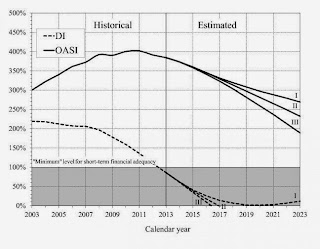
This graph shows three budgetary projections for disability and Old-Age and Survivors Insurance. Actuaries believe the disability program will run out of money sometime in late 2016. Source: Social Security Administration.

Combined, however, the Social Security insurance programs can remain solvent for two decades. Source: Social Security Administration.
On Tuesday, however, the House adopted a parliamentary rule that adds a procedural obstacle to reallocating the money.
If Republicans do decide that a transfer is necessary, they can change the rules again easily enough. Still, Rep. Sam Johnson (R-Tex.) said that a reallocation would be only a temporary solution that would avoid making real changes to "the fraud-plagued disability program."
"It will actually make the retirement program worse off, and it does nothing to fix the disability program," he said in a statement.
Fraud appears limited to relatively few cases in the disability program, although it is difficult to know precisely how many beneficiaries could be working. A report by the nonpartisan Government Accountability Office found that about 0.4 percent of disability beneficiaries were likely receiving improper payments, because they were working before or after they began receiving checks. Another report by Social Security's inspector general examined administrative law judges who were approving an unusually high proportion of disability applications and concluded that some of those approvals may have been mistaken. That group of beneficiaries also accounted for about 0.4 percent of all those receiving disability payments.
And while it's true that more and more people are on disability, this is largely a result of the fact that the workforce is getting older and more likely to be hurt or sick, according to Kathy Ruffing of the Center on Budget and Policy Priorities, a left-of-center think tank. About seven in ten disability recipients are at least 50 years old -- and that group is also expanding to include the women who entered the workforce at the beginning of their careers decades ago.
In any case, it's not clear whether fraud is more common in the disability program or in the retirement program. After all, it's common to read headlines about people accused of fraudulently collecting retirement benefits for a deceased parent, for example.
The effect of the rule appears to be to force Congress into a debate about Social Security next year instead of sometime before 2033. Without action from Congress, Social Security will be forced to cut disability payments to all recipients by about one fifth.
Johnson and his allies argued that a simple reallocation would irresponsibly and unfairly transfer money from future retirees to this year's disabled, but Ruffing countered that in fact it's the folks in the disability program who are owed a favor. She said that Congress created an imbalance created in 1983 by moving funds in the opposite direction -- out of the disability program and into the retirement program, which was approaching a shortfall.
"It's no surprise, and no crisis, unless somebody manufactures one," she said.
Max Ehrenfreund is a blogger on the Financial desk and writes for Know More and Wonkblog.
----------
January 13, 2015
Re: Where are Obama Democrats on Social Security?
When Wall Street collapsed and wrecked our economy in 2008, both political parties and Bush and Obama administrations borrowed trillions of dollars that was added to our national debt, which now stands at over $18 trillion, to bail out our nation’s big banks. Moreover, we spent billions of dollars bailing out foreign banks, such as UBS, which is headquartered in Switzerland. The trillions of dollars borrowed to bail out Wall Street was on top of trillions of dollars spent on our wars against Afghanistan and Iraq. Moreover, the Bush II administration cut taxes three times, which favored, you guessed it, Wall Street.
Next year, the fund for Social Security Disability is going to be insolvent. After many decades of the federal government spending our Social Security dollars on special interests that benefited Wall Street, Congress wants to cut Social Security benefits for the disabled (including me) by nearly 20 percent.
The public record clearly shows that the federal government works well for Wall Street, while the poor and middle class gets screwed.
Where is the top Democrat, U.S. President Barack Obama, on protecting Social Security benefits for the disabled? I am disappointed not only with Obama, but also, most members of U.S. Congress!
- Jonathan Melle
----------
"White House Weighs In On House GOP's New Social Security Ploy"
By Dylan Scott, Talking Points Memo, January 15, 2015
The White House has weighed in publicly for the first time on a House Republican move that could precipitate a fight over Social Security in the next two years.
The House voted last week to block a routine transfer of tax revenue between Social Security's retirement and disability funds; the latter is projected to start being unable to pay full benefits in late 2016, sparking a crisis that advocates warn the GOP could use as leverage to push changes to the program. The rule says a transfer, which had been done 11 times previously under Democratic and Republican administrations, can be done only if there are cost-saving measures attached to it.
In a statement to TPM, the White House said that it generally opposes measures that limit Congress's ability to transfer revenue between the Social Security funds, as the House rule does.
"Generally speaking, the Administration strongly opposes any efforts to undermine Congress’ ability to reallocate funds between the Social Security retirement and disability trust funds," a White House spokesperson told TPM, "as they have done with bipartisan support numerous times in the past in both directions."
As TPM previously reported, the White House's stance on the GOP's Social Security play has been the source of some consternation among the program's advocates. They are wary because President Obama has shown a willingness to entertain cuts to the program in some past budgets and during the 2011 debt-limit negotiations.
The White House spokesperson told TPM that with the disability program's crisis looming in 2016, Congress has "a duty to act this year to fix this problem."
"Doing so prevents a deep and abrupt cut in benefits for vulnerable people with disabilities, including many who are nearing retirement age and have paid into Social Security for many years," the spokesperson said.
----------
"Administration Plays With Disability Fund"
By Robert Feinberg, MoneyNews.com - February 17, 2015
On Feb. 19, an admittedly slow news day except for weathermen, Stephen Ohlemacher, a reporter for The Associated Press, appeared on C-SPAN's Washington Journal to discuss the move by the Obama administration to transfer $330 billion for the Social Security trust fund to cover a shortfall in the Social Security disability insurance program.
In this feature of the Your Money series, Ohlemacher was interviewed by C-SPAN's Pedro Echevarria, who began by asking Ohlemacher to explain the scope and role of the disability program.
Ohlemacher responded that whereas most people think of Social Security in terms of the retirement program and its 48 million recipients, there is also a disability insurance program, created in 1956, that has 11 million recipients. He characterized the requirements to qualify as "very strict," meaning that the applicant has to show an inability to work for an entire year anywhere in the economy, or a disability that results in death. The cost last year for the disability insurance program was $140 billion, compared with $672 billion for the retirement program.
The average recipient in the disability program gets approximately $1,000 per month. Spouses and surviving children of the disabled can also qualify for benefits. From time to time the Social Security Administration (SSA) is supposed to review the cases to make sure the recipient is actual disabled; if they recover and can go to work, they are supposed to go off the program.
Echevarria referred to a controversial charge by Sen. Rand Paul, R-Ky., that more than half the people on disability are either anxious or their back hurts, and who doesn't experience this from time to time? Ohlemacher responded that over time the number of recipients claiming benefits based on mental health issues has grown, as well as another category called "muscular/skeletal," which would include back pain and joint pain. SSA figures show the average age of recipients is 53, roughly evenly divided between men and women, and a third are for mental illness.
Asked whether there is fraud in the program, Ohlemacher cited a review by SSA's Inspector General released last November. He said that SSA receives 2.5 million applications per year, and the vast majority, roughly two-thirds, are declined. He explained that after people who have been declined twice they can appeal to an administrative law judge. (This writer would say that by this time they've probably called their congressman and the lawyer who advertises on late-night TV.)
The average time for resolution of appeals is longer than 400 days, but some judges have a reputation for being easy, and a House committee last year found there were 191 judges who approved more than 85 percent of applications, and the very size of the program makes it difficult to control fraud. Ohlemacher explained that funds have repeatedly been shifted from the retirement program to the disability program in order to forestall a cut in disability benefits. Unless this shift is made, the disability program could go broke in 2016, and benefits could be cut by 19 percent. This would also result in the retirement program going broke in 2033 instead of 2034, but history shows this would just be a temporary fix to a chronic problem with the design of Social Security that leads to steady tax increases and periodic crises.
----------
"New CBO Report Offers Yet Another Reason to Expand Social Security"
By Nancy Altman, Founding Co-director, Social Security Works, HuffingtonPost.com - June 19, 2015
Co-Authored By Eric Kingson
Will today's children inherit a nation with even greater income inequality than we have now? The Congressional Budget Office thinks so.
CBO just released its 2015 Long-Term Budget Outlook [www.cbo.gov/publication/50250], which includes projections about the future of Social Security. Conservative commentators are using the CBO report to undermine confidence in the program by pointing out [www.forbes.com/sites/andrewbiggs/2015/06/16/cbo-social-security-shortfall-quadrupled-since-2008/] that Social Security's shortfall -- modest in size and still many years away -- is projected by CBO to be larger than it estimated a few years ago.
But these projections include a shocking assumption: CBO is projecting increased income inequality in the future!
No question, rising income inequality hurts Social Security's financing. While most Americans pay Social Security contributions on all of their earnings, the wealthiest pay on only a portion of their income. The rich contribute a smaller and smaller portion of their income to Social Security, while all or most of the wage growth goes to them. The result is that Social Security's revenue is lower than what it would have been with a fairer distribution of income.
But this myopic focus on Social Security misses the larger picture. The important takeaway from the CBO report is the projection that without a change in policy, income and wealth inequality will only increase.
Virtually every politician today bemoans our rising income and wealth inequality. And for good reason. It is hollowing out the middle class, making higher education harder for most students to afford without incurring massive debt and giving a handful of individuals far too much influence over our government. If today's trends continue, this rising inequality could eventually lead to instability and civil unrest. As a matter of simple prudence, as well as morality, it should be reversed.
To effectively reverse this trend, it is imperative to recognize that this rising inequality didn't happen by accident. It is the direct result of government policy -- an upward redistribution of wealth -- that began several decades ago. These government policies enrich already wealthy individuals and corporations at the expense of everyday Americans.
Part of the story is the allocation of government spending and taxes. Massive increases in military spending directed to the building of planes, drones, ships and weapons systems reward highly paid top executives of large corporations. Drastic domestic spending cuts harm ordinary Americans and undermine the common good. The huge cuts in federal income and estate taxes overwhelmingly and disproportionately benefit those at the top.
Another source of upward redistribution has resulted from privatizing government functions [www.truth-out.org/news/item/22440-federal-privatization-and-the-expensive-philosop], which has eliminated good public sector jobs. The government often winds up paying more for inferior services. And corporations profit enormously by replacing middle class public sector jobs with ones without benefits or security.
Another way that income and wealth is redistributed upward is by the weakening of labor laws, so that workers lack the strength or the leverage to bargain effectively with their employers. And deregulation injures worker safety, the environment and, other protections benefiting all of us, while the resulting higher profits of corporations, freed from these social costs, enrich those at the top.
Still, another cause of the upward redistribution are the 1983 cuts to Social Security. Still being phased in, those cuts disproportionately reduce the benefits of low- and middle-income workers.
If we do not want CBO's projections to become a reality, we must reverse these policies and look for solutions to the damage that inequality has already caused. The last time that we had large and growing inequality was during the so-called Roaring Twenties, which ended with the Great Depression. As part of the response, we enacted Social Security. We should learn from the past. We should now expand Social Security.
Expanding Social Security is an obvious, efficient and powerful solution to the nation's looming retirement income crisis. It is a solution to the squeeze on middle class families. And, if its benefits are expanded and the wealthy required to pay their fair share, it can play an important role in establishing a fairer, more balanced distribution of the nation's income and wealth. Indeed, Social Security does more than perhaps any other institution, public or private, to offset lost wages, reduce income inequality and build a strong middle class. An expanded Social Security could do even more.
The question of whether Social Security should be expanded or cut is a question of values, not mathematics. Social Security's actuaries, who have been projecting Social Security's future since 1934, produce the legally mandated annual Social Security Trustees Report to Congress. The actuaries' projections are the gold standard -- not CBO, which has only been producing projections of Social Security's long range for just a little more than a decade and lacks the necessary actuarial expertise.¹
But under either the actuaries' or CBO's projections, one thing is crystal clear: We can afford the cost of expanding and fully paying for Social Security. What we cannot afford is our corrosive, perilous and growing income and wealth inequality.
An expanded Social Security will reduce that inequality. A diminished Social Security will increase it. The choice awaits us.
¹Demographic assumptions, like fertility rates and total population size, have the dominant impact on long-range Social Security projections. Actuaries, not economists, are the ones professionally trained in making these assumptions.
Follow Nancy Altman on Twitter: www.twitter.com/SSWorks
www.huffingtonpost.com/nancy-altman/new-cbo-report-offers-yet_b_7622398.html
----------
“No justification for stagnant Social Security”
The Berkshire Eagle, Letters, December 29, 2015
To the editor:
My husband and I recently received our Social Security notification for 2016 and as expected there was no increase in the base amount, due we've been told, to low gas prices. There was an increase however, in the cost for our Medicare drug plan, which leaves us not only with not more, but with $13.60 less per month each. In addition, our secondary health insurance is rising by approximately $10 per month.
Can someone please explain to me why those rising costs are not figured into our cost of living Social Security benefits? Congress, with so many benefits, it staggers the imagination.
Phyllis Weiss, Sheffield, Massachusetts
----------
“Bernie Sanders' Social Security Plan Gets A Huge Boost”
A New York Times editorial signals that a progressive cause is going mainstream.
By Daniel Marans, Reporter, The Huffington Post, January 5, 2016
Progressives are hailing a New York Times editorial endorsing the expansion of Social Security benefits as an influential blessing to a position that, until recently, was relegated largely to liberal think tanks and activists.
The editorial published over the weekend encouraged presidential candidates to address Social Security as part of a strategy to confront a growing retirement income crisis, rather than merely as a problem to be fixed.
Closing Social Security’s funding gap “can’t be done by broadly cutting benefits,” the paper’s editorial board said. “In fact, there’s mounting evidence that Social Security, which has become ever more important in retirement, needs to be expanded.”
The editorial from the paper of record marks a coup for progressive advocacy groups, economists and lawmakers, including Sens. Bernie Sanders (I-Vt.) and Elizabeth Warren (D-Mass.), who have steadily advanced the once-marginal pro-expansion stance into the mainstream.
“Hurray for the Times! I just wish The Washington Post were as enlightened,” said Nancy Altman, founding co-director of Social Security Works, a nonprofit that convenes a coalition of groups fighting for benefits expansion.
Dean Baker, the co-director of the Center for Economic and Policy Research and a critic of how the press sometimes covers the Social Security debate, underscored the Times’ role as an arbiter of mainstream liberal thought. The longtime proponent of expanding Social Security called the publication's editorial “hugely important.”
“They’re very much at the center of respectable opinion," he said. "If you’re taking a position that they have taken, you’re not considered a nut.”
And “nuts” is what many respectable Washington opinion leaders would have called the position even a few years ago. The Washington Post referred to groups opposed to benefit cuts -- ones that didn't even go so far as to suggest expanding Social Security -- as “Social Security denialists” in an August 2010 editorial.
In the deficit-wary, early days of the economic recovery, when the tea party was ascendant and President Barack Obama convened the Bowles-Simpson fiscal commission, the question among both Democrats and Republicans was largely not whether Social Security benefits should be cut, but by how much.
The Bowles-Simpson commission recommended dramatic changes to the popular social insurance program in December 2010, including increasing the retirement age to 69, means-testing benefits and cutting the program’s cost-of-living adjustment by adopting a “chained” Consumer Price Index.
Sen. Richard Durbin (D-Ill.), a leading Senate liberal and close ally of the president, sat on the commission, voted for its controversial recommendations and defended his vote in print.
Although the commission's proposals never were considered seriously by Congress wholesale, Obama offered Republican leaders the chained CPI as a compromise during fiscal cliff negotiations in December 2012.
The president subsequently included it in his fiscal year 2014 budget -- proof to many progressives that he actually believed in reducing benefits as a matter of policy.
At that time, Sanders spoke to progressives protesting outside the White House who had delivered over 2.5 million signatures against the move. The Times, for its part, also condemned the chained CPI, while implying it remained open to some other benefit cuts.
Along with the pressure from Obama’s base, the requisite Republican support for revenue increases to complete a “grand bargain” on the budget was once again not forthcoming. The administration shelved the provision the following year, which CNN called “music to liberals’ ears.”
Meanwhile, a counter-offensive was brewing. Social Security Works and its allied organizations began publicly promoting an idea they long had privately supported: that Social Security should be increased in order to combat a growing retirement income gap.
They were fond of citing many of the same figures the Times put forward in its weekend editorial.
“Currently, 36 percent of retirees rely on Social Security for 90 percent or more of their income; over all, 65 percent of retirees rely on it for more than half of their income,” the Times noted. “The average monthly benefit hovers around $1,300.”
And things are getting worse, as the Times observed and these advocates often point out. Most Americans have saved very little for retirement and access to employer-sponsored retirement plans is declining.
About a month before Obama included the chained CPI in his budget for fiscal year 2014, progressives found their first champion of expansion in Congress: Former Sen. Tom Harkin (D-Iowa) introduced a bill that would have expanded benefits across the board and paid for it by lifting the cap on earnings subject to Social Security taxes.
But the movement to expand benefits really gained traction when Warren gave it her rockstar imprimatur in a passionate speech on the Senate floor in November 2013. Warren’s speech was a “real gamechanger” because of her national following, said Altman, who is also a co-author of Social Security Works: Why Social Security Isn’t Going Broke and How Expanding It Will Help Us All.
Support for the position only picked up from there. All but two Senate Democrats present voted for a nonbinding budget amendment Warren introduced in April advocating the “sustainable expansion” of Social Security benefits.
Among the Democratic candidates, Sanders and former Maryland Gov. Martin O’Malley (D) have both embraced across-the-board expansion of the program. Former Secretary of State Hillary Clinton has said she would “enhance” benefits for the neediest beneficiaries, but has stopped short of the expansion language adopted by her rivals.
For Altman, the Times editorial is at once a sign that Social Security expansion is an idea whose time has come, and a "big step" that will further propel the policy into the mainstream.
“It is a recognition of what has been building all around,” she said.
But Altman said she will only be satisfied when Republicans begin backing expansion of benefits as well.
“The next step is for Republicans to jump on this bandwagon,” she concluded. “It has historically been a bipartisan program. That’s when it will really be front and center mainstream.”
----------
“Social Security in an Election Year”
The New York Time’s Sunday Review, The Editorial Board, January 2, 2016
This election season offers an opportunity to reframe the debate over Social Security. It is necessary, of course, to ensure the program’s long-term health beyond 2034, when the system is projected to come up short. But this can’t be done by broadly cutting benefits. In fact, there’s mounting evidence that Social Security, which has become ever more important in retirement, needs to be expanded.
Currently, 36 percent of retirees rely on Social Security for 90 percent or more of their income; over all, 65 percent of retirees rely on it for more than half of their income. The average monthly benefit hovers around $1,300. Retirement security won’t be any better for those now in their 50s. The Government Accountability Office recently found that 52 percent of American households with someone 55 or older have nothing saved for retirement and that only half of that 52 percent will get anything from a company pension. For those ages 55 to 64 with retirement savings, the median amount is barely in the six figures.
Younger workers are arguably worse off, because saving has become increasingly difficult, or impossible, in the face of stagnating wages, high debt, high rents and the lack of employer-provided retirement benefits. In 2013, 44 percent of workers on the lower half of the income scale had a retirement plan at work, down from 54 percent in 1995, according to data from the Federal Reserve.
Despite these facts, nearly all Republican candidates have called for cuts to Social Security benefits.
Jeb Bush, Chris Christie, Ted Cruz and Marco Rubio all favor cutting benefits by delaying the age for full benefits; the retirement age is already set to rise to 67 for people born in 1960 or later. They say a higher retirement age is needed to keep up with longer lives. But data show that life expectancy is growing faster among the wealthy than among the poor, and poor women are seeing life expectancy decline. So raising the retirement age across the board would hit lower-income workers the hardest.
Mr. Bush, Mr. Christie and Mr. Cruz have also endorsed reducing future cost-of-living adjustments in Social Security, even though there is no compelling evidence that the current adjustment is too high.
Mr. Bush and Mr. Cruz have said that Social Security payroll taxes should be diverted into new private accounts for employees, a reprise of President George W. Bush’s failed privatization attempt in 2005. Private accounts do not enhance retirement security. They divert money that would otherwise finance Social Security to Wall Street and shift the risk from government to individuals.
Donald Trump opposes benefit cuts, including a higher retirement age, but he has offered no meaningful ideas for reform.
The Democratic candidates have played defense and offense. They have opposed benefit cuts and privatization. They have proposed increasing the system’s revenues by raising the ceiling on the amount of wages, currently $118,500, that are subject to payroll taxes. That reform is overdue. If the wage ceiling had kept pace with the income gains of high earners over the decades, it would be about $250,000 today.
More important, they have stressed that an aim of reform is to bolster the system, not shrink it. Hillary Clinton would raise benefits for widows and for retirees who had long absences from the work force to care for relatives. Bernie Sanders and Martin O’Malley would increase benefits more broadly, especially for low-income recipients.
Ultimately, strengthening Social Security requires a growing and healthy economy. The Democratic candidates have credible ideas for creating jobs and raising wages that would revitalize the tax base for Social Security. Those and other sensible fixes, not deep and broad cutbacks, will ensure that the system continues to provide a basic level of guaranteed retirement income for all workers.
----------
April 9, 2016
Re: Boston Globe’s myopic coverage of public/private finance
This past week, the Boston Globe published a news article and an editorial about the Obama administration’s new regulations for financial retirement accounts that moves broker pay from commissions to fees based on the performance of the client’s investments.
I wondered why the Boston Globe doesn’t explain the crux of deferring one’s income into a retirement account. The central rational for investing is compounding interest, which is commonly understood by the “rule of 72”. Over the career and investment span of around 30 to 40 years, your deferred income is compounding in tax-free retirement accounts. The problem with investment products is that they carry fees that not only lower one’s annual growth yield, but also has the double whammy of costing the average consumer thousands of dollars over their decades of work.
The Obama administration believes that if brokers receive their payments in the form of fees instead of commissions, the brokers will earn more money with higher performing retirement accounts. The consumer will know more from fiduciary disclosures, including any incentives and bonuses their broker gets, such as a free family vacation to the Caribbean.
Critics of these regulatory reforms of the contributory retirement system say that the working class won’t receive first-rate financial advice anymore, there will not be enough of an incentive for a broker to work for a low to middle income investor, that a lot of working class contributory retirement accounts won’t fully fund their retirements anyway, and that the government wins while the private sector loses because more people will begin to invest in state government contributory retirement programs.
I also read a financial study that explained that the purposes of state lotteries and casino gambling are regressive taxation (as more working class consumers gamble instead of invest their money) and that the state lottery and local casino makes about $250,000 per gambling household over the span of a person’s decades long career(s). The state collects thousands of these dollars, while the social benefits goes to the rich, who, in turn, pay less in taxes.
Then there is Social Security, which is projected to go financially insolvent in 2 decades. Medicare is projected to go financially insolvent sooner than Social Security. The Obama administration’s only proposal to reform Social Security was to cut the annual cost of living adjustment, which is called the Chained CPI. This would have had the same impact as broker fees in retirement investment accounts, which would substantially lower the compounding payments over the time of a recipient’s monthly Social Security check.
In conclusion, neither the private sector, nor the government that regulates it, are good fiduciaries of working people’s money. The private sector is selling retirement products that are too expensive for working people. Moreover, the average retirement account won’t begin to cover most people’s costs in their retirements. What is more, the government is always expanding lottery and casino gambling, which is nothing more than regressive taxation that also costs the average working family about $250,000 per gambling household over a person’s working life. The worst news is that the Obama administration did not reform Social Security and Medicare, which are both projected to become insolvent over the next two decades. Lastly, Obama’s only proposal to reform Social Security was the Chained CPI, which has the same impact of broker fees that cut into compounding interest or Social Security beneficiary payments.
- Jonathan Melle
----------
April 28, 2016
Do you remember former U.S. Senator Joe Lieberman (I-CT) and former Utah Governor Jon Huntsman (R)? Well, they're coming out of retirement and coming after our earned Social Security benefits.
The two former elected officials have teamed up to create “No Labels” - a Wall Street funded think tank - which is full of regressive policy proposals. And they were recently seen lurking around Capitol Hill, shopping their ideas to lawmakers and lobbyists.
Tell Joe Lieberman and Jon Huntsman: Hands off Social Security!
Stand with Social Security Works in telling Joe Lieberman and Jon Huntsman where the American people stand. Tell them that in the midst of a $7.7 trillion retirement security crisis and with two-thirds of retirees relying on Social Security for the majority of their income, now is not the time to be cutting our hard earned benefits. Instead, we should be expanding Social Security benefits for millions of Americans.
The American people are united in our support of protecting and expanding Social Security - the most successful social insurance program in our country's history. And right now, a majority of Democrats in Congress support our efforts.
We cannot allow Lieberman and Huntsman to successfully flip Congressional Democrats - and worse yet, the next president - on the future of Social Security.
All we need in order to strengthen Social Security is to finally ask the wealthiest Americans to pay their fair share. Right now, individuals pay into Social Security on the first $118,500 of their income. But if wealthier individuals pay in on ALL of their income, we will be able to expand the benefits of millions of Americans and have enough left to extend the lifespan of the Social Security trust fund.
Please, stand with Social Security Works in telling Joe Lieberman and Jon Huntsman where the American people stand: Expand, don't cut Social Security.
Thank you for all that you do to strengthen the retirement security of millions of Americans.
Sincerely,
Alex Lawson
Social Security Works
----------
"How to adjust Social Security"
The Washington Post, Opinion: Letters, May 2, 2016
In his April 28 op-ed, “Entitlement reform, RIP,” Charles Lane suggested that using the “chained” consumer price index would be a more accurate inflation adjustment of Social Security benefits. The chained CPI adjusts inflation downward because people on fixed incomes can give up beef for chicken, then drop chicken for canned tuna. After years of such downsizing, what do we eat?
The Post reported in October that “people receiving Social Security benefits have seen their buying power fall by 22 percent since 2000.” The inflation adjustment for Social Security should not only not be “chained” downward. It should instead be ballooned upward to cover older people’s health-care costs, Medicare Part B premiums and housing costs, all of which have grown more than the Urban Wage Earners and Clerical Workers CPI on which the Social Security cost-of-living adjustment is based.
Abby Thomas, Silver Spring
related link: https://www.washingtonpost.com/news/get-there/wp/2015/10/15/the-retirement-costs-that-are-rising-faster-than-social-security-benefits/?tid=a_inl
"The retirement costs that are rising faster than Social Security benefits"
By Jonnelle Marte, The Washington Post, October 15, 2015
[2015] marks the third time in the last six years — the last two years were 2010 and 2011 — that benefits will stay flat for retirees.
Some costs that are counted heavily in the Consumer Price Index for Urban Wage Earners and Clerical Workers, such as gas and transportation expenses, don’t matter as much for retirees who are no longer commuting. Other expenses that are a major part of a retiree’s budget, such as Medicare premiums, aren’t counted at all in the index.
For example, Social Security benefits grew by 43 percent between 2000 and 2015, according to calculations from the Senior Citizens League. Over that same time period, Medicare Part B premiums have grown by 131 percent. Monthly housing costs rose 44 percent for people who own their home and even faster, 56 percent, for renters. The price of a gallon of heating oil used in boilers rose 159 percent and the price of electricity has increased by 63 percent. The cost of basic land line phone service has grown by 52 percent.
People receiving Social Security benefits have seen their buying power fall by 22 percent since 2000. Average Social Security benefits have grown to $1,166.30 a month in 2015 from $816 in 2000. But retirees would need a monthly benefit of $1,418 to have the same purchasing power they had when they first retired. source: Senior Citizens League.
----------
"Powerful New Coalition Aims To Advance Bold Wall Street Reform Agenda"
By NH Labor News, May 25, 2016
Labor organizations and community groups representing 25 million Americans unite behind tough agenda: closing Wall Street tax loopholes, making banks smaller and simpler, curbing predatory lending, and more

Senator Elizabeth Warren (image by Ninian Reid FLIKR)
U.S. Senator Elizabeth Warren (D-Mass.) today headlined an event in Washington, DC, where membership organizations, policy experts and elected leaders launched a new campaign for bold reforms to overhaul the country’s broken financial system. The Take on Wall Street coalition represents approximately 25 million Americans, including members of labor organizations like the AFL-CIO, AFT and CWA; grassroots community organizing networks like People’s Action and the Center for Popular Democracy; and others, including faith based organizations, MoveOn.org and the Working Families Party.
As the 2016 campaign season has demonstrated, Americans across the political spectrum remain angry and frustrated with Wall Street and the Big Banks, which they see as both drivers and beneficiaries of a rigged system. Wall Street billionaires continue to rake in outrageous profits through business practices that hurt working families—families that are still struggling to recover from the crisis Wall Street greed and recklessness precipitated eight years ago. Poll after poll demonstrates that most Americans strongly favor financial reform to support a fair economy.
The Take on Wall Street campaign will advance a set of ambitious policy goals for a more equitable and inclusive economy. The coalition members aim to convert the anger about Wall Street's growing political and economic dominance into concrete, bold and lasting legislative gains at the state, local, and federal levels.
“Hardworking men and women across the country want a fighting chance to build a real future for themselves and for their children,” Senator Elizabeth Warren said. “I’m glad to stand alongside the Take on Wall Street coalition to push for changes to make our financial markets safer and to create an economy that works for all our families. These are tough fights, but I know that if we get out there and stand together, we can win.”
At the launch event, Take on Wall Street unveiled a five-point agenda to rebalance the economy so it is no longer rigged against working Americans:
1. Close the carried interest loophole which permits private equity and hedge fund managers pay a lower tax rate than most working Americans.
2. Introduce a Wall Street speculation tax on sales of derivatives, stocks, bonds, and other financial products that would raise billions of dollars, bring banks closer to paying their fair of taxes, and stop some forms of destructive high-frequency trading outright.
3. Make banks simpler, smaller and safer. End ‘too big to fail,’ and reinstitute the Glass Stegall separation between commercial and investment banks.
4. Close the CEO bonus loophole, which permits corporations to pay less in taxes the more they pay their executives.
5. End Predatory Lending and expand access to fair safe financial services by supporting the Consumer Financial Protection Bureau, and expanding access to fair and equitable banking through Postal Banking.
"This is a rare moment in history to achieve fundamental change. This campaign is about rewriting the economic rules. The proposals at the heart of this campaign will drastically improve the way financial services function and mean more money in the pockets of working families, and hundreds of billions of dollars to boost our economy," said AFL-CIO President Richard Trumka.
“Finance has become the master of the economy, rather than a tool to serve it. And the outsized influence of the financial industry defends and extends rules that reward the already extremely wealthy but leave everyone else behind,” said Lisa Donner, Executive Director of Americans for Financial Reform, a broad-based coalition that was formed to work for financial reform and create the Consumer Financial Protection Bureau. “This campaign is about moving people into action to demand change that will unrig the game and build a financial system that works for working people.”
"Predatory lenders and tax-avoiding corporations work in concert to extract wealth from my community, leaving my customers, the lifeblood of my business, trapped in a perpetual cycle of debt and absorbing a larger share of our mutual tax responsibility. We must usher in a set of rules that reins in predatory lending, holds corporations accountable to pay their fair share in taxes, and returns the wealth of communities to the hands of local consumers," said David Borris, owner of Hel's Kitchen Catering in Chicago and member of the Main Street Alliance Executive Committee.
In coming weeks, the campaign will host a tele-town hall with leading champions of reform, and launch a wave of direct actions and media events to call attention to some of the worst Wall Street practices that call out for reform, with particular emphasis on closing the carried interest loophole, which campaign leaders describe as a particularly glaring example of the corrupting influence of Wall Street campaign and lobbying dollars.
Campaign partner organizations say that they will continue to press elected officials, regulators, and candidates at all levels of government throughout the summer and into the fall. The coalition will focus on naming the executives, legislators, and big banks and financial companies who continue to put our economy in jeopardy – while also shining a light on those champions who are taking action to make Wall Street accountable to working families.
Current partners in the campaign include:
* AFL-CIO
* Alliance of Californians for Community Empowerment (ACCE) Action
* American Family Voices
* American Federation of State County and Municipal Employees
* American Federation of Teachers
* American Postal Workers Union
* Americans Federation of Government Employees, AFL-CIO
* Americans for Financial Reform
* Campaign for America's Future
* Catholic Alliance for the Common Good
* Center for Popular Democracy
* Citizen Action NY
* Communications Workers of America
* Consumer Action
* Courage Campaign
* Daily Kos
* Democracy for America
* Economic Policy Institute
* Friends of the Earth
* HedgeClippers
* Institute for Policy Studies, Global Economy Project
* International Union, United Automobile, Aerospace, & Agricultural Implement Workers of America (UAW)
* The Leadership Conference on Civil and Human Rights
* Media Voices for Children
* MoveOn
* National Education Association
* NETWORK, A National Catholic Social Justice Lobby
* NYC Communities for Change
* The Other 98%
* People for the American Way
* People's Action Institute
* Presente
* Public Citizen
* Rootsaction
* Service Employees International Union
* Strong Economy for All Coalition
* The Nation
* The Rootstrikers at Demand Progress
* UNITE-HERE
* Working America
* Working Families Party
https://takeonwallst.com/
----------
May 27, 2016
Headlines:
Donald Trump is a Threat to Social Security and Medicare!
A person is known by the company he keeps, and among Donald Trump’s top advisors are two people who have long track records advocating for privatizing and/or cutting Social Security, Medicare, and Medicaid.
Sam Clovis, Trump’s senior policy advisor, recently said that a Trump administration would ‘look at” privatization of Medicare and Social Security after a year or two. And he isn’t the only Trump team member to advocate cutting off support for seniors. John Mashburn, Trump’s policy director, recently likened the disability program to a welfare program.
“Donald Trump has Social Security a ‘ponzi scheme’ but is hoping that voters will forget that when it comes time to vote,” said Joe Peters, Secretary-Treasurer of the Alliance. “He’s surrounding himself with people who have an anti-senior agenda. Retirees should be wary of someone who lacks a core commitment to retirement security and the sanctity of our earned benefits.”
Source: Alliance for Retired Americans | 815 16th Street, NW | Washington, DC 20006 | www.retiredamericans.org
----------
THE BLOG
"Social Security Monthly Checks To Increase By This Much In 2017"
By Diane Archer, Founder of JustCareUSA.org - via The Huffington Post - 10/24/2016
The Social Security Administration just announced Social Security’s COLA or cost-of-living adjustment for 2017, and it is tiny. Retirees will likely see just a $4.00 increase (.03 percent) in their checks beginning in January. A new report from the National Academy for Social Insurance explains how Social Security benefits are calculated.
The COLA is intended to guarantee people receiving Social Security checks the same purchasing power each year. It is supposed to account for price inflation. This inflation protection should ensure that Social Security benefits do not erode as older adults age. As we know, their savings, pensions and other income tends to decrease as they age. So, their dependence on Social Security increases.
Unfortunately, the Social Security COLA is not delivering adequate inflation protection to older adults. Here’s the reason: The Consumer Price Index measure, upon which the Social Security cost-of-living adjustment is based, the CPI-W, does not reflect the price inflation that older adults experience. Rather it is based on the price inflation experienced by the 28 percent of the population who are city workers and clerical workers.
In 1988, the Bureau of Labor Statistics created an experimental CPI index to cover spending of people 62 and older. It named it the CPI-E. But, Congress has chosen not to use this measure for Social Security cost-of-living adjustments. To be clear, it would presumably rise much faster than the CPI-W since older adults spend a lot more on health care than city and clerical workers, and health care costs are rising much faster than other costs.
Of note, the CPI-W assumes that when prices go up for a product or service, people will buy a different product or service that is similar. For example, if the price of white chicken meat goes up, it assumes people buy less costly dark chicken meat or pork instead. It’s not at all clear that older adults are able to make these substitutions with their health care services. If they cannot, this assumption baked into the Social Security COLA erodes their purchasing power.
What’s worse is that some members of Congress want to move to a “chained” CPI for Social Security benefit increases, a measure that assumes that, when prices rise, people make tradeoffs between dissimilar products and services. For example, if housing costs rise, they might spend less on food. While this may be true, proponents of the chained CPI fail to take into account that it would threaten people’s health and financial security. It would further reduce their Social Security checks. It reins in the rate of growth of the CPI by .3 percentage points. It’s called the chained CPI-U.
Social Security Works and others want to expand Social Security. They argue that we need a better CPI-E, with a bigger sample size that appropriately represents all older adults. This CPI-E would best reflect the cost of living for older adults. It would give more weight to health care cost increases. To support expanding Social Security benefits, click here. To learn when to claim Social Security benefits based on your situation, click here. And, to find out what your Social Security benefits will be when you retire, click here.
----------

In this May 5, 2014, file photo, the Capitol building is seen through the columns on the steps of the Supreme Court in Washington. Republicans in Washington have been clamoring for years to address the long-term financial problems of Social Security and Medicare. On July 13, the trustees who oversee the programs are scheduled to issue their annual warning about the finances of the federal government’s two largest benefit programs.
Social Security recipients received big news on Thursday about future payments. (Carolyn Kaster/AP Photo)
“Social Security Getting a Raise”
The trustees who oversee Social Security say the millions of people who rely on the program can expect to receive their biggest payment increase in years come January.
By Stephen Ohlemacher, Associated Press, July 14, 2017
WASHINGTON (AP) — Good news for seniors: Millions of Americans who rely on Social Security are projected to receive their biggest payment increase in years this January.
Bad news for seniors: It's just a 2.2 percent increase, or about $28 a month for the average recipient.
The trustees who oversee Social Security and Medicare released their 2018 projections Thursday, along with their annual warning about the long-term financial problems of the federal government's two bedrock retirement programs.
Social Security recipients have gone years with tiny increases in benefits because inflation has been low or non-existent. This year they received an increase of 0.3 percent, after getting nothing last year. The last time they got a bigger increase was in 2012, when the hike was 3.6 percent.
In recent years, many Social Security recipients have seen their cost-of-living adjustments erased by higher premiums for Medicare Part B. The trustees say that shouldn't be a problem next year. They project that Medicare Part B premiums will remain unchanged — $134 a month for most, though retirees with higher incomes pay more.
Both Social Security's cost-of-living adjustment and the Medicare Part B premium are to be announced in the fall.
More than 61 million retirees, disabled workers, spouses and surviving children receive Social Security benefits. The average monthly payment is $1,253. Medicare provides health insurance to about 58 million people, most of whom are at least 65 years old.
Unless Congress acts, the trust funds that support Social Security are estimated to run dry in 2034, the same year as last year's projection. Medicare's trust fund for inpatient care is projected to be depleted in 2029, a year later than last year's forecast.
If Congress allows either fund to be depleted, millions of Americans living on fixed incomes would face steep cuts in benefits.
Neither Social Security nor Medicare faces an immediate crisis — they both currently have surpluses. But the trustees warn that the longer Congress waits to address the programs' problems, the harder it will be to sustain Social Security and Medicare without steep cuts in benefits, big tax increases or both.
For example, in 2034, Social Security is projected to have a $546 billion shortfall, which would grow to more than $3 trillion in the first five years.
"Congress must act to ensure the long-term fiscal viability and sustainability and survival of Medicare and Social Security," said Health and Human Services Secretary Tom Price. "There are a great many ways that the situation can be addressed. The bottom line is that it must be addressed."
A big reason why Congress doesn't shore up Social Security and Medicare is that Democrats and Republicans don't agree on the urgency of the problem. Many Democrats and liberals focus on the fact that both programs are funded for years to come.
"Today's reports reveal the claim Medicare is bankrupt as simply a political excuse to cut seniors' benefits, and Social Security's near term outlook is stable," said Sen. Ron Wyden of Oregon, the top Democrat on the Senate Finance Committee.
Republicans, meanwhile, note that both programs face steep shortfalls as soon as their trust funds run out of money.
"With an aging population, our nation's most critical retirement programs — Medicare and Social Security — are feeling an increased financial squeeze that puts their future viability at serious risk," said Sen. Orrin Hatch, R-Utah, chairman of the Finance Committee.
The programs' long-term financial problems are in part because the U.S. is growing older.
In 1960, there were 5.1 workers for each person getting Social Security benefits. Today, there are about 2.8 workers for each beneficiary.
In addition to Price, the trustees who oversee Social Security and Medicare are Treasury Secretary Steven Mnuchin, Labor Secretary Alexander Acosta and acting Social Security Commissioner Nancy Berryhill.
----------
Democratic Reps. John Delaney (D-MD) and Scott Peters (D-CA) have teamed up with Republican Reps. Tom Cole (R-OK) and David Trott (R-MI) to cut our Social Security benefits.
They’re introducing H.R. 3423, the Social Security Commission Act of 2017 whose sole purpose is to justify cuts to Social Security. And they’re tying passage of this commission to a routine debt ceiling increase―effectively taking Social Security hostage.
To: All US Representatives
From: Jonathan Melle
Social Security is not a hostage or a bargaining chip. It’s a beloved program that supports millions of retirees, children, surviving spouses and people with disabilities. Tying Social Security to the routine debt ceiling increase―and fast tracking the commission’s recommendations―is unprecedented in the history of Social Security. We demand that you reject H.R. 3423, the Social Security Commission Act of 2017, and remove Social Security from the upcoming debt ceiling debate.
Source: Social Security Works, August 19, 2017
----------
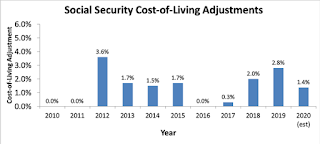
----------

Re: Social Security will soon slide into insolvency, unless Congress acts
“2020 will be a tipping point for Social Security”
The Boston Globe, July 21, 2019
Some time next year, as the ranks of retirees swell, the Social Security system in the United States will pass an ominous tipping point and start the slide into insolvency.
For the first time in nearly four decades, the government program that provides retirement checks to older Americans will pay out more in benefits in 2020 than it takes in. That will force the program to dip into a rainy day fund that will be depleted in about 15 years.
And if the political dysfunction in Washington continues and lawmakers don’t fix the system, benefit cuts are in store for current and future retirees, most of whom haven’t socked away enough money in their personal retirement accounts.
----------
July 28, 2019
Please support legislation for the expansion of Social Security, and the BOOST Act, to help reduce economic inequality that is hurting families in America. Thank you for your time.
Please note: the BOOST Act repeals the Trump-GOP tax giveaway and puts that money in the pockets of low- and middle-income families, as well as people who earn no income at all, such as students and caregivers.
I signed the petition today to tell the House of Representatives: Pass the BOOST Act to help more than 153 million adults and more than 64 million children.
- Jonathan Melle
----------
EDITORIAL: “Democrats pushing large increase in Social Security taxes”
By Victor Joecks, Las Vegas Review-Journal, August 2, 2019
Prominent Democrat presidential candidates, such as Sen. Kamala Harris, argue the country can afford “Medicare for All” without middle-class tax hikes. Anyone gullible enough to believe that should consider the party’s plan for Social Security.
Social Security is running out of money. The Social Security Administration’s projections show its trust fund will be empty by 2035, which would necessitate a 25 percent cut in benefits. Given the electoral uproar that would ensue, no one expects this to happen. But the longer Congress dithers, the more drastic — in tax hikes, benefit reductions or a combination of both — the solution will need to be.
Republicans have tried. In 2005, then-President George W. Bush’s ambitious Social Security reforms flamed out after Democrats demagogued the issue with senior voters. That cynical and unproductive pattern continued after the 2016 election, when a Republican congressman put forward a plan to reduce benefits for wealthier retirees and raise the retirement age. Rep. Richard Neal, D-Mass., said the proposal was evidence Republicans were putting Social Security on the “chopping block.”
President Donald Trump is a notable and unfortunate exception to these reform efforts.
Democrats love to criticize GOP proposals to save the nation’s financially foundering entitlement programs. It’s harder to come up with a solution. To their credit, though, House Democrats have put forward the Social Security 2100 Act. Nevada Reps. Dina Titus and Steven Horsford are among the bill’s 210 co-sponsors. The bill would increase benefits by around 3 percent and increase the program’s revenue stream.
How? By raising taxes on everyone — the rich, the middle class and low-wage workers.
The payroll tax is 12.4 percent. Employers and employees each pay half. This bill raises the rate by 0.1 percentage point a year, topping out at 14.8 percent in 2042.
An employee who makes $40,000 a year currently pays $2,480 a year toward Social Security. The employer matches that amount, bringing the yearly tax bill to almost $5,000. Under this bill, that total contribution would eventually increase to just under $6,000 a year, the equivalent of a $1,000 pay cut once the top tax rate goes into effect.
Turns out giant entitlement programs need ever-more tax revenue to keep up with their spending obligations. The Social Security payroll tax began at just 2 percent, with promises that it would never rise above 6 percent. Democrats now want to boost that rate to 14.8 percent — a move that will hit low-income workers the hardest. Tax policy no doubt must be a part of any effort to shore up Social Security. But a plan that focuses solely on higher taxes and fails to address the fundamental structural deficiencies of a program that relies on current workers to pay retiree benefits is nothing more than a Band-Aid.
It’s easy to predict that Medicare for All would require a massive middle-class tax hike. Just look at the Democratic plan to shore up Social Security.
----------
Social Security's COLA has averaged a disappointing 1.4% per year over the past 11 years (2009 – 2019). An analysis conducted by The Senior Citizens League shows a decline in retired workers' purchasing power of 18% over the past decade, and 33% since 2000.
Source: “The Coronavirus May Affect Social Security's COLA in 2021: Lower demand for certain goods and product scarcity could create a push-pull effect on Social Security's inflationary tether.” By Sean Williams (TMFUltraLong), The Motley Fool, February 22, 2020.
----------
Trump’s doomed proposed payroll tax cut would devastate Social Security and its many of its recipients!
The payroll tax is one of three sources of funding for the Social Security program, along with the taxation of benefits and the interest income earned in its nearly $2.9 trillion in asset reserves. Of the $1 trillion collected in 2018 by Social Security, the payroll tax was responsible for generating $885 billion. It's unquestionably the workhorse for our nation's most successful social program.
If Trump were granted his wish of a complete payroll tax holiday for the remainder of 2020, I'd estimate that Social Security's net-cash outflow for the year might hit $700 billion. For context, the worst single-net-cash outflow for Social Security over the past 80 years was $5.3 billion. In just nine months, the Social Security program would potentially have wiped away a quarter of its almost $2.9 trillion in asset reserves.
With 62% of current retirees leaning on Social Security for at least half of their income, and another 34% counting on the program for virtually all (90%+) of the income they receive, any sort of extended reduction to the payroll tax would seriously jeopardize the ability of these folks to make ends meet.
In actuality, the most recent Social Security Board of Trustees report forecast the need to increase the payroll tax by 2.78% immediately (i.e., to 15.18% from 12.4%) in order to stave off an expected $13.9 trillion cash shortfall between 2035 and 2093. What Trump is suggesting is the exact opposite of the recommendation offered by the Trustees report.
As long as the payroll tax remains the program's primary funding mechanism, Social Security is incapable of going bankrupt.
Source: “Trump's Coronavirus Plan Would Gut Social Security – President Trump's love affair with a payroll tax holiday or permanent payroll tax reduction continues.” By, Sean Williams, Motley Fool, April 17, 2020.
----------
PLEASE Sign this Petition!
“Stop calling for Payroll Tax Cuts and preserve Social Security and Medicare.”
Created by S.B. on May 08, 2020
The Senior Citizens League (TSCL) and its supporters know that a payroll tax cut would only lead to more calls to cut Social Security and Medicare because of the mounting federal debt. The Social Security Trust Fund is currently estimated to be depleted by 2034; a payroll tax cut will move that date up much sooner. Medicare Part A Hospital Insurance could become insolvent in six years. Medicare claims are on the rise due to the coronavirus, and Social Security claims increase during recessions. These funds are needed to pay those new enrollees who qualify, as well as current beneficiaries.
Needs 100,000 signatures by June 7, 2020 to get a response from the White House
https://petitions.whitehouse.gov/petition/stop-calling-payroll-tax-cuts-and-preserve-social-security-and-medicare
----------









































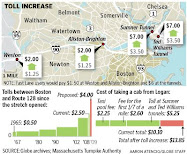







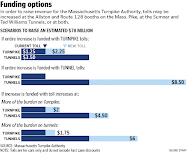





















































































.png)










































































































